A Systematic Review: Brexit's Impact on UK-EU Business Contracts
VerifiedAdded on 2023/01/24
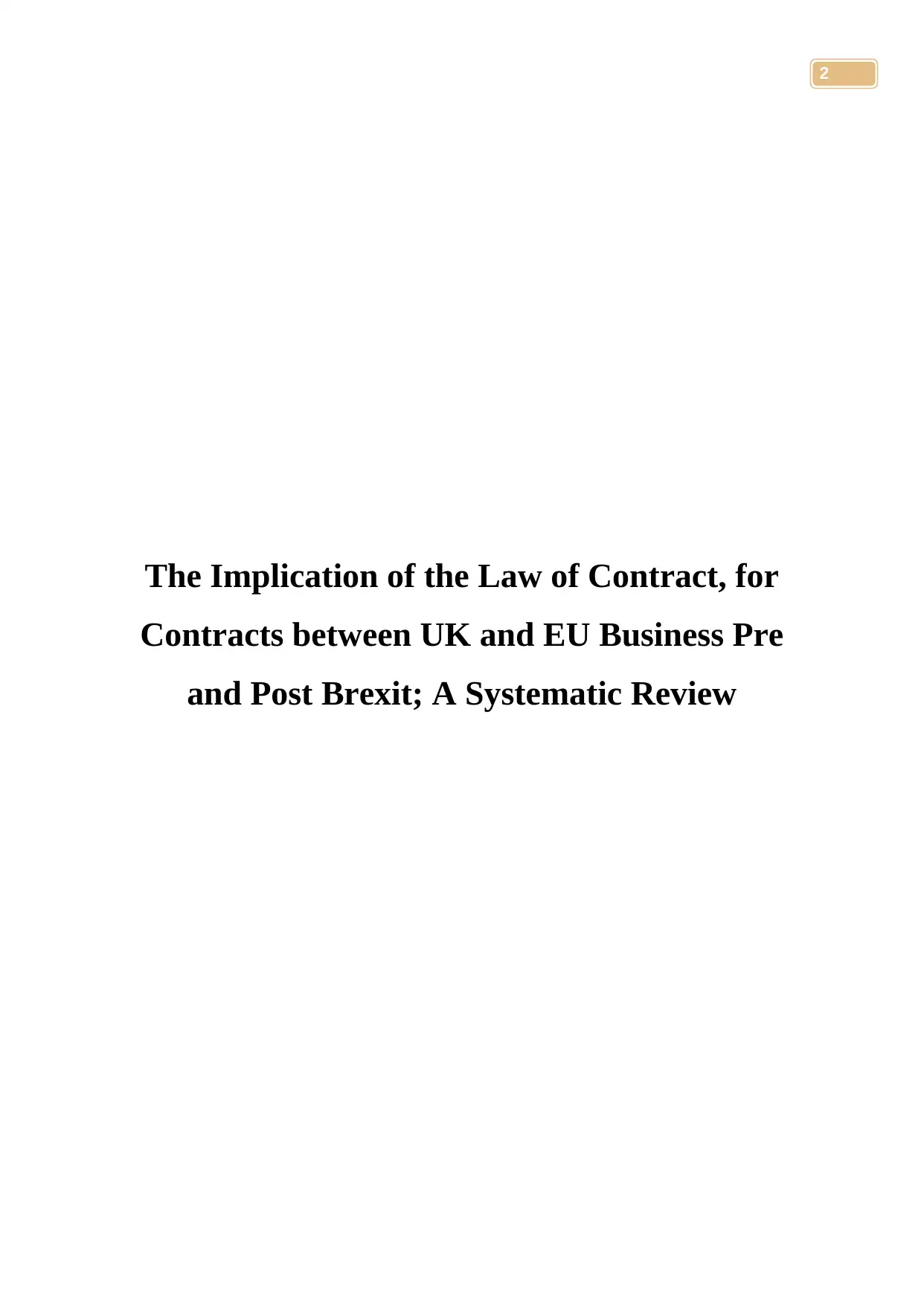
Contracts between UK and EU Business Pre
and Post Brexit; A Systematic Review
2
Paraphrase This Document
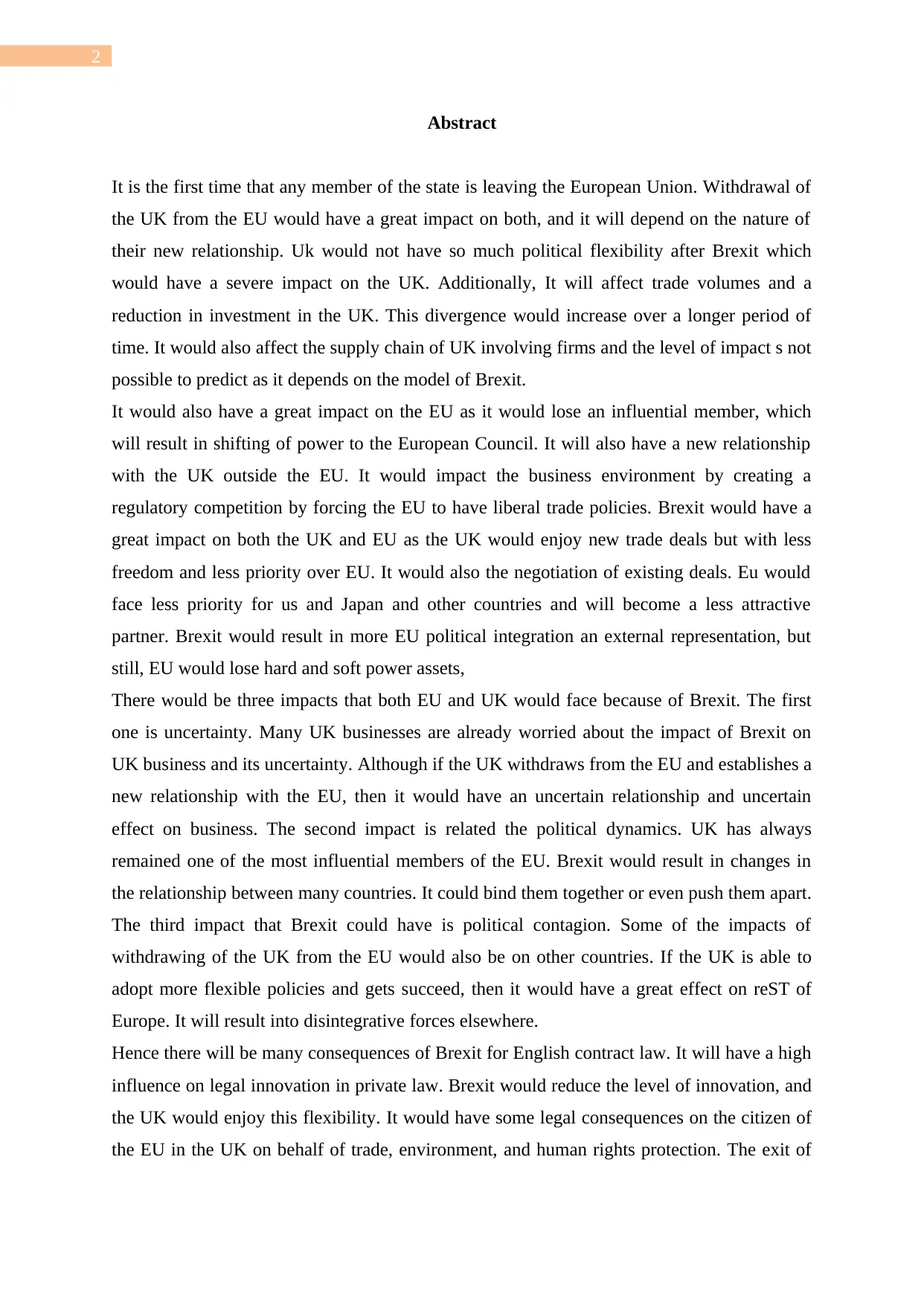
Abstract
It is the first time that any member of the state is leaving the European Union. Withdrawal of
the UK from the EU would have a great impact on both, and it will depend on the nature of
their new relationship. Uk would not have so much political flexibility after Brexit which
would have a severe impact on the UK. Additionally, It will affect trade volumes and a
reduction in investment in the UK. This divergence would increase over a longer period of
time. It would also affect the supply chain of UK involving firms and the level of impact s not
possible to predict as it depends on the model of Brexit.
It would also have a great impact on the EU as it would lose an influential member, which
will result in shifting of power to the European Council. It will also have a new relationship
with the UK outside the EU. It would impact the business environment by creating a
regulatory competition by forcing the EU to have liberal trade policies. Brexit would have a
great impact on both the UK and EU as the UK would enjoy new trade deals but with less
freedom and less priority over EU. It would also the negotiation of existing deals. Eu would
face less priority for us and Japan and other countries and will become a less attractive
partner. Brexit would result in more EU political integration an external representation, but
still, EU would lose hard and soft power assets,
There would be three impacts that both EU and UK would face because of Brexit. The first
one is uncertainty. Many UK businesses are already worried about the impact of Brexit on
UK business and its uncertainty. Although if the UK withdraws from the EU and establishes a
new relationship with the EU, then it would have an uncertain relationship and uncertain
effect on business. The second impact is related the political dynamics. UK has always
remained one of the most influential members of the EU. Brexit would result in changes in
the relationship between many countries. It could bind them together or even push them apart.
The third impact that Brexit could have is political contagion. Some of the impacts of
withdrawing of the UK from the EU would also be on other countries. If the UK is able to
adopt more flexible policies and gets succeed, then it would have a great effect on reST of
Europe. It will result into disintegrative forces elsewhere.
Hence there will be many consequences of Brexit for English contract law. It will have a high
influence on legal innovation in private law. Brexit would reduce the level of innovation, and
the UK would enjoy this flexibility. It would have some legal consequences on the citizen of
the EU in the UK on behalf of trade, environment, and human rights protection. The exit of

the UK from the EU would also affect the economic relationship of the country. Uk would
move away from cooperation and integration with the neighbouring countries, and hence it
would reduce economic growth of the country.
⊘ This is a preview!⊘
Do you want full access?
Subscribe today to unlock all pages.

Trusted by 1+ million students worldwide

Acknowledgement
This dissertation has been supported by my both Internal and External guides, who had been
there for me in my every difficulty area. Their guidance helped me in those areas where I
used to lack with information or seek guidance to cover up the entire dissertation.
Hence, I would like to express my gratitude towards ___________________without whose
support this dissertation report would not have been possible. Thanks for helping me out and
your persistent help made this dissertation report successful.
I would also like to thank my colleagues who have supported me throughout in completion of
this dissertation report.
Last but not the least; I would also like to thank my University for giving me such wonderful
opportunity to explore such valuable and important topic which made my experience more
enthusiastic and deep learning.
Thank you sincerely.
Paraphrase This Document
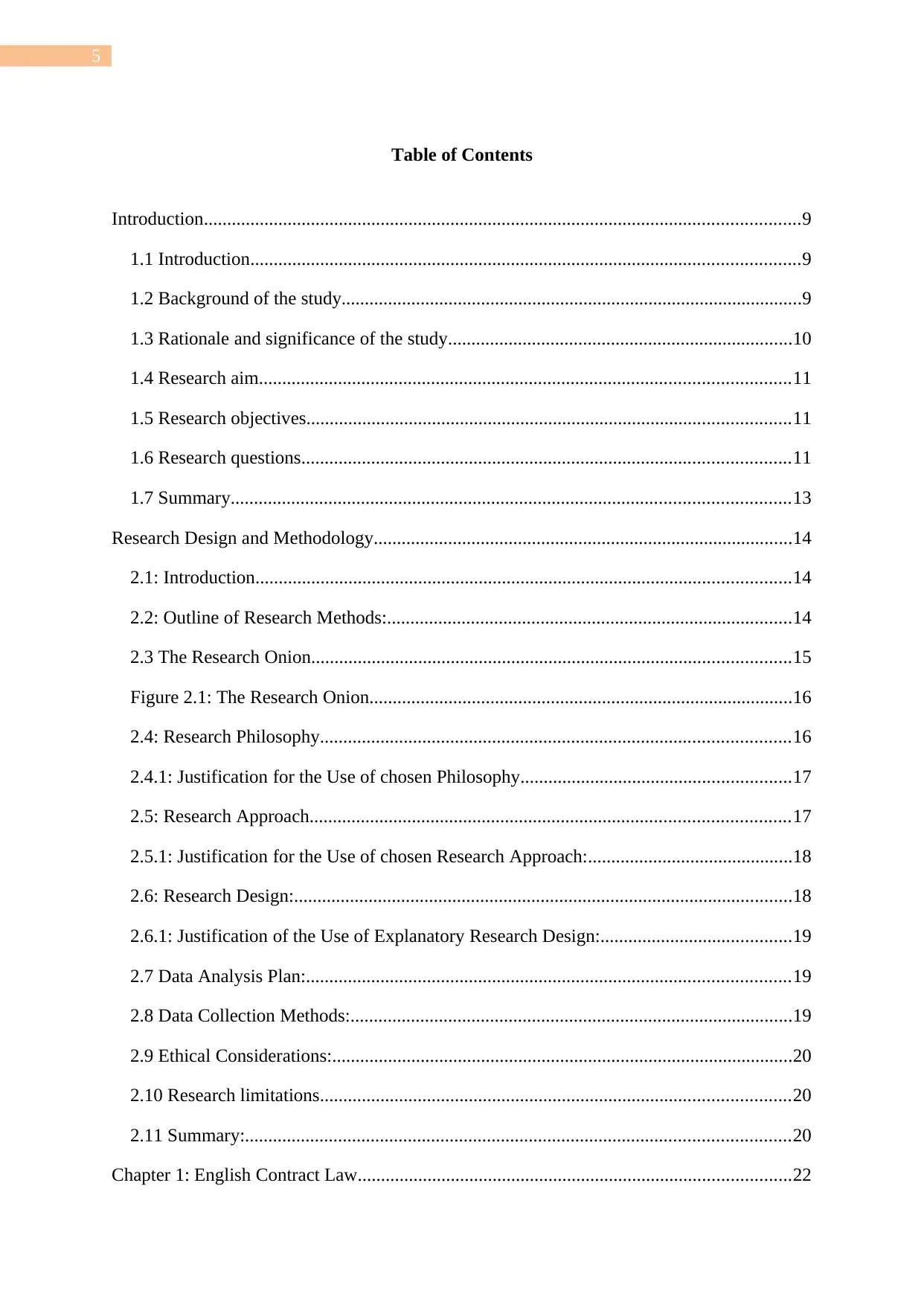
Table of Contents
Introduction................................................................................................................................9
1.1 Introduction......................................................................................................................9
1.2 Background of the study...................................................................................................9
1.3 Rationale and significance of the study..........................................................................10
1.4 Research aim..................................................................................................................11
1.5 Research objectives........................................................................................................11
1.6 Research questions.........................................................................................................11
1.7 Summary........................................................................................................................13
Research Design and Methodology..........................................................................................14
2.1: Introduction...................................................................................................................14
2.2: Outline of Research Methods:.......................................................................................14
2.3 The Research Onion.......................................................................................................15
Figure 2.1: The Research Onion...........................................................................................16
2.4: Research Philosophy.....................................................................................................16
2.4.1: Justification for the Use of chosen Philosophy..........................................................17
2.5: Research Approach.......................................................................................................17
2.5.1: Justification for the Use of chosen Research Approach:............................................18
2.6: Research Design:...........................................................................................................18
2.6.1: Justification of the Use of Explanatory Research Design:.........................................19
2.7 Data Analysis Plan:........................................................................................................19
2.8 Data Collection Methods:...............................................................................................19
2.9 Ethical Considerations:...................................................................................................20
2.10 Research limitations.....................................................................................................20
2.11 Summary:.....................................................................................................................20
Chapter 1: English Contract Law.............................................................................................22
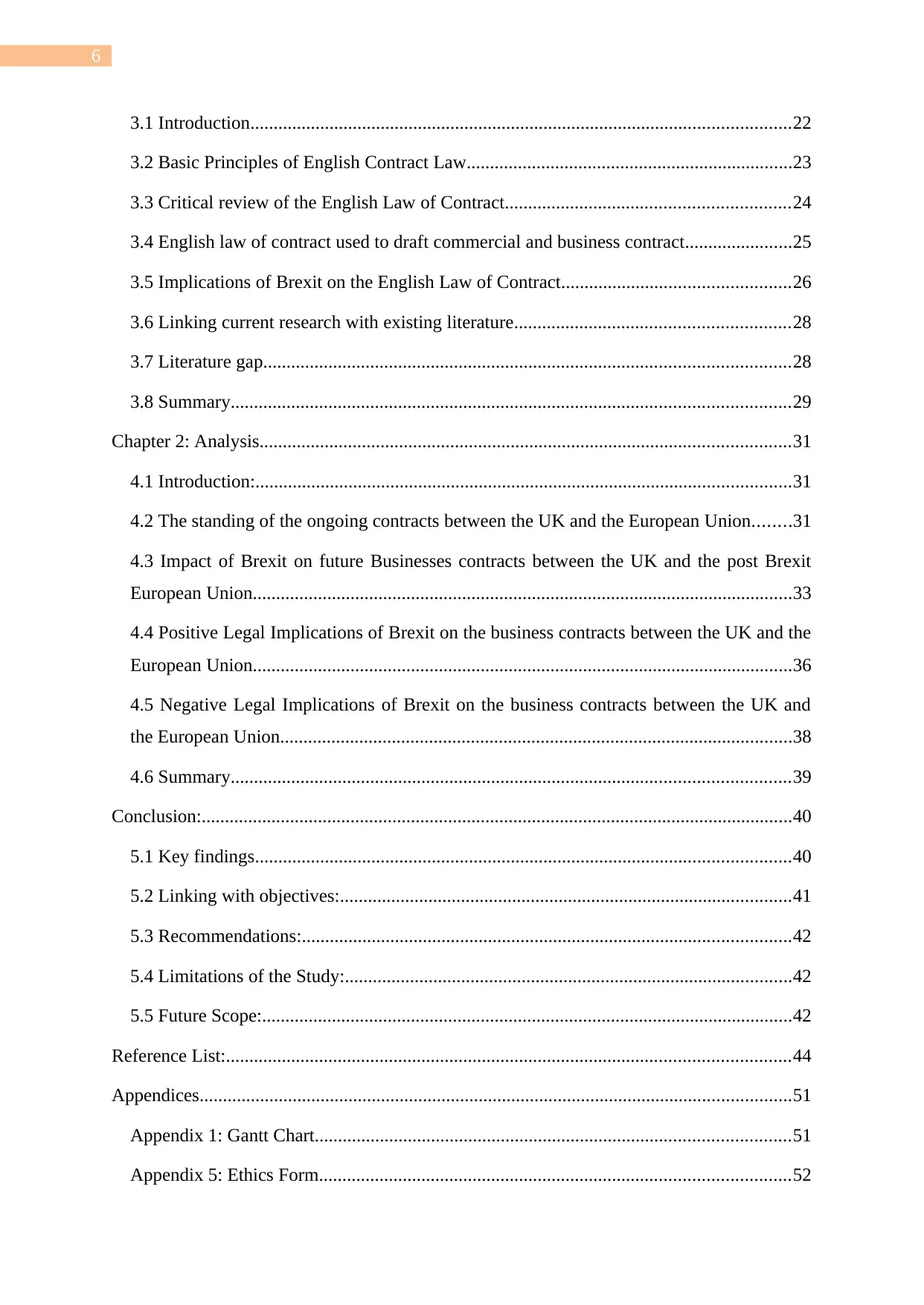
3.1 Introduction....................................................................................................................22
3.2 Basic Principles of English Contract Law......................................................................23
3.3 Critical review of the English Law of Contract.............................................................24
3.4 English law of contract used to draft commercial and business contract.......................25
3.5 Implications of Brexit on the English Law of Contract.................................................26
3.6 Linking current research with existing literature...........................................................28
3.7 Literature gap.................................................................................................................28
3.8 Summary........................................................................................................................29
Chapter 2: Analysis..................................................................................................................31
4.1 Introduction:...................................................................................................................31
4.2 The standing of the ongoing contracts between the UK and the European Union........31
4.3 Impact of Brexit on future Businesses contracts between the UK and the post Brexit
European Union....................................................................................................................33
4.4 Positive Legal Implications of Brexit on the business contracts between the UK and the
European Union....................................................................................................................36
4.5 Negative Legal Implications of Brexit on the business contracts between the UK and
the European Union..............................................................................................................38
4.6 Summary........................................................................................................................39
Conclusion:...............................................................................................................................40
5.1 Key findings...................................................................................................................40
5.2 Linking with objectives:.................................................................................................41
5.3 Recommendations:.........................................................................................................42
5.4 Limitations of the Study:................................................................................................42
5.5 Future Scope:..................................................................................................................42
Reference List:.........................................................................................................................44
Appendices...............................................................................................................................51
Appendix 1: Gantt Chart......................................................................................................51
Appendix 5: Ethics Form.....................................................................................................52
⊘ This is a preview!⊘
Do you want full access?
Subscribe today to unlock all pages.

Trusted by 1+ million students worldwide
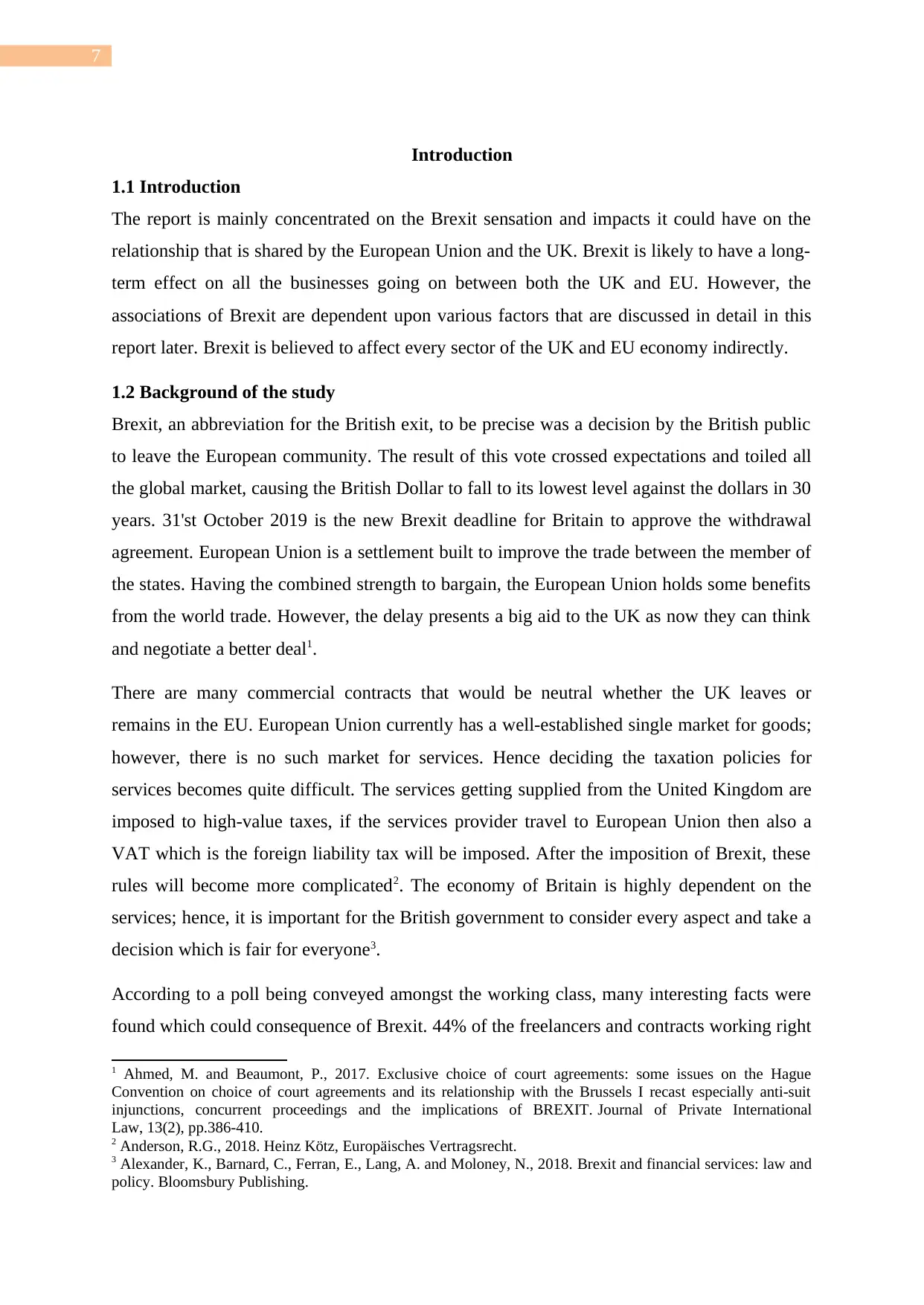
Introduction
1.1 Introduction
The report is mainly concentrated on the Brexit sensation and impacts it could have on the
relationship that is shared by the European Union and the UK. Brexit is likely to have a long-
term effect on all the businesses going on between both the UK and EU. However, the
associations of Brexit are dependent upon various factors that are discussed in detail in this
report later. Brexit is believed to affect every sector of the UK and EU economy indirectly.
1.2 Background of the study
Brexit, an abbreviation for the British exit, to be precise was a decision by the British public
to leave the European community. The result of this vote crossed expectations and toiled all
the global market, causing the British Dollar to fall to its lowest level against the dollars in 30
years. 31'st October 2019 is the new Brexit deadline for Britain to approve the withdrawal
agreement. European Union is a settlement built to improve the trade between the member of
the states. Having the combined strength to bargain, the European Union holds some benefits
from the world trade. However, the delay presents a big aid to the UK as now they can think
and negotiate a better deal1.
There are many commercial contracts that would be neutral whether the UK leaves or
remains in the EU. European Union currently has a well-established single market for goods;
however, there is no such market for services. Hence deciding the taxation policies for
services becomes quite difficult. The services getting supplied from the United Kingdom are
imposed to high-value taxes, if the services provider travel to European Union then also a
VAT which is the foreign liability tax will be imposed. After the imposition of Brexit, these
rules will become more complicated2. The economy of Britain is highly dependent on the
services; hence, it is important for the British government to consider every aspect and take a
decision which is fair for everyone3.
According to a poll being conveyed amongst the working class, many interesting facts were
found which could consequence of Brexit. 44% of the freelancers and contracts working right
1 Ahmed, M. and Beaumont, P., 2017. Exclusive choice of court agreements: some issues on the Hague
Convention on choice of court agreements and its relationship with the Brussels I recast especially anti-suit
injunctions, concurrent proceedings and the implications of BREXIT. Journal of Private International
Law, 13(2), pp.386-410.
2 Anderson, R.G., 2018. Heinz Kötz, Europäisches Vertragsrecht.
3 Alexander, K., Barnard, C., Ferran, E., Lang, A. and Moloney, N., 2018. Brexit and financial services: law and
policy. Bloomsbury Publishing.
Paraphrase This Document
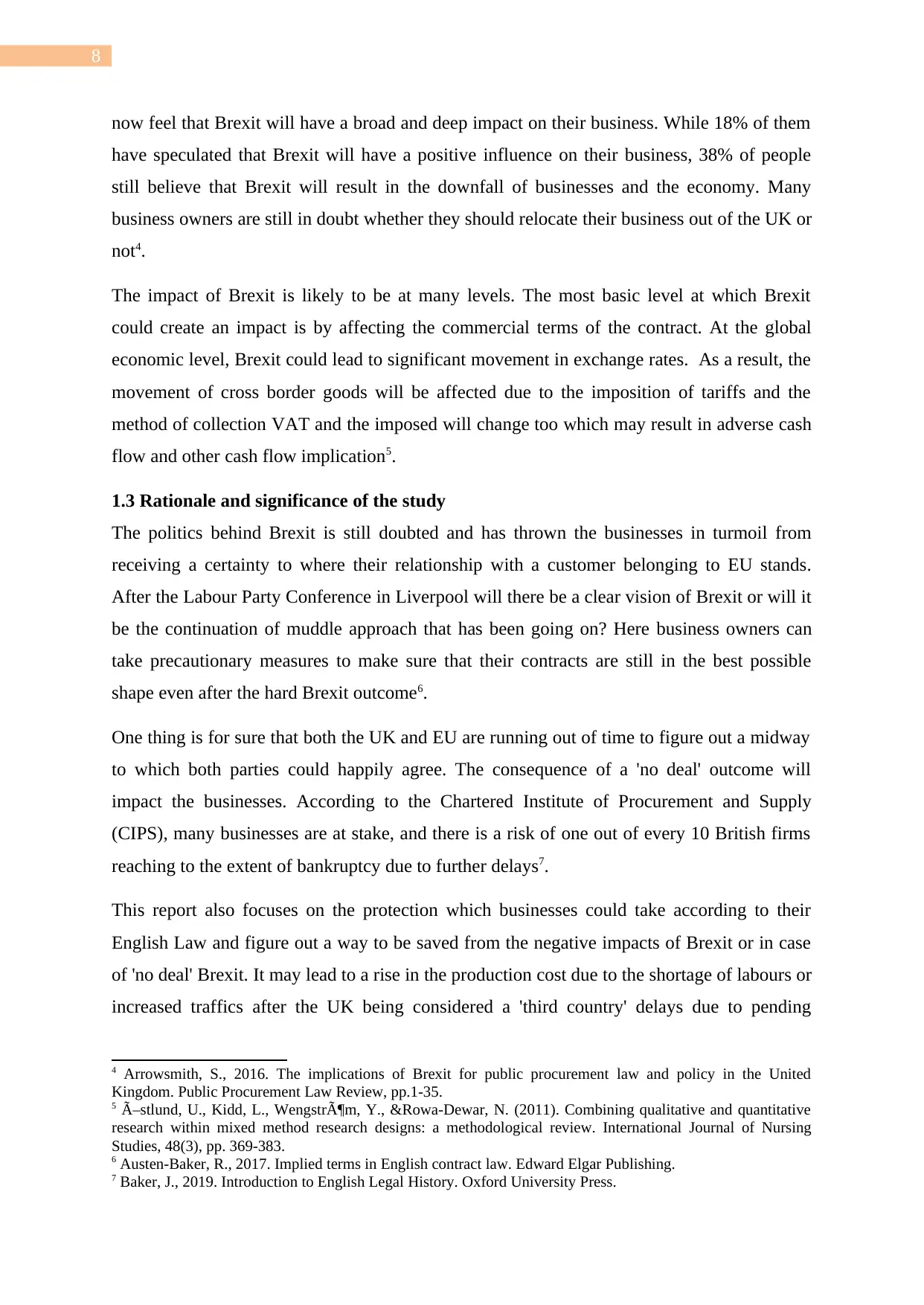
now feel that Brexit will have a broad and deep impact on their business. While 18% of them
have speculated that Brexit will have a positive influence on their business, 38% of people
still believe that Brexit will result in the downfall of businesses and the economy. Many
business owners are still in doubt whether they should relocate their business out of the UK or
not4.
The impact of Brexit is likely to be at many levels. The most basic level at which Brexit
could create an impact is by affecting the commercial terms of the contract. At the global
economic level, Brexit could lead to significant movement in exchange rates. As a result, the
movement of cross border goods will be affected due to the imposition of tariffs and the
method of collection VAT and the imposed will change too which may result in adverse cash
flow and other cash flow implication5.
1.3 Rationale and significance of the study
The politics behind Brexit is still doubted and has thrown the businesses in turmoil from
receiving a certainty to where their relationship with a customer belonging to EU stands.
After the Labour Party Conference in Liverpool will there be a clear vision of Brexit or will it
be the continuation of muddle approach that has been going on? Here business owners can
take precautionary measures to make sure that their contracts are still in the best possible
shape even after the hard Brexit outcome6.
One thing is for sure that both the UK and EU are running out of time to figure out a midway
to which both parties could happily agree. The consequence of a 'no deal' outcome will
impact the businesses. According to the Chartered Institute of Procurement and Supply
(CIPS), many businesses are at stake, and there is a risk of one out of every 10 British firms
reaching to the extent of bankruptcy due to further delays7.
This report also focuses on the protection which businesses could take according to their
English Law and figure out a way to be saved from the negative impacts of Brexit or in case
of 'no deal' Brexit. It may lead to a rise in the production cost due to the shortage of labours or
increased traffics after the UK being considered a 'third country' delays due to pending
4 Arrowsmith, S., 2016. The implications of Brexit for public procurement law and policy in the United
Kingdom. Public Procurement Law Review, pp.1-35.
5 Östlund, U., Kidd, L., Wengström, Y., &Rowa-Dewar, N. (2011). Combining qualitative and quantitative
research within mixed method research designs: a methodological review. International Journal of Nursing
Studies, 48(3), pp. 369-383.
6 Austen-Baker, R., 2017. Implied terms in English contract law. Edward Elgar Publishing.
7 Baker, J., 2019. Introduction to English Legal History. Oxford University Press.
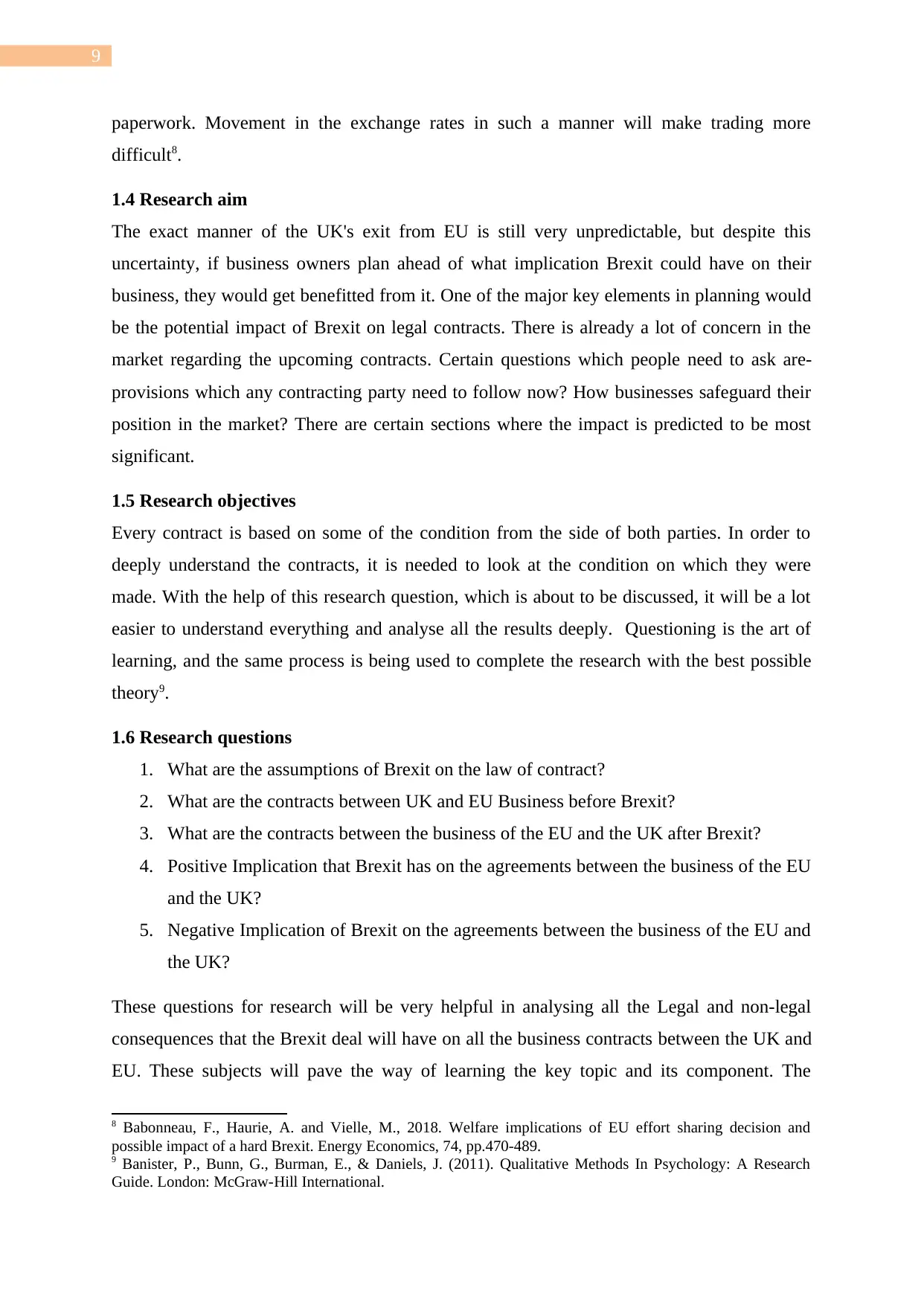
paperwork. Movement in the exchange rates in such a manner will make trading more
difficult8.
1.4 Research aim
The exact manner of the UK's exit from EU is still very unpredictable, but despite this
uncertainty, if business owners plan ahead of what implication Brexit could have on their
business, they would get benefitted from it. One of the major key elements in planning would
be the potential impact of Brexit on legal contracts. There is already a lot of concern in the
market regarding the upcoming contracts. Certain questions which people need to ask are-
provisions which any contracting party need to follow now? How businesses safeguard their
position in the market? There are certain sections where the impact is predicted to be most
significant.
1.5 Research objectives
Every contract is based on some of the condition from the side of both parties. In order to
deeply understand the contracts, it is needed to look at the condition on which they were
made. With the help of this research question, which is about to be discussed, it will be a lot
easier to understand everything and analyse all the results deeply. Questioning is the art of
learning, and the same process is being used to complete the research with the best possible
theory9.
1.6 Research questions
1. What are the assumptions of Brexit on the law of contract?
2. What are the contracts between UK and EU Business before Brexit?
3. What are the contracts between the business of the EU and the UK after Brexit?
4. Positive Implication that Brexit has on the agreements between the business of the EU
and the UK?
5. Negative Implication of Brexit on the agreements between the business of the EU and
the UK?
These questions for research will be very helpful in analysing all the Legal and non-legal
consequences that the Brexit deal will have on all the business contracts between the UK and
EU. These subjects will pave the way of learning the key topic and its component. The
8 Babonneau, F., Haurie, A. and Vielle, M., 2018. Welfare implications of EU effort sharing decision and
possible impact of a hard Brexit. Energy Economics, 74, pp.470-489.
9 Banister, P., Bunn, G., Burman, E., & Daniels, J. (2011). Qualitative Methods In Psychology: A Research
Guide. London: McGraw-Hill International.
⊘ This is a preview!⊘
Do you want full access?
Subscribe today to unlock all pages.

Trusted by 1+ million students worldwide
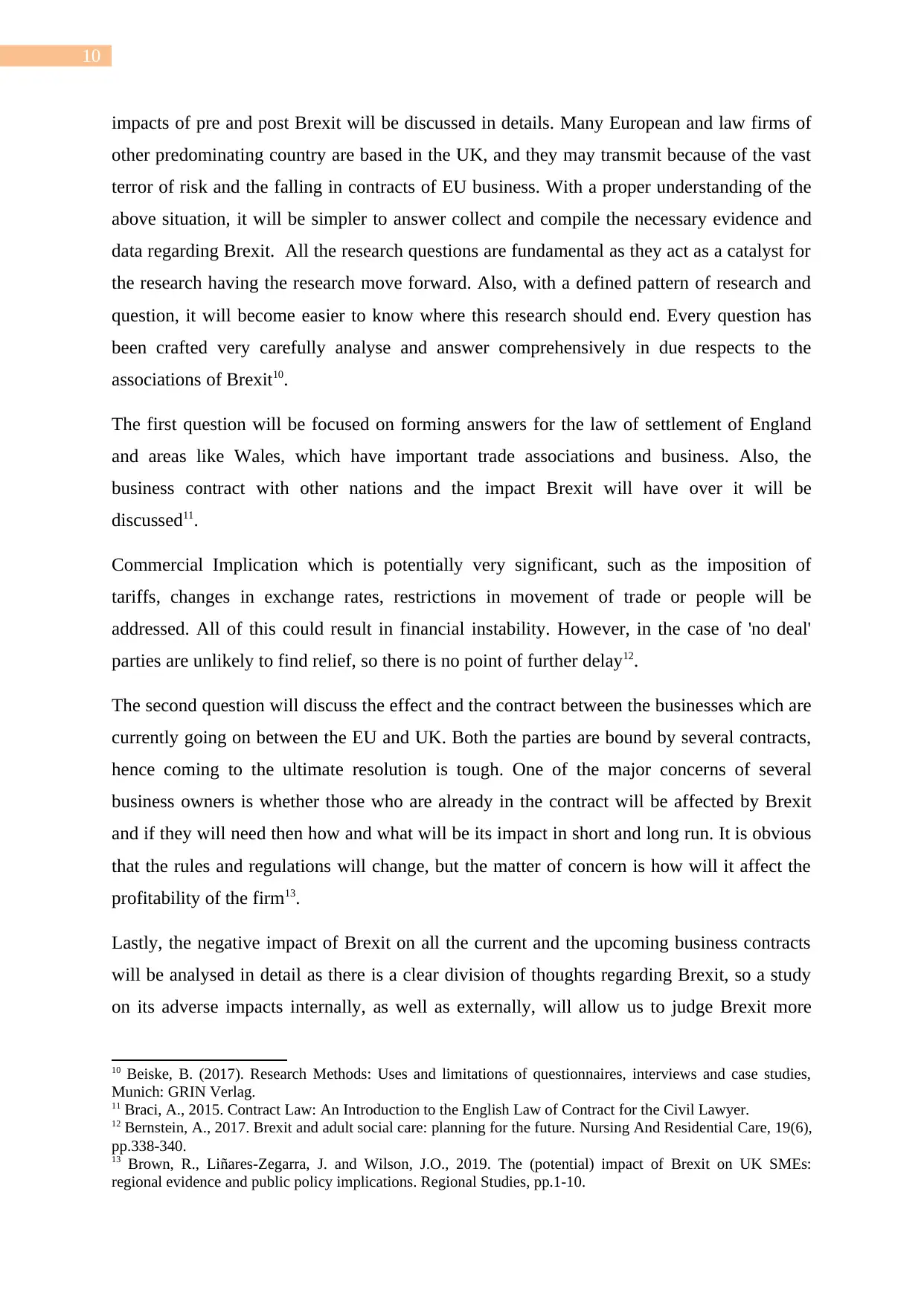
impacts of pre and post Brexit will be discussed in details. Many European and law firms of
other predominating country are based in the UK, and they may transmit because of the vast
terror of risk and the falling in contracts of EU business. With a proper understanding of the
above situation, it will be simpler to answer collect and compile the necessary evidence and
data regarding Brexit. All the research questions are fundamental as they act as a catalyst for
the research having the research move forward. Also, with a defined pattern of research and
question, it will become easier to know where this research should end. Every question has
been crafted very carefully analyse and answer comprehensively in due respects to the
associations of Brexit10.
The first question will be focused on forming answers for the law of settlement of England
and areas like Wales, which have important trade associations and business. Also, the
business contract with other nations and the impact Brexit will have over it will be
discussed11.
Commercial Implication which is potentially very significant, such as the imposition of
tariffs, changes in exchange rates, restrictions in movement of trade or people will be
addressed. All of this could result in financial instability. However, in the case of 'no deal'
parties are unlikely to find relief, so there is no point of further delay12.
The second question will discuss the effect and the contract between the businesses which are
currently going on between the EU and UK. Both the parties are bound by several contracts,
hence coming to the ultimate resolution is tough. One of the major concerns of several
business owners is whether those who are already in the contract will be affected by Brexit
and if they will need then how and what will be its impact in short and long run. It is obvious
that the rules and regulations will change, but the matter of concern is how will it affect the
profitability of the firm13.
Lastly, the negative impact of Brexit on all the current and the upcoming business contracts
will be analysed in detail as there is a clear division of thoughts regarding Brexit, so a study
on its adverse impacts internally, as well as externally, will allow us to judge Brexit more
10 Beiske, B. (2017). Research Methods: Uses and limitations of questionnaires, interviews and case studies,
Munich: GRIN Verlag.
11 Braci, A., 2015. Contract Law: An Introduction to the English Law of Contract for the Civil Lawyer.
12 Bernstein, A., 2017. Brexit and adult social care: planning for the future. Nursing And Residential Care, 19(6),
pp.338-340.
13 Brown, R., Liñares-Zegarra, J. and Wilson, J.O., 2019. The (potential) impact of Brexit on UK SMEs:
regional evidence and public policy implications. Regional Studies, pp.1-10.
Paraphrase This Document

clearly. Since Brexit is a very tiresome process that is yet to be executed, it is a hurdle in
itself to predict and analyses its implication14.
1.7 Summary
Once these questions are answered, there will be a new and clearer vision of Brexit. By
understanding these answers to the complex relationship between the business of the EU and
the UK, it would be easier to know the complexity of the situation.
14 Bruwer, E., 2018. Settlor control and trustee liability: an analysis of English and offshore trust law with
indicators for the development of South African trust law.
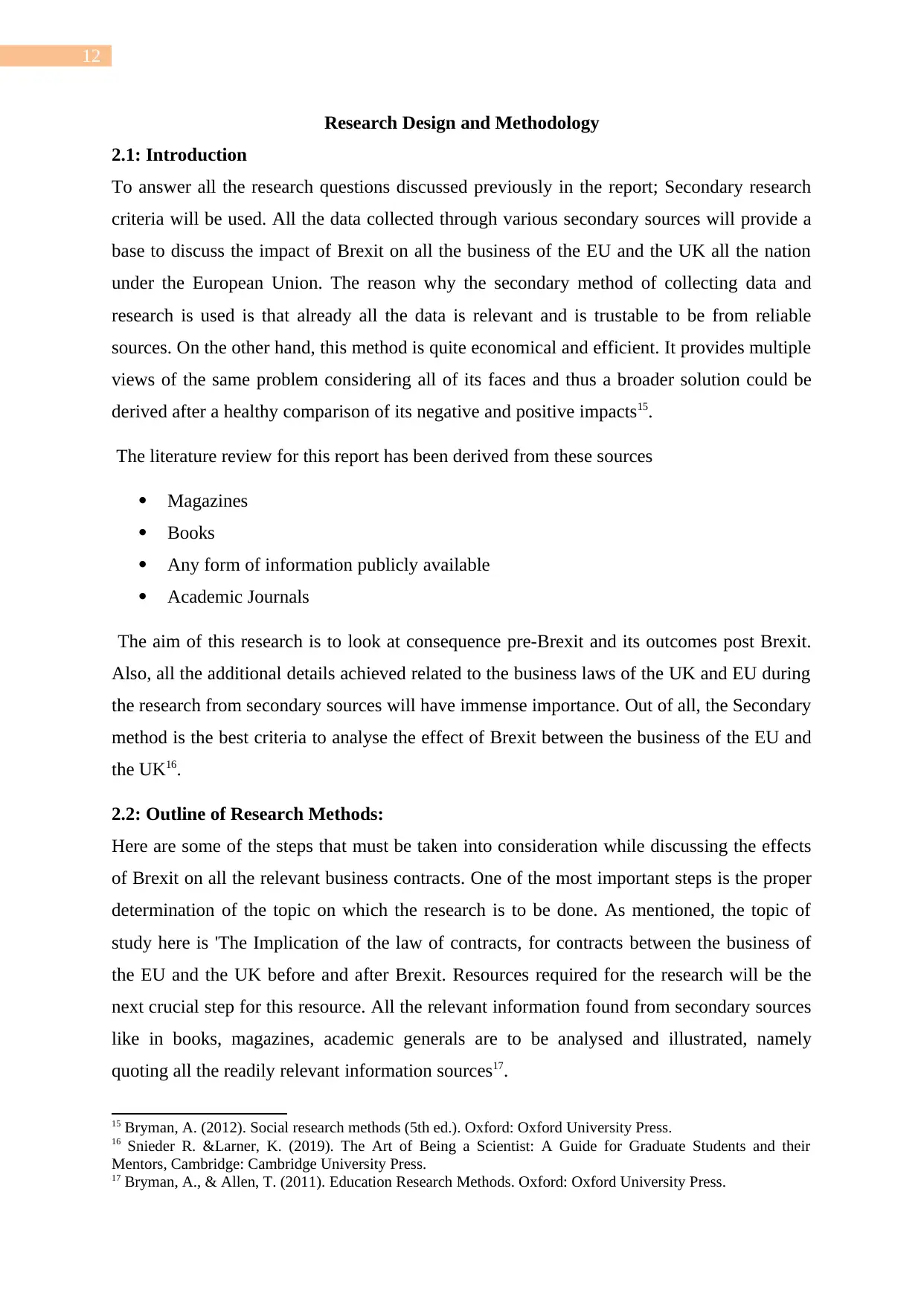
Research Design and Methodology
2.1: Introduction
To answer all the research questions discussed previously in the report; Secondary research
criteria will be used. All the data collected through various secondary sources will provide a
base to discuss the impact of Brexit on all the business of the EU and the UK all the nation
under the European Union. The reason why the secondary method of collecting data and
research is used is that already all the data is relevant and is trustable to be from reliable
sources. On the other hand, this method is quite economical and efficient. It provides multiple
views of the same problem considering all of its faces and thus a broader solution could be
derived after a healthy comparison of its negative and positive impacts15.
The literature review for this report has been derived from these sources
Magazines
Books
Any form of information publicly available
Academic Journals
The aim of this research is to look at consequence pre-Brexit and its outcomes post Brexit.
Also, all the additional details achieved related to the business laws of the UK and EU during
the research from secondary sources will have immense importance. Out of all, the Secondary
method is the best criteria to analyse the effect of Brexit between the business of the EU and
the UK16.
2.2: Outline of Research Methods:
Here are some of the steps that must be taken into consideration while discussing the effects
of Brexit on all the relevant business contracts. One of the most important steps is the proper
determination of the topic on which the research is to be done. As mentioned, the topic of
study here is 'The Implication of the law of contracts, for contracts between the business of
the EU and the UK before and after Brexit. Resources required for the research will be the
next crucial step for this resource. All the relevant information found from secondary sources
like in books, magazines, academic generals are to be analysed and illustrated, namely
quoting all the readily relevant information sources17.
15 Bryman, A. (2012). Social research methods (5th ed.). Oxford: Oxford University Press.
16 Snieder R. &Larner, K. (2019). The Art of Being a Scientist: A Guide for Graduate Students and their
Mentors, Cambridge: Cambridge University Press.
17 Bryman, A., & Allen, T. (2011). Education Research Methods. Oxford: Oxford University Press.
⊘ This is a preview!⊘
Do you want full access?
Subscribe today to unlock all pages.

Trusted by 1+ million students worldwide
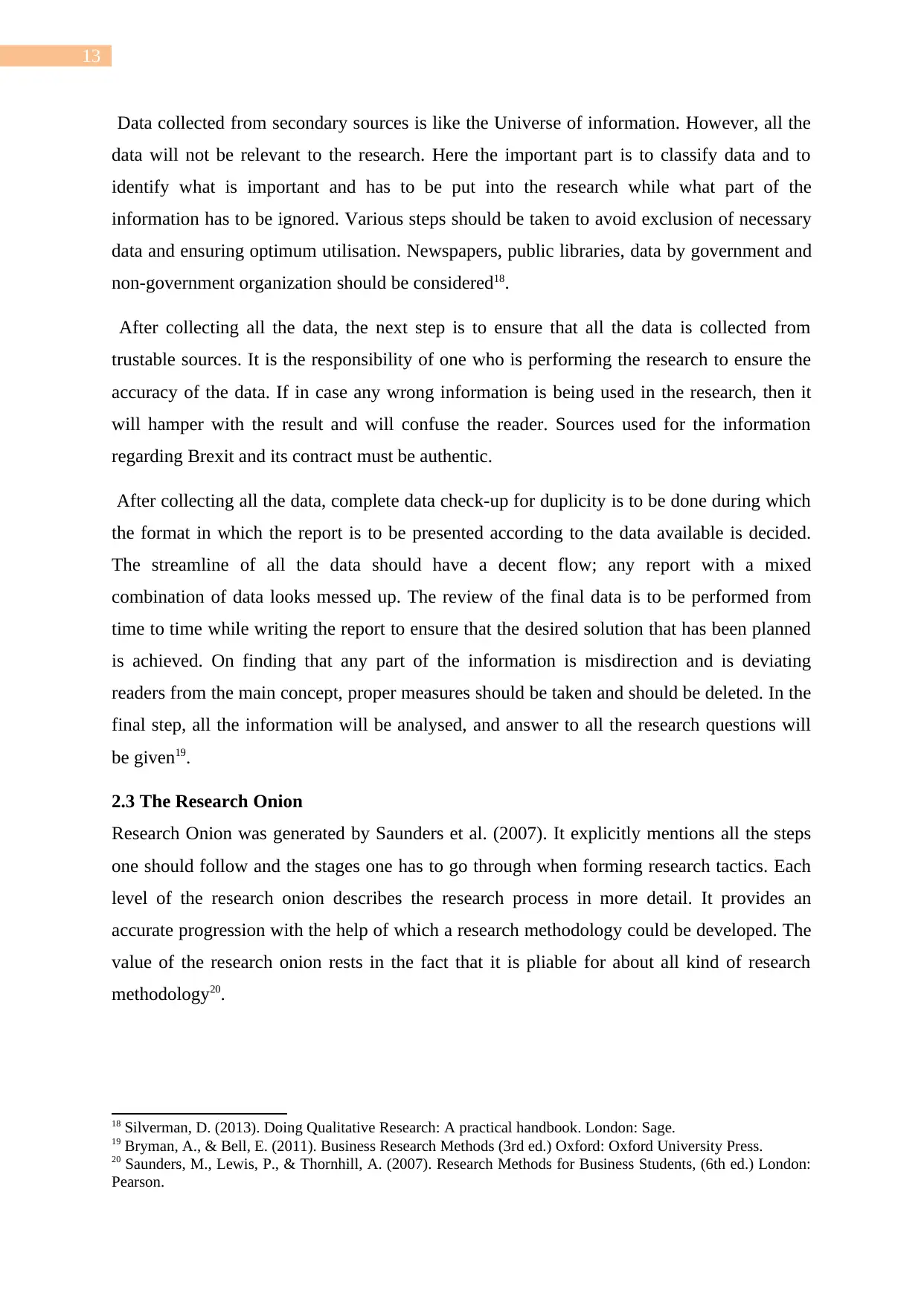
Data collected from secondary sources is like the Universe of information. However, all the
data will not be relevant to the research. Here the important part is to classify data and to
identify what is important and has to be put into the research while what part of the
information has to be ignored. Various steps should be taken to avoid exclusion of necessary
data and ensuring optimum utilisation. Newspapers, public libraries, data by government and
non-government organization should be considered18.
After collecting all the data, the next step is to ensure that all the data is collected from
trustable sources. It is the responsibility of one who is performing the research to ensure the
accuracy of the data. If in case any wrong information is being used in the research, then it
will hamper with the result and will confuse the reader. Sources used for the information
regarding Brexit and its contract must be authentic.
After collecting all the data, complete data check-up for duplicity is to be done during which
the format in which the report is to be presented according to the data available is decided.
The streamline of all the data should have a decent flow; any report with a mixed
combination of data looks messed up. The review of the final data is to be performed from
time to time while writing the report to ensure that the desired solution that has been planned
is achieved. On finding that any part of the information is misdirection and is deviating
readers from the main concept, proper measures should be taken and should be deleted. In the
final step, all the information will be analysed, and answer to all the research questions will
be given19.
2.3 The Research Onion
Research Onion was generated by Saunders et al. (2007). It explicitly mentions all the steps
one should follow and the stages one has to go through when forming research tactics. Each
level of the research onion describes the research process in more detail. It provides an
accurate progression with the help of which a research methodology could be developed. The
value of the research onion rests in the fact that it is pliable for about all kind of research
methodology20.
18 Silverman, D. (2013). Doing Qualitative Research: A practical handbook. London: Sage.
19 Bryman, A., & Bell, E. (2011). Business Research Methods (3rd ed.) Oxford: Oxford University Press.
20 Saunders, M., Lewis, P., & Thornhill, A. (2007). Research Methods for Business Students, (6th ed.) London:
Pearson.
Paraphrase This Document
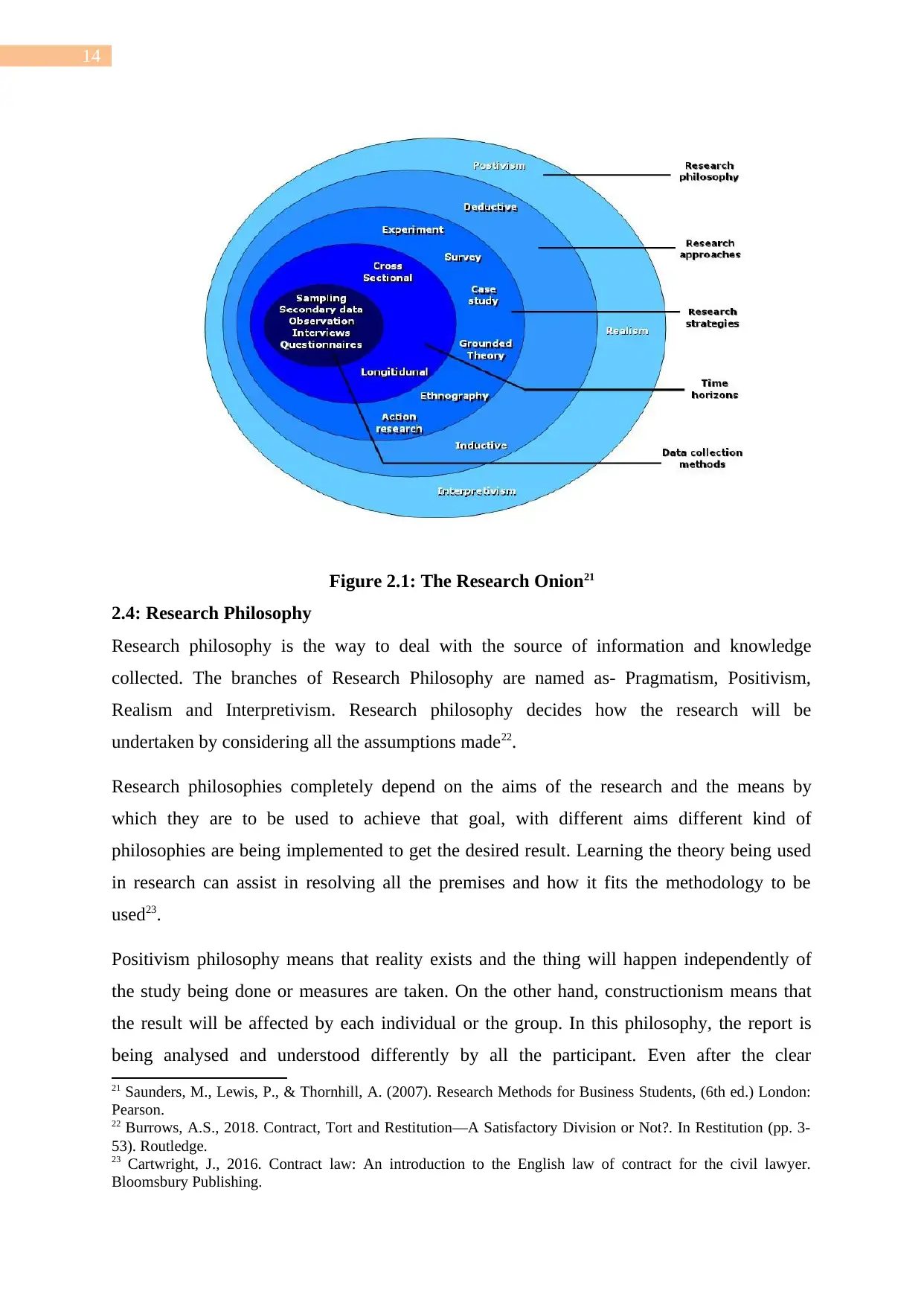
Figure 2.1: The Research Onion21
2.4: Research Philosophy
Research philosophy is the way to deal with the source of information and knowledge
collected. The branches of Research Philosophy are named as- Pragmatism, Positivism,
Realism and Interpretivism. Research philosophy decides how the research will be
undertaken by considering all the assumptions made22.
Research philosophies completely depend on the aims of the research and the means by
which they are to be used to achieve that goal, with different aims different kind of
philosophies are being implemented to get the desired result. Learning the theory being used
in research can assist in resolving all the premises and how it fits the methodology to be
used23.
Positivism philosophy means that reality exists and the thing will happen independently of
the study being done or measures are taken. On the other hand, constructionism means that
the result will be affected by each individual or the group. In this philosophy, the report is
being analysed and understood differently by all the participant. Even after the clear
21 Saunders, M., Lewis, P., & Thornhill, A. (2007). Research Methods for Business Students, (6th ed.) London:
Pearson.
22 Burrows, A.S., 2018. Contract, Tort and Restitution—A Satisfactory Division or Not?. In Restitution (pp. 3-
53). Routledge.
23 Cartwright, J., 2016. Contract law: An introduction to the English law of contract for the civil lawyer.
Bloomsbury Publishing.
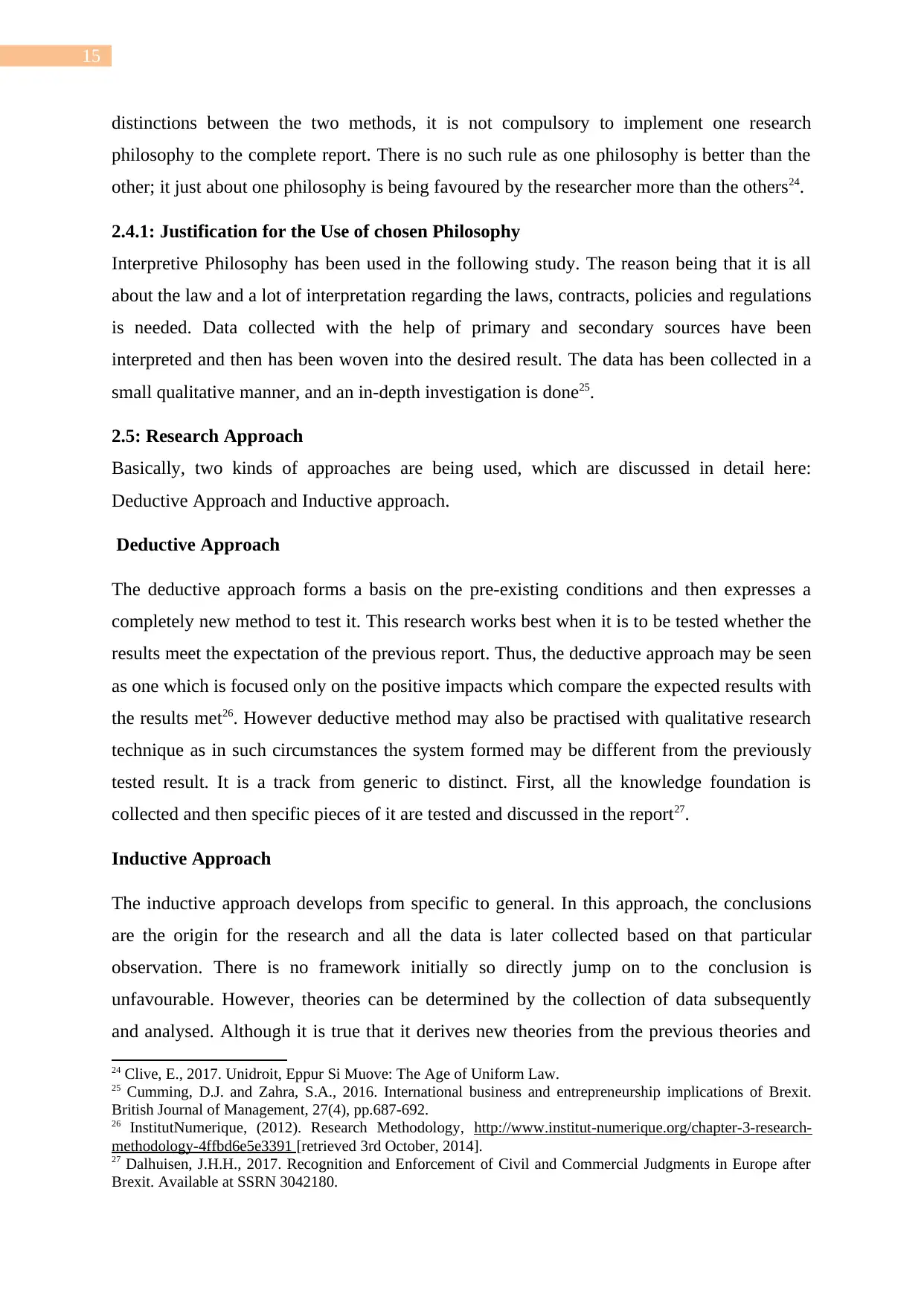
distinctions between the two methods, it is not compulsory to implement one research
philosophy to the complete report. There is no such rule as one philosophy is better than the
other; it just about one philosophy is being favoured by the researcher more than the others24.
2.4.1: Justification for the Use of chosen Philosophy
Interpretive Philosophy has been used in the following study. The reason being that it is all
about the law and a lot of interpretation regarding the laws, contracts, policies and regulations
is needed. Data collected with the help of primary and secondary sources have been
interpreted and then has been woven into the desired result. The data has been collected in a
small qualitative manner, and an in-depth investigation is done25.
2.5: Research Approach
Basically, two kinds of approaches are being used, which are discussed in detail here:
Deductive Approach and Inductive approach.
Deductive Approach
The deductive approach forms a basis on the pre-existing conditions and then expresses a
completely new method to test it. This research works best when it is to be tested whether the
results meet the expectation of the previous report. Thus, the deductive approach may be seen
as one which is focused only on the positive impacts which compare the expected results with
the results met26. However deductive method may also be practised with qualitative research
technique as in such circumstances the system formed may be different from the previously
tested result. It is a track from generic to distinct. First, all the knowledge foundation is
collected and then specific pieces of it are tested and discussed in the report27.
Inductive Approach
The inductive approach develops from specific to general. In this approach, the conclusions
are the origin for the research and all the data is later collected based on that particular
observation. There is no framework initially so directly jump on to the conclusion is
unfavourable. However, theories can be determined by the collection of data subsequently
and analysed. Although it is true that it derives new theories from the previous theories and
24 Clive, E., 2017. Unidroit, Eppur Si Muove: The Age of Uniform Law.
25 Cumming, D.J. and Zahra, S.A., 2016. International business and entrepreneurship implications of Brexit.
British Journal of Management, 27(4), pp.687-692.
26 InstitutNumerique, (2012). Research Methodology, http://www.institut-numerique.org/chapter-3-research-
methodology-4ffbd6e5e3391 [retrieved 3rd October, 2014].
27 Dalhuisen, J.H.H., 2017. Recognition and Enforcement of Civil and Commercial Judgments in Europe after
Brexit. Available at SSRN 3042180.
⊘ This is a preview!⊘
Do you want full access?
Subscribe today to unlock all pages.

Trusted by 1+ million students worldwide
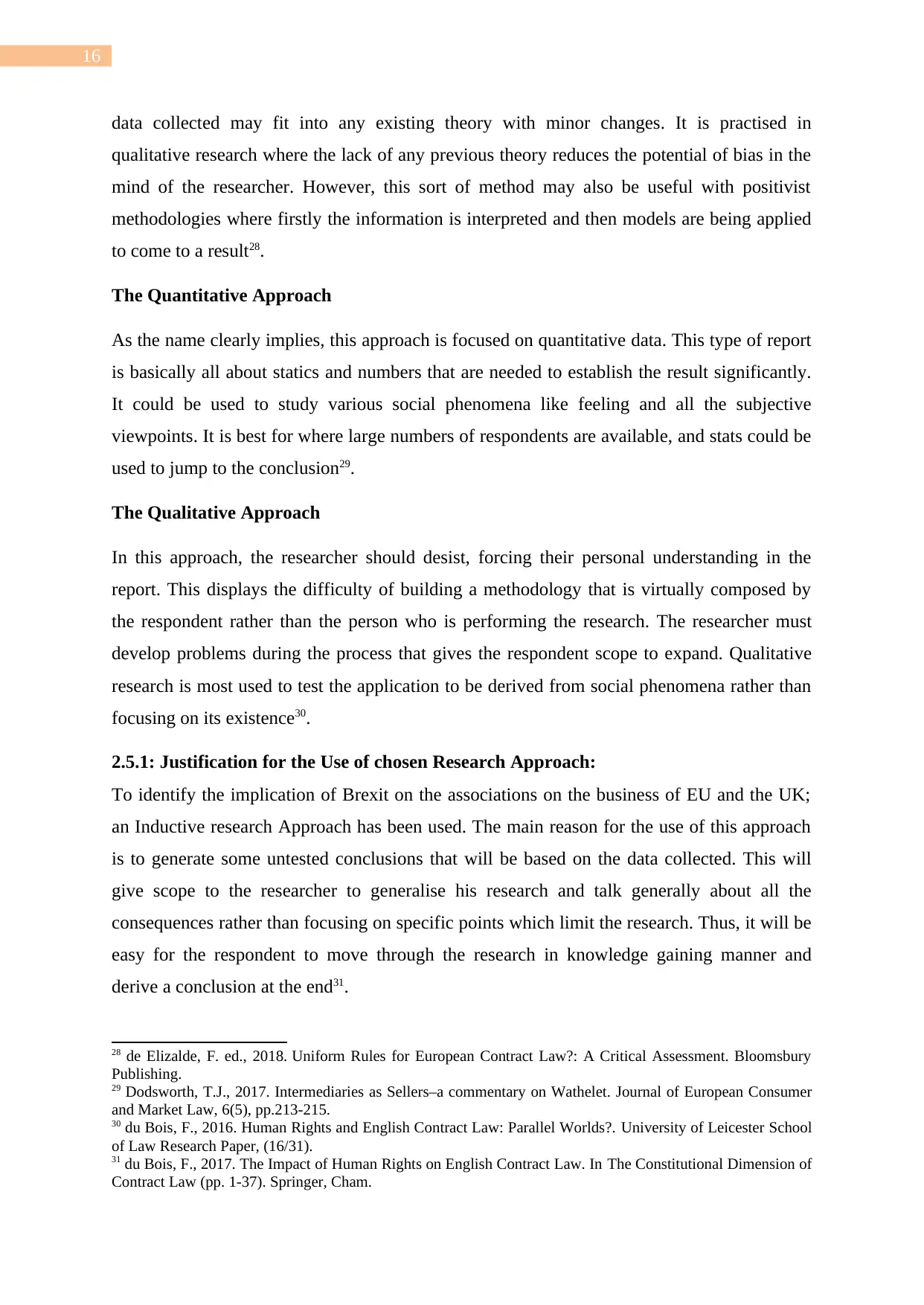
data collected may fit into any existing theory with minor changes. It is practised in
qualitative research where the lack of any previous theory reduces the potential of bias in the
mind of the researcher. However, this sort of method may also be useful with positivist
methodologies where firstly the information is interpreted and then models are being applied
to come to a result28.
The Quantitative Approach
As the name clearly implies, this approach is focused on quantitative data. This type of report
is basically all about statics and numbers that are needed to establish the result significantly.
It could be used to study various social phenomena like feeling and all the subjective
viewpoints. It is best for where large numbers of respondents are available, and stats could be
used to jump to the conclusion29.
The Qualitative Approach
In this approach, the researcher should desist, forcing their personal understanding in the
report. This displays the difficulty of building a methodology that is virtually composed by
the respondent rather than the person who is performing the research. The researcher must
develop problems during the process that gives the respondent scope to expand. Qualitative
research is most used to test the application to be derived from social phenomena rather than
focusing on its existence30.
2.5.1: Justification for the Use of chosen Research Approach:
To identify the implication of Brexit on the associations on the business of EU and the UK;
an Inductive research Approach has been used. The main reason for the use of this approach
is to generate some untested conclusions that will be based on the data collected. This will
give scope to the researcher to generalise his research and talk generally about all the
consequences rather than focusing on specific points which limit the research. Thus, it will be
easy for the respondent to move through the research in knowledge gaining manner and
derive a conclusion at the end31.
28 de Elizalde, F. ed., 2018. Uniform Rules for European Contract Law?: A Critical Assessment. Bloomsbury
Publishing.
29 Dodsworth, T.J., 2017. Intermediaries as Sellers–a commentary on Wathelet. Journal of European Consumer
and Market Law, 6(5), pp.213-215.
30 du Bois, F., 2016. Human Rights and English Contract Law: Parallel Worlds?. University of Leicester School
of Law Research Paper, (16/31).
31 du Bois, F., 2017. The Impact of Human Rights on English Contract Law. In The Constitutional Dimension of
Contract Law (pp. 1-37). Springer, Cham.
Paraphrase This Document
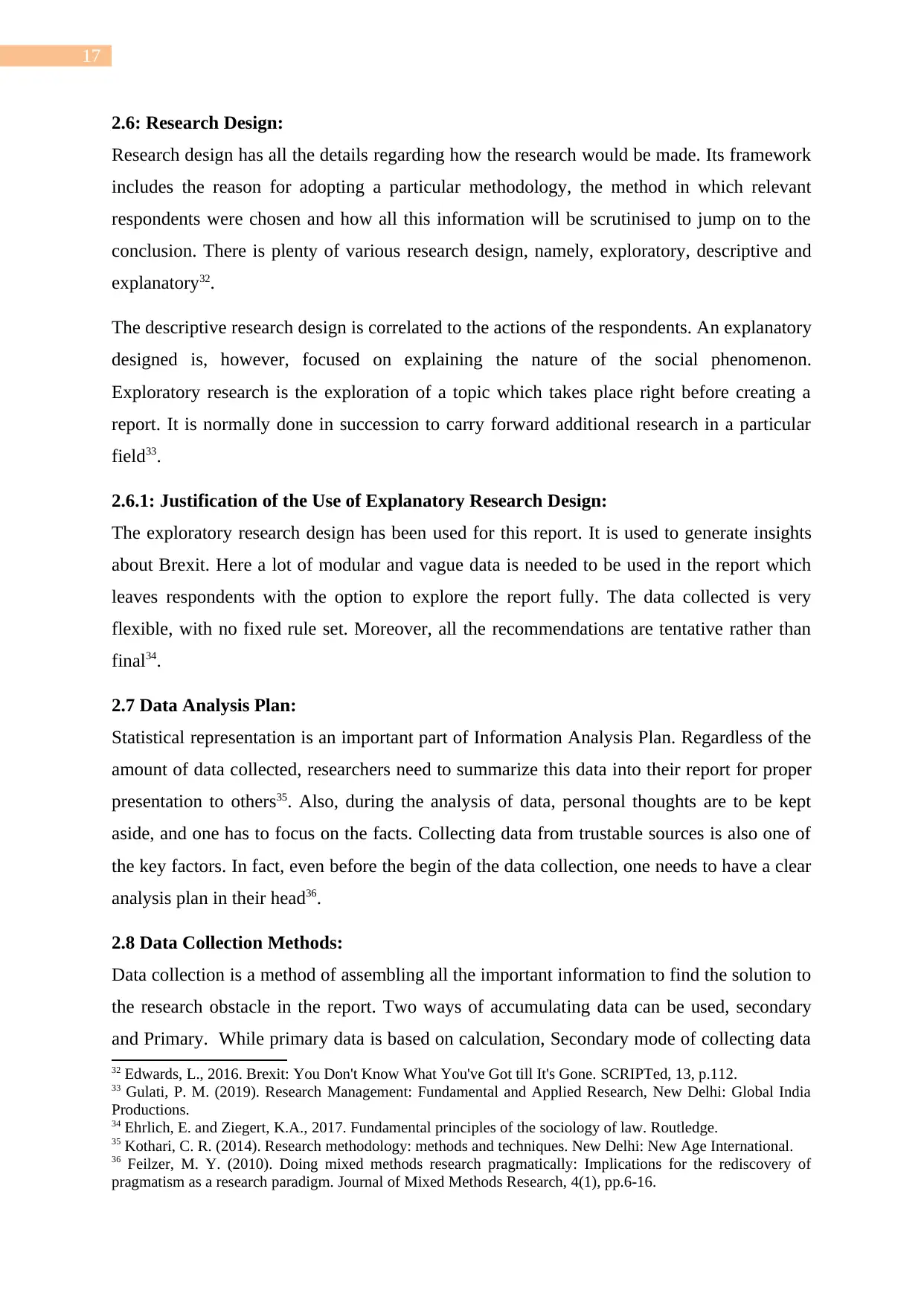
2.6: Research Design:
Research design has all the details regarding how the research would be made. Its framework
includes the reason for adopting a particular methodology, the method in which relevant
respondents were chosen and how all this information will be scrutinised to jump on to the
conclusion. There is plenty of various research design, namely, exploratory, descriptive and
explanatory32.
The descriptive research design is correlated to the actions of the respondents. An explanatory
designed is, however, focused on explaining the nature of the social phenomenon.
Exploratory research is the exploration of a topic which takes place right before creating a
report. It is normally done in succession to carry forward additional research in a particular
field33.
2.6.1: Justification of the Use of Explanatory Research Design:
The exploratory research design has been used for this report. It is used to generate insights
about Brexit. Here a lot of modular and vague data is needed to be used in the report which
leaves respondents with the option to explore the report fully. The data collected is very
flexible, with no fixed rule set. Moreover, all the recommendations are tentative rather than
final34.
2.7 Data Analysis Plan:
Statistical representation is an important part of Information Analysis Plan. Regardless of the
amount of data collected, researchers need to summarize this data into their report for proper
presentation to others35. Also, during the analysis of data, personal thoughts are to be kept
aside, and one has to focus on the facts. Collecting data from trustable sources is also one of
the key factors. In fact, even before the begin of the data collection, one needs to have a clear
analysis plan in their head36.
2.8 Data Collection Methods:
Data collection is a method of assembling all the important information to find the solution to
the research obstacle in the report. Two ways of accumulating data can be used, secondary
and Primary. While primary data is based on calculation, Secondary mode of collecting data
32 Edwards, L., 2016. Brexit: You Don't Know What You've Got till It's Gone. SCRIPTed, 13, p.112.
33 Gulati, P. M. (2019). Research Management: Fundamental and Applied Research, New Delhi: Global India
Productions.
34 Ehrlich, E. and Ziegert, K.A., 2017. Fundamental principles of the sociology of law. Routledge.
35 Kothari, C. R. (2014). Research methodology: methods and techniques. New Delhi: New Age International.
36 Feilzer, M. Y. (2010). Doing mixed methods research pragmatically: Implications for the rediscovery of
pragmatism as a research paradigm. Journal of Mixed Methods Research, 4(1), pp.6-16.
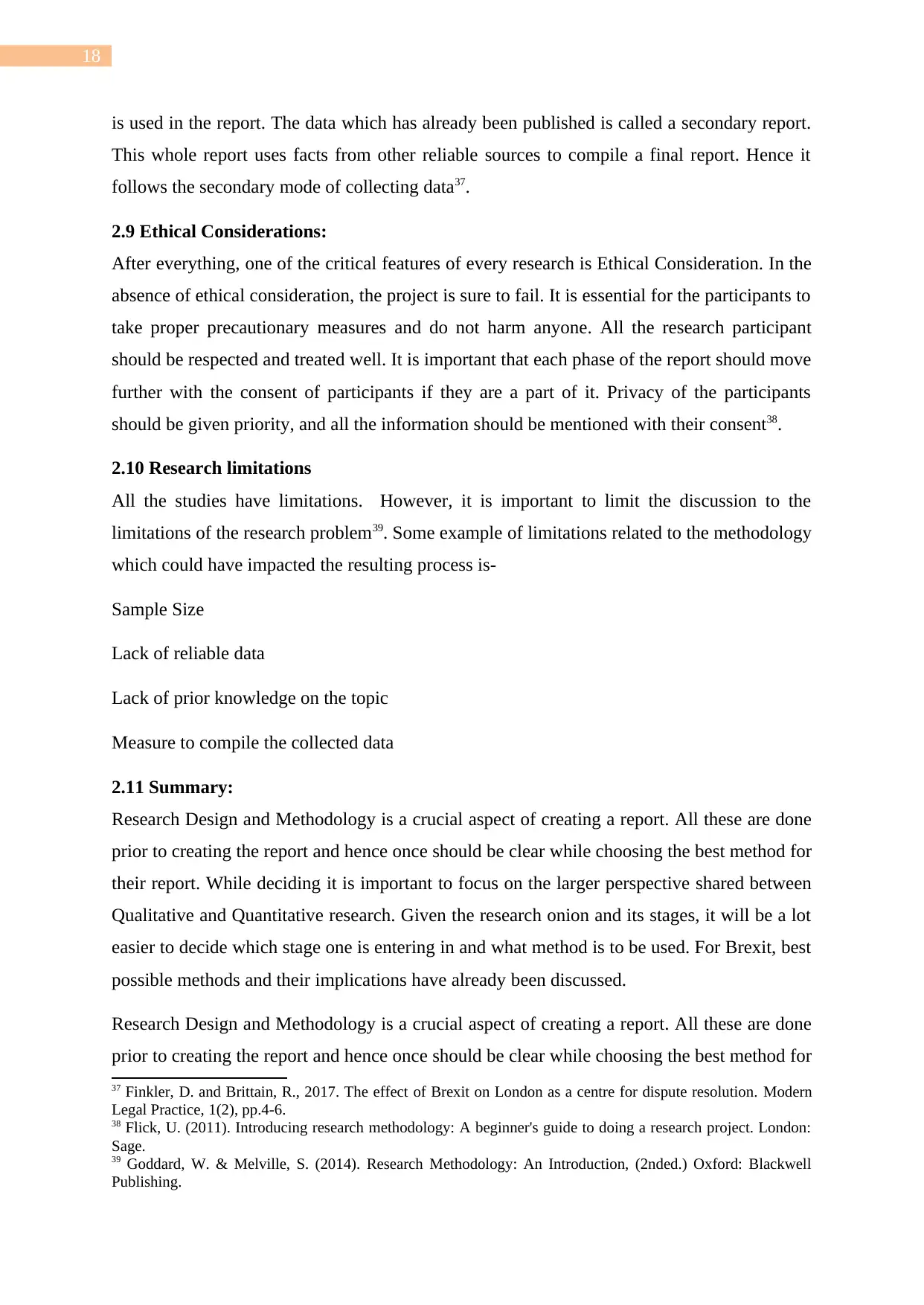
is used in the report. The data which has already been published is called a secondary report.
This whole report uses facts from other reliable sources to compile a final report. Hence it
follows the secondary mode of collecting data37.
2.9 Ethical Considerations:
After everything, one of the critical features of every research is Ethical Consideration. In the
absence of ethical consideration, the project is sure to fail. It is essential for the participants to
take proper precautionary measures and do not harm anyone. All the research participant
should be respected and treated well. It is important that each phase of the report should move
further with the consent of participants if they are a part of it. Privacy of the participants
should be given priority, and all the information should be mentioned with their consent38.
2.10 Research limitations
All the studies have limitations. However, it is important to limit the discussion to the
limitations of the research problem39. Some example of limitations related to the methodology
which could have impacted the resulting process is-
Sample Size
Lack of reliable data
Lack of prior knowledge on the topic
Measure to compile the collected data
2.11 Summary:
Research Design and Methodology is a crucial aspect of creating a report. All these are done
prior to creating the report and hence once should be clear while choosing the best method for
their report. While deciding it is important to focus on the larger perspective shared between
Qualitative and Quantitative research. Given the research onion and its stages, it will be a lot
easier to decide which stage one is entering in and what method is to be used. For Brexit, best
possible methods and their implications have already been discussed.
Research Design and Methodology is a crucial aspect of creating a report. All these are done
prior to creating the report and hence once should be clear while choosing the best method for
37 Finkler, D. and Brittain, R., 2017. The effect of Brexit on London as a centre for dispute resolution. Modern
Legal Practice, 1(2), pp.4-6.
38 Flick, U. (2011). Introducing research methodology: A beginner's guide to doing a research project. London:
Sage.
39 Goddard, W. & Melville, S. (2014). Research Methodology: An Introduction, (2nded.) Oxford: Blackwell
Publishing.
⊘ This is a preview!⊘
Do you want full access?
Subscribe today to unlock all pages.

Trusted by 1+ million students worldwide

their report. While deciding it is important to focus on the larger perspective shared between
Qualitative and Quantitative research. Given the research onion and its stages, it will be a lot
easier to decide which stage one is entering in and what method is to be used. For Brexit, best
possible methods and their implications have already been discussed.
Paraphrase This Document
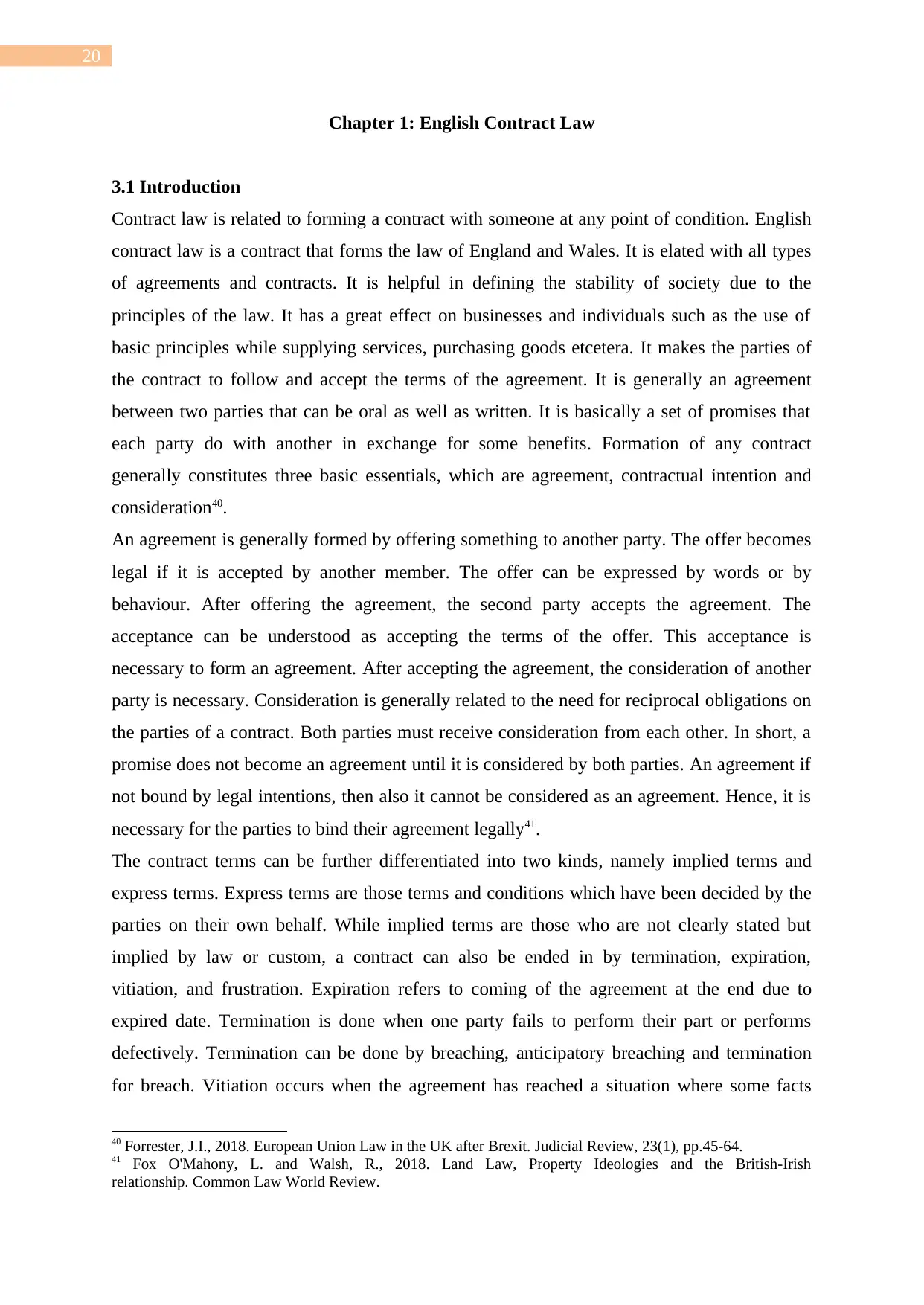
Chapter 1: English Contract Law
3.1 Introduction
Contract law is related to forming a contract with someone at any point of condition. English
contract law is a contract that forms the law of England and Wales. It is elated with all types
of agreements and contracts. It is helpful in defining the stability of society due to the
principles of the law. It has a great effect on businesses and individuals such as the use of
basic principles while supplying services, purchasing goods etcetera. It makes the parties of
the contract to follow and accept the terms of the agreement. It is generally an agreement
between two parties that can be oral as well as written. It is basically a set of promises that
each party do with another in exchange for some benefits. Formation of any contract
generally constitutes three basic essentials, which are agreement, contractual intention and
consideration40.
An agreement is generally formed by offering something to another party. The offer becomes
legal if it is accepted by another member. The offer can be expressed by words or by
behaviour. After offering the agreement, the second party accepts the agreement. The
acceptance can be understood as accepting the terms of the offer. This acceptance is
necessary to form an agreement. After accepting the agreement, the consideration of another
party is necessary. Consideration is generally related to the need for reciprocal obligations on
the parties of a contract. Both parties must receive consideration from each other. In short, a
promise does not become an agreement until it is considered by both parties. An agreement if
not bound by legal intentions, then also it cannot be considered as an agreement. Hence, it is
necessary for the parties to bind their agreement legally41.
The contract terms can be further differentiated into two kinds, namely implied terms and
express terms. Express terms are those terms and conditions which have been decided by the
parties on their own behalf. While implied terms are those who are not clearly stated but
implied by law or custom, a contract can also be ended in by termination, expiration,
vitiation, and frustration. Expiration refers to coming of the agreement at the end due to
expired date. Termination is done when one party fails to perform their part or performs
defectively. Termination can be done by breaching, anticipatory breaching and termination
for breach. Vitiation occurs when the agreement has reached a situation where some facts
40 Forrester, J.I., 2018. European Union Law in the UK after Brexit. Judicial Review, 23(1), pp.45-64.
41 Fox O'Mahony, L. and Walsh, R., 2018. Land Law, Property Ideologies and the British-Irish
relationship. Common Law World Review.
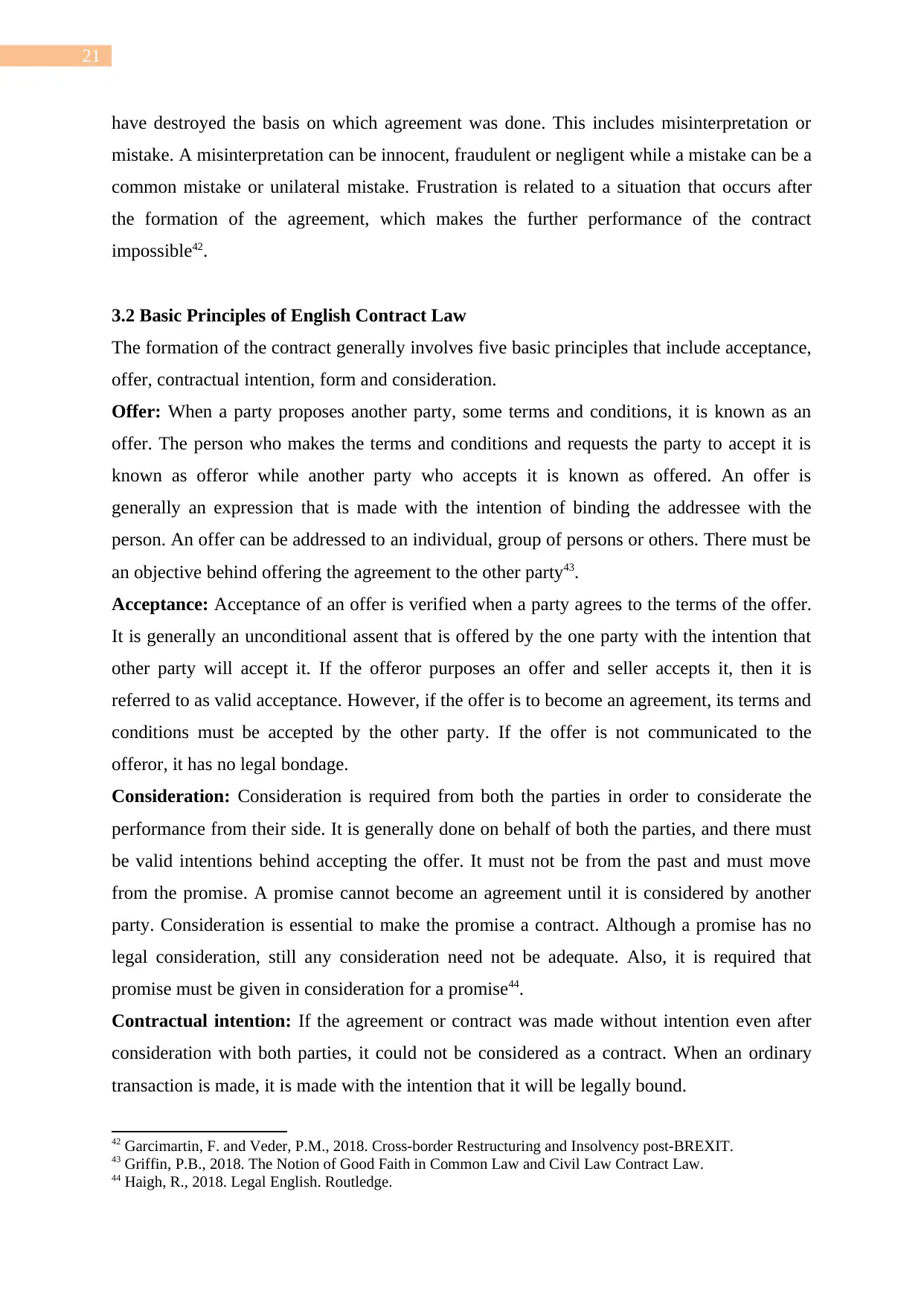
have destroyed the basis on which agreement was done. This includes misinterpretation or
mistake. A misinterpretation can be innocent, fraudulent or negligent while a mistake can be a
common mistake or unilateral mistake. Frustration is related to a situation that occurs after
the formation of the agreement, which makes the further performance of the contract
impossible42.
3.2 Basic Principles of English Contract Law
The formation of the contract generally involves five basic principles that include acceptance,
offer, contractual intention, form and consideration.
Offer: When a party proposes another party, some terms and conditions, it is known as an
offer. The person who makes the terms and conditions and requests the party to accept it is
known as offeror while another party who accepts it is known as offered. An offer is
generally an expression that is made with the intention of binding the addressee with the
person. An offer can be addressed to an individual, group of persons or others. There must be
an objective behind offering the agreement to the other party43.
Acceptance: Acceptance of an offer is verified when a party agrees to the terms of the offer.
It is generally an unconditional assent that is offered by the one party with the intention that
other party will accept it. If the offeror purposes an offer and seller accepts it, then it is
referred to as valid acceptance. However, if the offer is to become an agreement, its terms and
conditions must be accepted by the other party. If the offer is not communicated to the
offeror, it has no legal bondage.
Consideration: Consideration is required from both the parties in order to considerate the
performance from their side. It is generally done on behalf of both the parties, and there must
be valid intentions behind accepting the offer. It must not be from the past and must move
from the promise. A promise cannot become an agreement until it is considered by another
party. Consideration is essential to make the promise a contract. Although a promise has no
legal consideration, still any consideration need not be adequate. Also, it is required that
promise must be given in consideration for a promise44.
Contractual intention: If the agreement or contract was made without intention even after
consideration with both parties, it could not be considered as a contract. When an ordinary
transaction is made, it is made with the intention that it will be legally bound.
42 Garcimartin, F. and Veder, P.M., 2018. Cross-border Restructuring and Insolvency post-BREXIT.
43 Griffin, P.B., 2018. The Notion of Good Faith in Common Law and Civil Law Contract Law.
44 Haigh, R., 2018. Legal English. Routledge.
⊘ This is a preview!⊘
Do you want full access?
Subscribe today to unlock all pages.

Trusted by 1+ million students worldwide
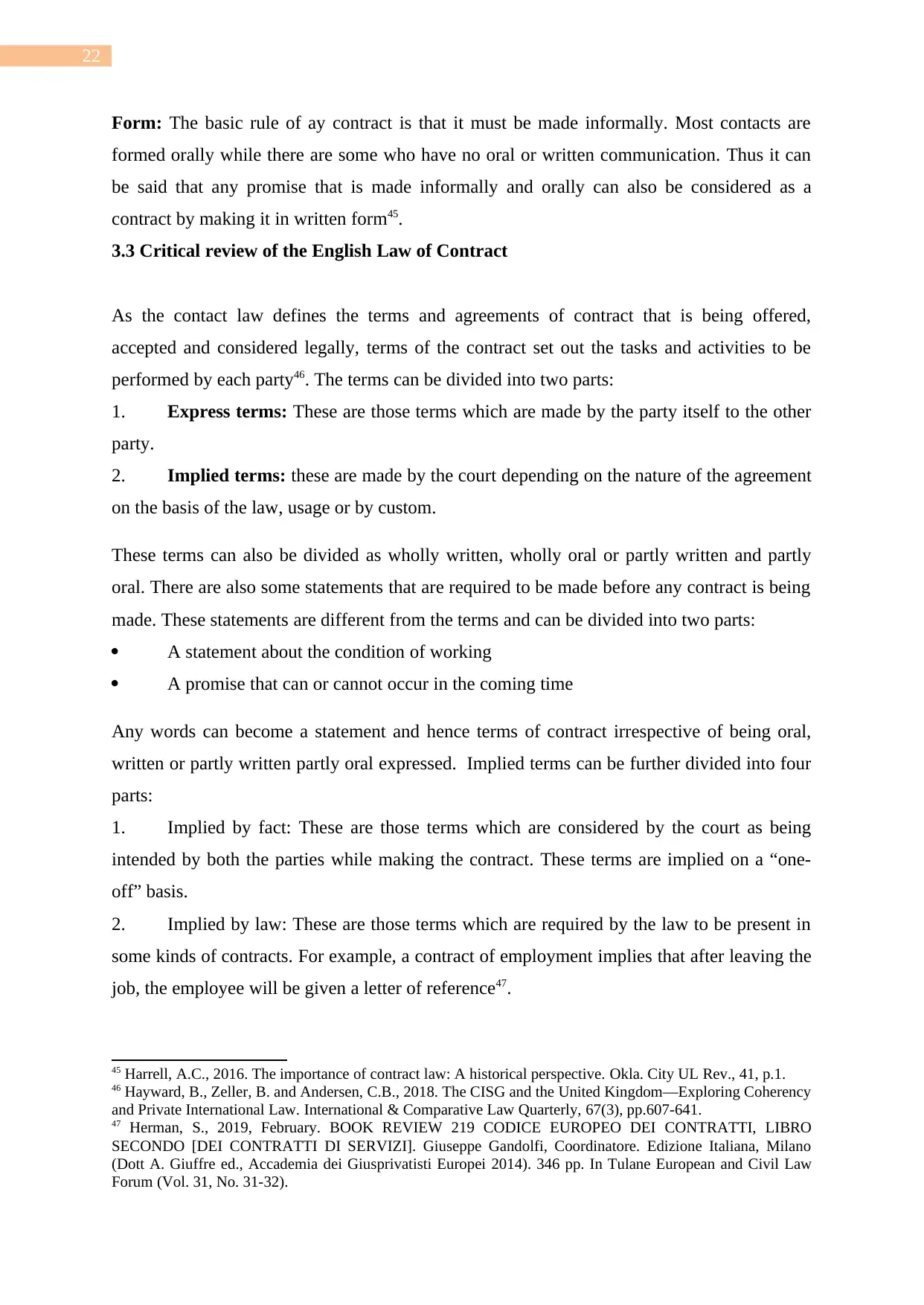
Form: The basic rule of ay contract is that it must be made informally. Most contacts are
formed orally while there are some who have no oral or written communication. Thus it can
be said that any promise that is made informally and orally can also be considered as a
contract by making it in written form45.
3.3 Critical review of the English Law of Contract
As the contact law defines the terms and agreements of contract that is being offered,
accepted and considered legally, terms of the contract set out the tasks and activities to be
performed by each party46. The terms can be divided into two parts:
1. Express terms: These are those terms which are made by the party itself to the other
party.
2. Implied terms: these are made by the court depending on the nature of the agreement
on the basis of the law, usage or by custom.
These terms can also be divided as wholly written, wholly oral or partly written and partly
oral. There are also some statements that are required to be made before any contract is being
made. These statements are different from the terms and can be divided into two parts:
A statement about the condition of working
A promise that can or cannot occur in the coming time
Any words can become a statement and hence terms of contract irrespective of being oral,
written or partly written partly oral expressed. Implied terms can be further divided into four
parts:
1. Implied by fact: These are those terms which are considered by the court as being
intended by both the parties while making the contract. These terms are implied on a “one-
off” basis.
2. Implied by law: These are those terms which are required by the law to be present in
some kinds of contracts. For example, a contract of employment implies that after leaving the
job, the employee will be given a letter of reference47.
45 Harrell, A.C., 2016. The importance of contract law: A historical perspective. Okla. City UL Rev., 41, p.1.
46 Hayward, B., Zeller, B. and Andersen, C.B., 2018. The CISG and the United Kingdom—Exploring Coherency
and Private International Law. International & Comparative Law Quarterly, 67(3), pp.607-641.
47 Herman, S., 2019, February. BOOK REVIEW 219 CODICE EUROPEO DEI CONTRATTI, LIBRO
SECONDO [DEI CONTRATTI DI SERVIZI]. Giuseppe Gandolfi, Coordinatore. Edizione Italiana, Milano
(Dott A. Giuffre ed., Accademia dei Giusprivatisti Europei 2014). 346 pp. In Tulane European and Civil Law
Forum (Vol. 31, No. 31-32).
Paraphrase This Document
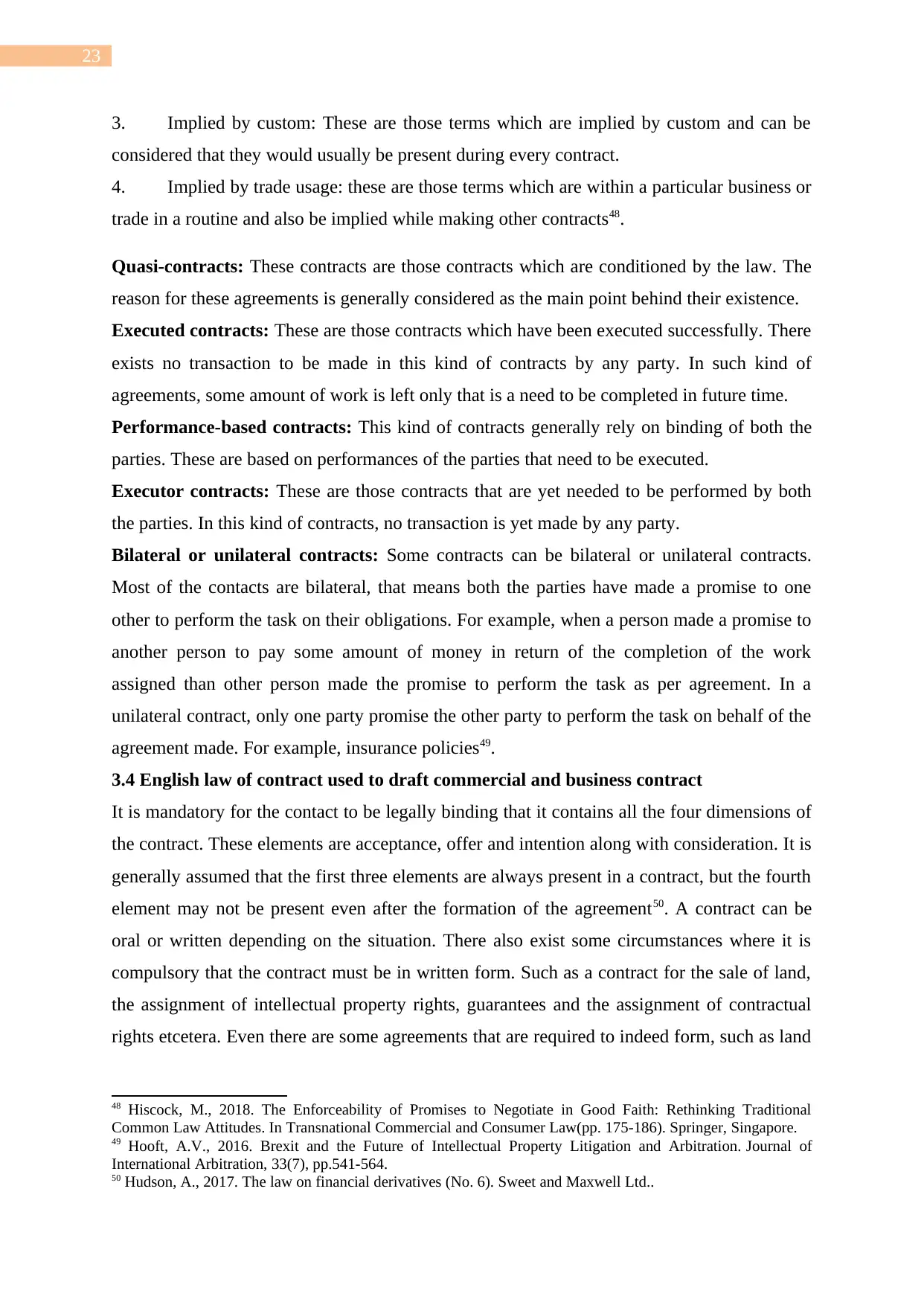
3. Implied by custom: These are those terms which are implied by custom and can be
considered that they would usually be present during every contract.
4. Implied by trade usage: these are those terms which are within a particular business or
trade in a routine and also be implied while making other contracts48.
Quasi-contracts: These contracts are those contracts which are conditioned by the law. The
reason for these agreements is generally considered as the main point behind their existence.
Executed contracts: These are those contracts which have been executed successfully. There
exists no transaction to be made in this kind of contracts by any party. In such kind of
agreements, some amount of work is left only that is a need to be completed in future time.
Performance-based contracts: This kind of contracts generally rely on binding of both the
parties. These are based on performances of the parties that need to be executed.
Executor contracts: These are those contracts that are yet needed to be performed by both
the parties. In this kind of contracts, no transaction is yet made by any party.
Bilateral or unilateral contracts: Some contracts can be bilateral or unilateral contracts.
Most of the contacts are bilateral, that means both the parties have made a promise to one
other to perform the task on their obligations. For example, when a person made a promise to
another person to pay some amount of money in return of the completion of the work
assigned than other person made the promise to perform the task as per agreement. In a
unilateral contract, only one party promise the other party to perform the task on behalf of the
agreement made. For example, insurance policies49.
3.4 English law of contract used to draft commercial and business contract
It is mandatory for the contact to be legally binding that it contains all the four dimensions of
the contract. These elements are acceptance, offer and intention along with consideration. It is
generally assumed that the first three elements are always present in a contract, but the fourth
element may not be present even after the formation of the agreement50. A contract can be
oral or written depending on the situation. There also exist some circumstances where it is
compulsory that the contract must be in written form. Such as a contract for the sale of land,
the assignment of intellectual property rights, guarantees and the assignment of contractual
rights etcetera. Even there are some agreements that are required to indeed form, such as land
48 Hiscock, M., 2018. The Enforceability of Promises to Negotiate in Good Faith: Rethinking Traditional
Common Law Attitudes. In Transnational Commercial and Consumer Law(pp. 175-186). Springer, Singapore.
49 Hooft, A.V., 2016. Brexit and the Future of Intellectual Property Litigation and Arbitration. Journal of
International Arbitration, 33(7), pp.541-564.
50 Hudson, A., 2017. The law on financial derivatives (No. 6). Sweet and Maxwell Ltd..
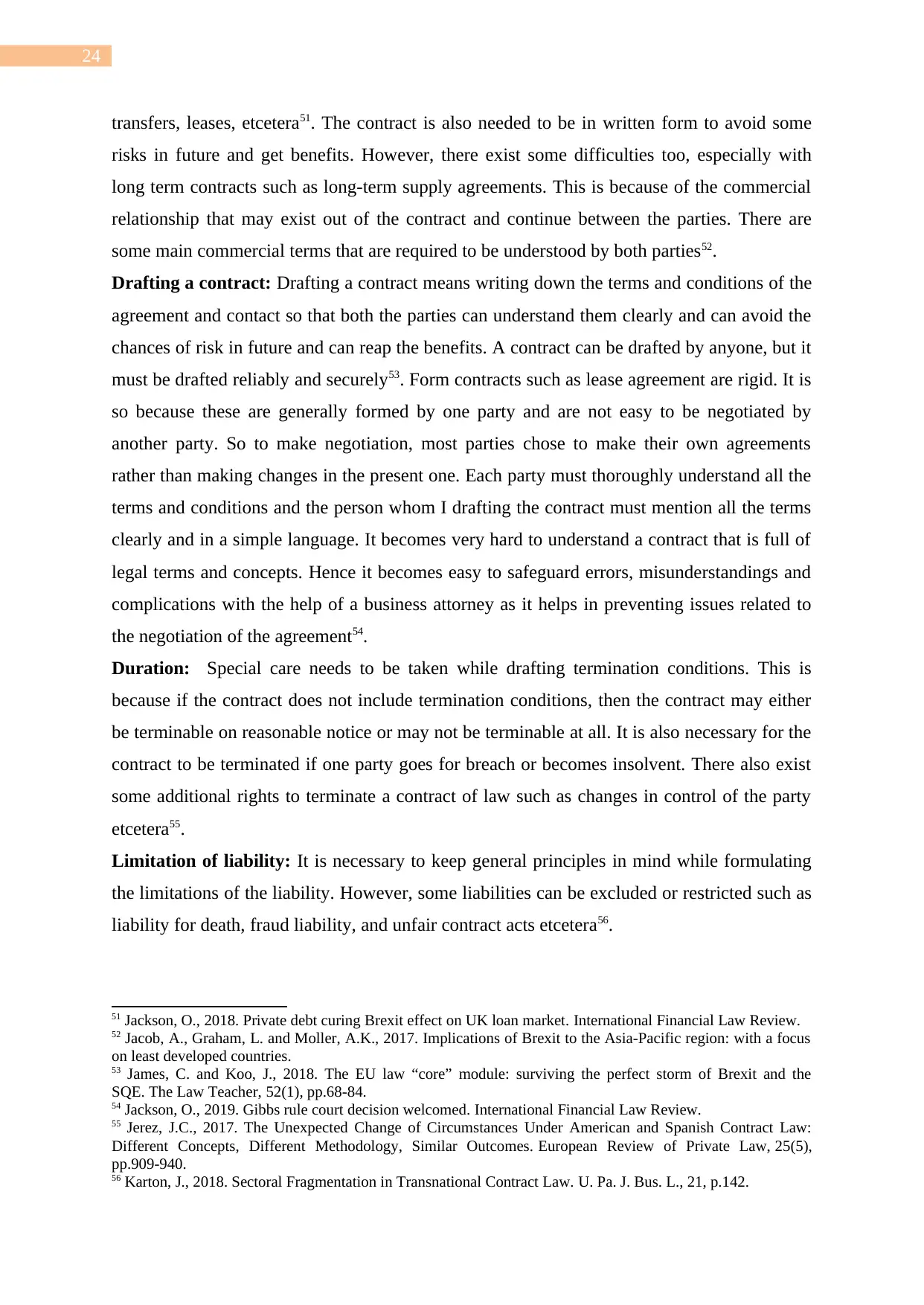
transfers, leases, etcetera51. The contract is also needed to be in written form to avoid some
risks in future and get benefits. However, there exist some difficulties too, especially with
long term contracts such as long-term supply agreements. This is because of the commercial
relationship that may exist out of the contract and continue between the parties. There are
some main commercial terms that are required to be understood by both parties52.
Drafting a contract: Drafting a contract means writing down the terms and conditions of the
agreement and contact so that both the parties can understand them clearly and can avoid the
chances of risk in future and can reap the benefits. A contract can be drafted by anyone, but it
must be drafted reliably and securely53. Form contracts such as lease agreement are rigid. It is
so because these are generally formed by one party and are not easy to be negotiated by
another party. So to make negotiation, most parties chose to make their own agreements
rather than making changes in the present one. Each party must thoroughly understand all the
terms and conditions and the person whom I drafting the contract must mention all the terms
clearly and in a simple language. It becomes very hard to understand a contract that is full of
legal terms and concepts. Hence it becomes easy to safeguard errors, misunderstandings and
complications with the help of a business attorney as it helps in preventing issues related to
the negotiation of the agreement54.
Duration: Special care needs to be taken while drafting termination conditions. This is
because if the contract does not include termination conditions, then the contract may either
be terminable on reasonable notice or may not be terminable at all. It is also necessary for the
contract to be terminated if one party goes for breach or becomes insolvent. There also exist
some additional rights to terminate a contract of law such as changes in control of the party
etcetera55.
Limitation of liability: It is necessary to keep general principles in mind while formulating
the limitations of the liability. However, some liabilities can be excluded or restricted such as
liability for death, fraud liability, and unfair contract acts etcetera56.
51 Jackson, O., 2018. Private debt curing Brexit effect on UK loan market. International Financial Law Review.
52 Jacob, A., Graham, L. and Moller, A.K., 2017. Implications of Brexit to the Asia-Pacific region: with a focus
on least developed countries.
53 James, C. and Koo, J., 2018. The EU law “core” module: surviving the perfect storm of Brexit and the
SQE. The Law Teacher, 52(1), pp.68-84.
54 Jackson, O., 2019. Gibbs rule court decision welcomed. International Financial Law Review.
55 Jerez, J.C., 2017. The Unexpected Change of Circumstances Under American and Spanish Contract Law:
Different Concepts, Different Methodology, Similar Outcomes. European Review of Private Law, 25(5),
pp.909-940.
56 Karton, J., 2018. Sectoral Fragmentation in Transnational Contract Law. U. Pa. J. Bus. L., 21, p.142.
⊘ This is a preview!⊘
Do you want full access?
Subscribe today to unlock all pages.

Trusted by 1+ million students worldwide
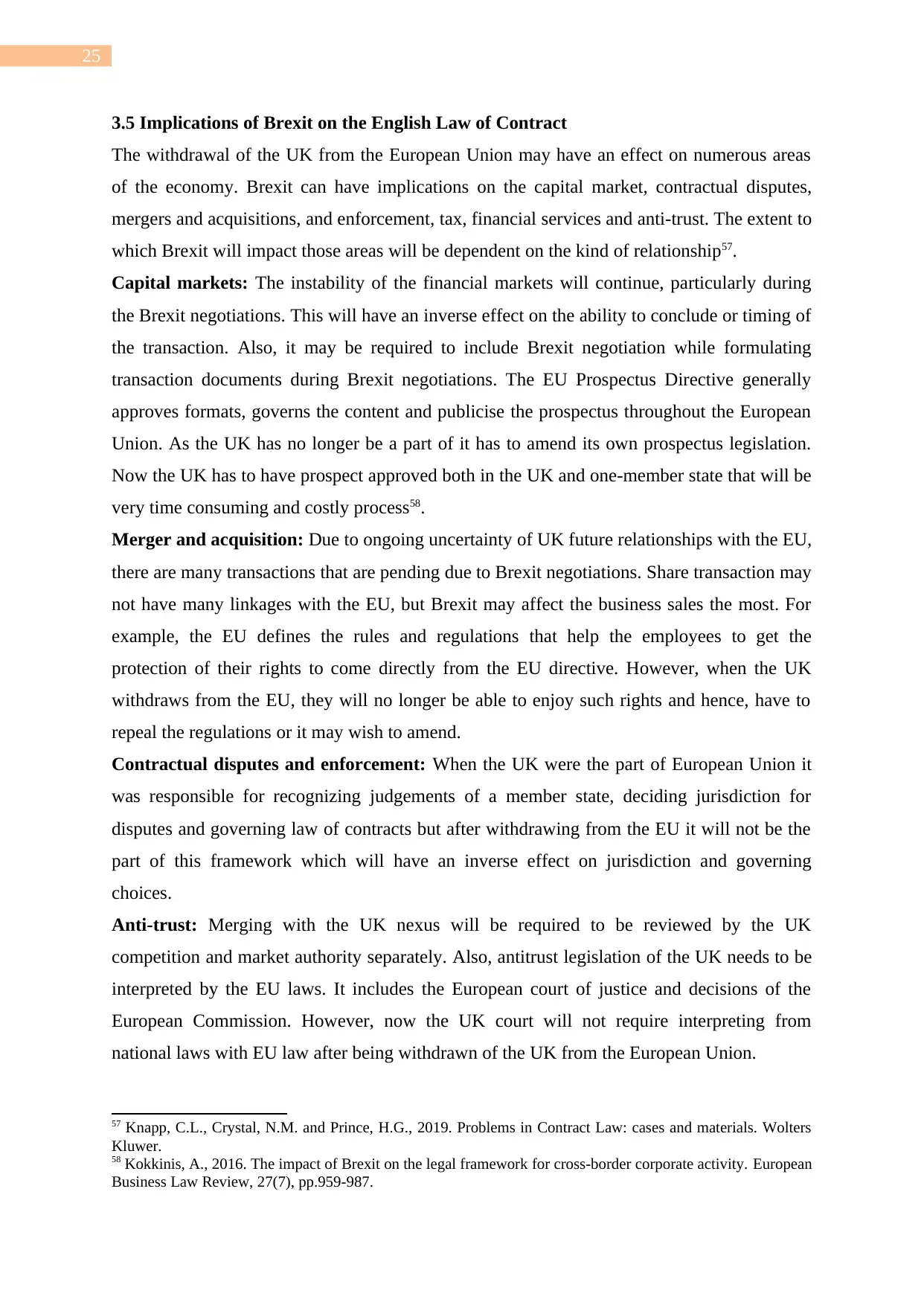
3.5 Implications of Brexit on the English Law of Contract
The withdrawal of the UK from the European Union may have an effect on numerous areas
of the economy. Brexit can have implications on the capital market, contractual disputes,
mergers and acquisitions, and enforcement, tax, financial services and anti-trust. The extent to
which Brexit will impact those areas will be dependent on the kind of relationship57.
Capital markets: The instability of the financial markets will continue, particularly during
the Brexit negotiations. This will have an inverse effect on the ability to conclude or timing of
the transaction. Also, it may be required to include Brexit negotiation while formulating
transaction documents during Brexit negotiations. The EU Prospectus Directive generally
approves formats, governs the content and publicise the prospectus throughout the European
Union. As the UK has no longer be a part of it has to amend its own prospectus legislation.
Now the UK has to have prospect approved both in the UK and one-member state that will be
very time consuming and costly process58.
Merger and acquisition: Due to ongoing uncertainty of UK future relationships with the EU,
there are many transactions that are pending due to Brexit negotiations. Share transaction may
not have many linkages with the EU, but Brexit may affect the business sales the most. For
example, the EU defines the rules and regulations that help the employees to get the
protection of their rights to come directly from the EU directive. However, when the UK
withdraws from the EU, they will no longer be able to enjoy such rights and hence, have to
repeal the regulations or it may wish to amend.
Contractual disputes and enforcement: When the UK were the part of European Union it
was responsible for recognizing judgements of a member state, deciding jurisdiction for
disputes and governing law of contracts but after withdrawing from the EU it will not be the
part of this framework which will have an inverse effect on jurisdiction and governing
choices.
Anti-trust: Merging with the UK nexus will be required to be reviewed by the UK
competition and market authority separately. Also, antitrust legislation of the UK needs to be
interpreted by the EU laws. It includes the European court of justice and decisions of the
European Commission. However, now the UK court will not require interpreting from
national laws with EU law after being withdrawn of the UK from the European Union.
57 Knapp, C.L., Crystal, N.M. and Prince, H.G., 2019. Problems in Contract Law: cases and materials. Wolters
Kluwer.
58 Kokkinis, A., 2016. The impact of Brexit on the legal framework for cross-border corporate activity. European
Business Law Review, 27(7), pp.959-987.
Paraphrase This Document
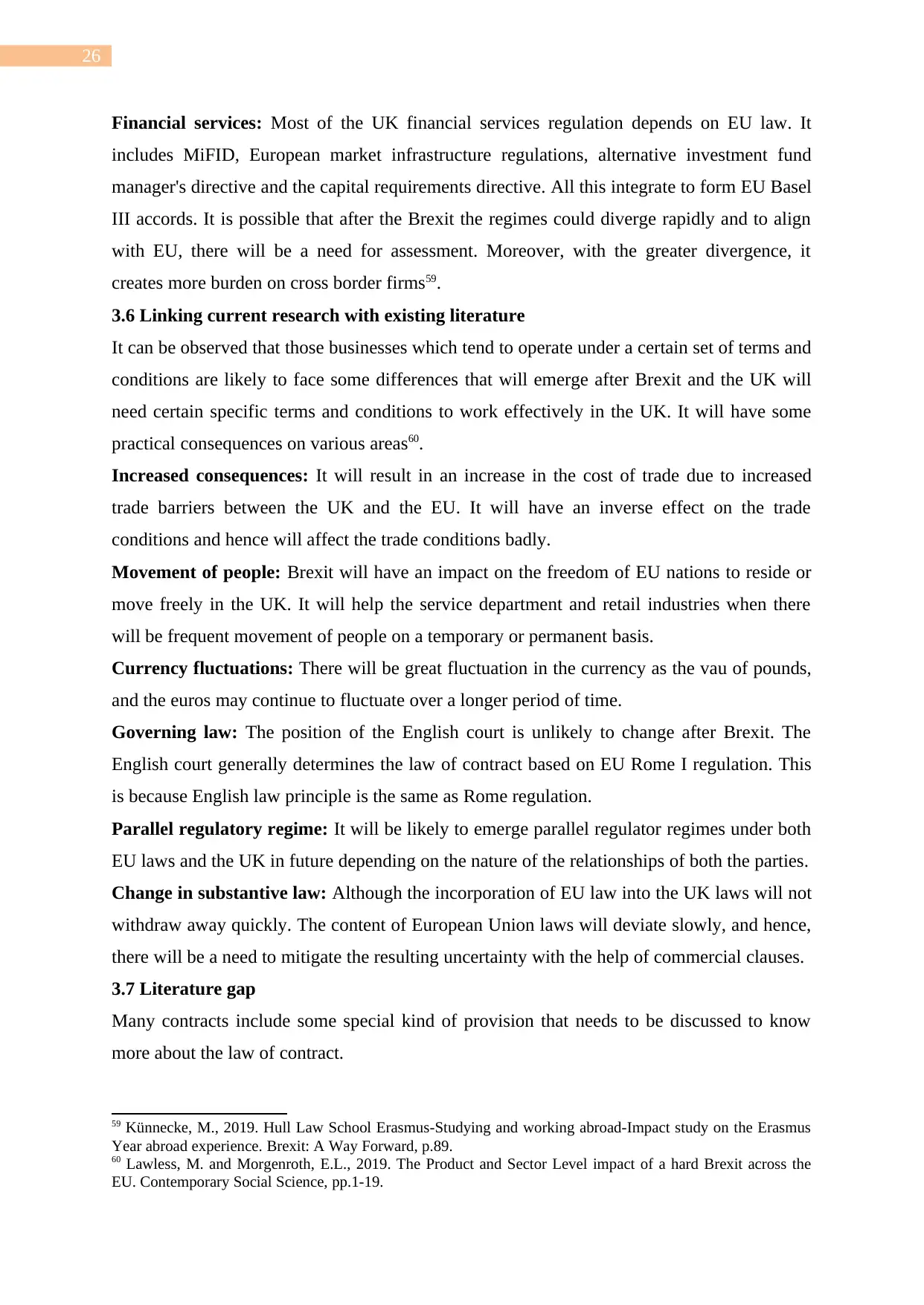
Financial services: Most of the UK financial services regulation depends on EU law. It
includes MiFID, European market infrastructure regulations, alternative investment fund
manager's directive and the capital requirements directive. All this integrate to form EU Basel
III accords. It is possible that after the Brexit the regimes could diverge rapidly and to align
with EU, there will be a need for assessment. Moreover, with the greater divergence, it
creates more burden on cross border firms59.
3.6 Linking current research with existing literature
It can be observed that those businesses which tend to operate under a certain set of terms and
conditions are likely to face some differences that will emerge after Brexit and the UK will
need certain specific terms and conditions to work effectively in the UK. It will have some
practical consequences on various areas60.
Increased consequences: It will result in an increase in the cost of trade due to increased
trade barriers between the UK and the EU. It will have an inverse effect on the trade
conditions and hence will affect the trade conditions badly.
Movement of people: Brexit will have an impact on the freedom of EU nations to reside or
move freely in the UK. It will help the service department and retail industries when there
will be frequent movement of people on a temporary or permanent basis.
Currency fluctuations: There will be great fluctuation in the currency as the vau of pounds,
and the euros may continue to fluctuate over a longer period of time.
Governing law: The position of the English court is unlikely to change after Brexit. The
English court generally determines the law of contract based on EU Rome I regulation. This
is because English law principle is the same as Rome regulation.
Parallel regulatory regime: It will be likely to emerge parallel regulator regimes under both
EU laws and the UK in future depending on the nature of the relationships of both the parties.
Change in substantive law: Although the incorporation of EU law into the UK laws will not
withdraw away quickly. The content of European Union laws will deviate slowly, and hence,
there will be a need to mitigate the resulting uncertainty with the help of commercial clauses.
3.7 Literature gap
Many contracts include some special kind of provision that needs to be discussed to know
more about the law of contract.
59 Künnecke, M., 2019. Hull Law School Erasmus-Studying and working abroad-Impact study on the Erasmus
Year abroad experience. Brexit: A Way Forward, p.89.
60 Lawless, M. and Morgenroth, E.L., 2019. The Product and Sector Level impact of a hard Brexit across the
EU. Contemporary Social Science, pp.1-19.
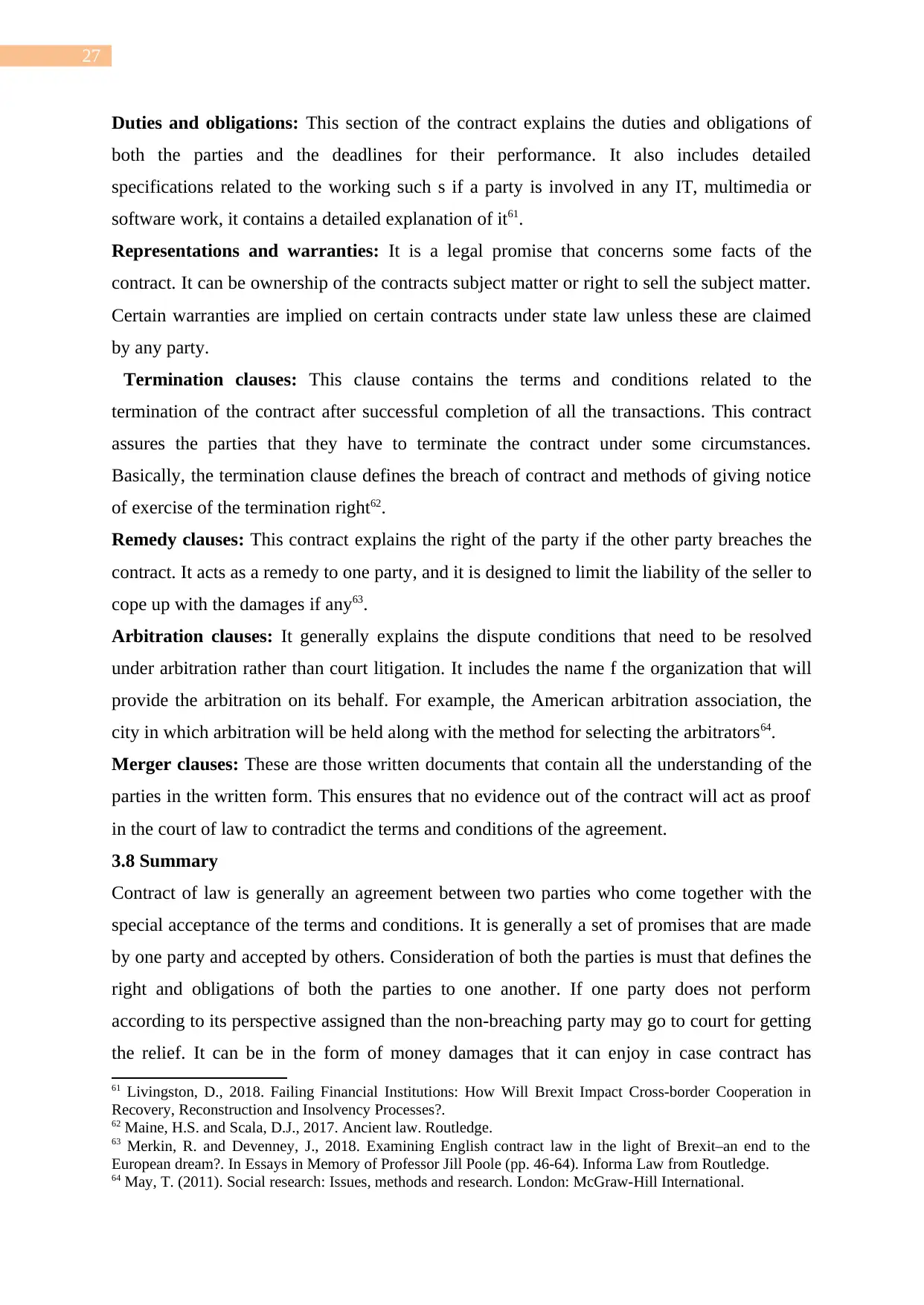
Duties and obligations: This section of the contract explains the duties and obligations of
both the parties and the deadlines for their performance. It also includes detailed
specifications related to the working such s if a party is involved in any IT, multimedia or
software work, it contains a detailed explanation of it61.
Representations and warranties: It is a legal promise that concerns some facts of the
contract. It can be ownership of the contracts subject matter or right to sell the subject matter.
Certain warranties are implied on certain contracts under state law unless these are claimed
by any party.
Termination clauses: This clause contains the terms and conditions related to the
termination of the contract after successful completion of all the transactions. This contract
assures the parties that they have to terminate the contract under some circumstances.
Basically, the termination clause defines the breach of contract and methods of giving notice
of exercise of the termination right62.
Remedy clauses: This contract explains the right of the party if the other party breaches the
contract. It acts as a remedy to one party, and it is designed to limit the liability of the seller to
cope up with the damages if any63.
Arbitration clauses: It generally explains the dispute conditions that need to be resolved
under arbitration rather than court litigation. It includes the name f the organization that will
provide the arbitration on its behalf. For example, the American arbitration association, the
city in which arbitration will be held along with the method for selecting the arbitrators64.
Merger clauses: These are those written documents that contain all the understanding of the
parties in the written form. This ensures that no evidence out of the contract will act as proof
in the court of law to contradict the terms and conditions of the agreement.
3.8 Summary
Contract of law is generally an agreement between two parties who come together with the
special acceptance of the terms and conditions. It is generally a set of promises that are made
by one party and accepted by others. Consideration of both the parties is must that defines the
right and obligations of both the parties to one another. If one party does not perform
according to its perspective assigned than the non-breaching party may go to court for getting
the relief. It can be in the form of money damages that it can enjoy in case contract has
61 Livingston, D., 2018. Failing Financial Institutions: How Will Brexit Impact Cross-border Cooperation in
Recovery, Reconstruction and Insolvency Processes?.
62 Maine, H.S. and Scala, D.J., 2017. Ancient law. Routledge.
63 Merkin, R. and Devenney, J., 2018. Examining English contract law in the light of Brexit–an end to the
European dream?. In Essays in Memory of Professor Jill Poole (pp. 46-64). Informa Law from Routledge.
64 May, T. (2011). Social research: Issues, methods and research. London: McGraw-Hill International.
⊘ This is a preview!⊘
Do you want full access?
Subscribe today to unlock all pages.

Trusted by 1+ million students worldwide
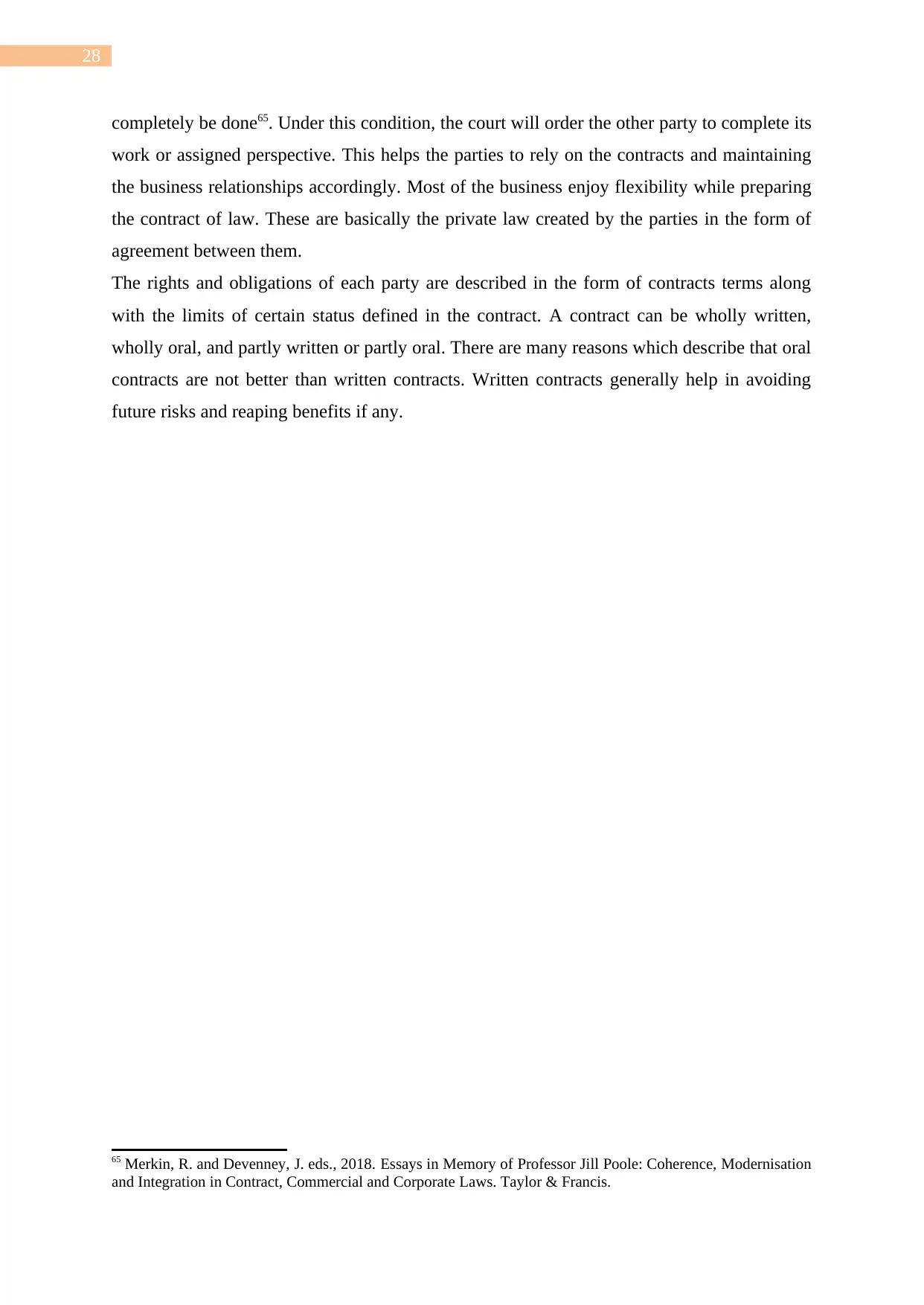
completely be done65. Under this condition, the court will order the other party to complete its
work or assigned perspective. This helps the parties to rely on the contracts and maintaining
the business relationships accordingly. Most of the business enjoy flexibility while preparing
the contract of law. These are basically the private law created by the parties in the form of
agreement between them.
The rights and obligations of each party are described in the form of contracts terms along
with the limits of certain status defined in the contract. A contract can be wholly written,
wholly oral, and partly written or partly oral. There are many reasons which describe that oral
contracts are not better than written contracts. Written contracts generally help in avoiding
future risks and reaping benefits if any.
65 Merkin, R. and Devenney, J. eds., 2018. Essays in Memory of Professor Jill Poole: Coherence, Modernisation
and Integration in Contract, Commercial and Corporate Laws. Taylor & Francis.
Paraphrase This Document
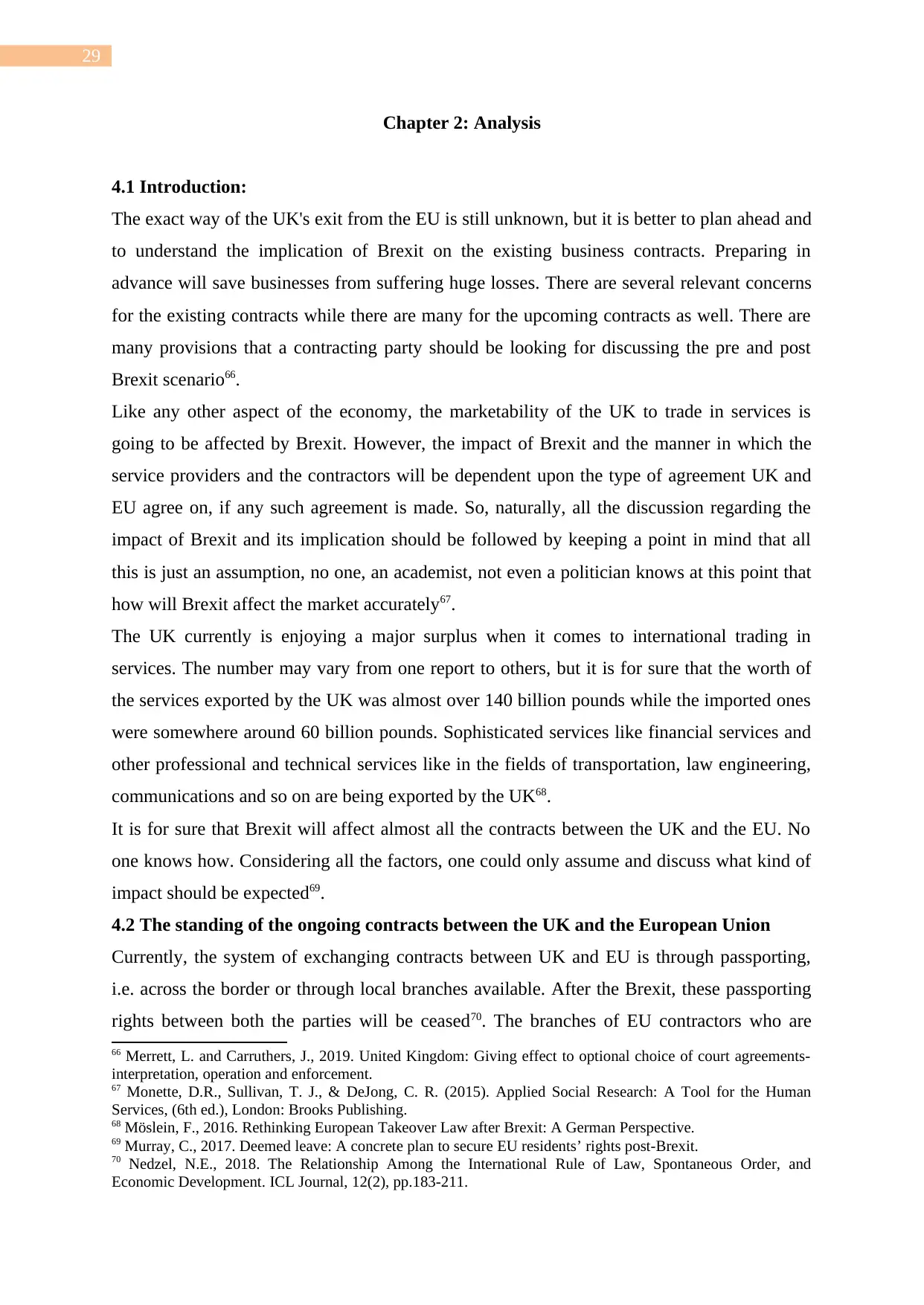
Chapter 2: Analysis
4.1 Introduction:
The exact way of the UK's exit from the EU is still unknown, but it is better to plan ahead and
to understand the implication of Brexit on the existing business contracts. Preparing in
advance will save businesses from suffering huge losses. There are several relevant concerns
for the existing contracts while there are many for the upcoming contracts as well. There are
many provisions that a contracting party should be looking for discussing the pre and post
Brexit scenario66.
Like any other aspect of the economy, the marketability of the UK to trade in services is
going to be affected by Brexit. However, the impact of Brexit and the manner in which the
service providers and the contractors will be dependent upon the type of agreement UK and
EU agree on, if any such agreement is made. So, naturally, all the discussion regarding the
impact of Brexit and its implication should be followed by keeping a point in mind that all
this is just an assumption, no one, an academist, not even a politician knows at this point that
how will Brexit affect the market accurately67.
The UK currently is enjoying a major surplus when it comes to international trading in
services. The number may vary from one report to others, but it is for sure that the worth of
the services exported by the UK was almost over 140 billion pounds while the imported ones
were somewhere around 60 billion pounds. Sophisticated services like financial services and
other professional and technical services like in the fields of transportation, law engineering,
communications and so on are being exported by the UK68.
It is for sure that Brexit will affect almost all the contracts between the UK and the EU. No
one knows how. Considering all the factors, one could only assume and discuss what kind of
impact should be expected69.
4.2 The standing of the ongoing contracts between the UK and the European Union
Currently, the system of exchanging contracts between UK and EU is through passporting,
i.e. across the border or through local branches available. After the Brexit, these passporting
rights between both the parties will be ceased70. The branches of EU contractors who are
66 Merrett, L. and Carruthers, J., 2019. United Kingdom: Giving effect to optional choice of court agreements-
interpretation, operation and enforcement.
67 Monette, D.R., Sullivan, T. J., & DeJong, C. R. (2015). Applied Social Research: A Tool for the Human
Services, (6th ed.), London: Brooks Publishing.
68 Möslein, F., 2016. Rethinking European Takeover Law after Brexit: A German Perspective.
69 Murray, C., 2017. Deemed leave: A concrete plan to secure EU residents’ rights post-Brexit.
70 Nedzel, N.E., 2018. The Relationship Among the International Rule of Law, Spontaneous Order, and
Economic Development. ICL Journal, 12(2), pp.183-211.
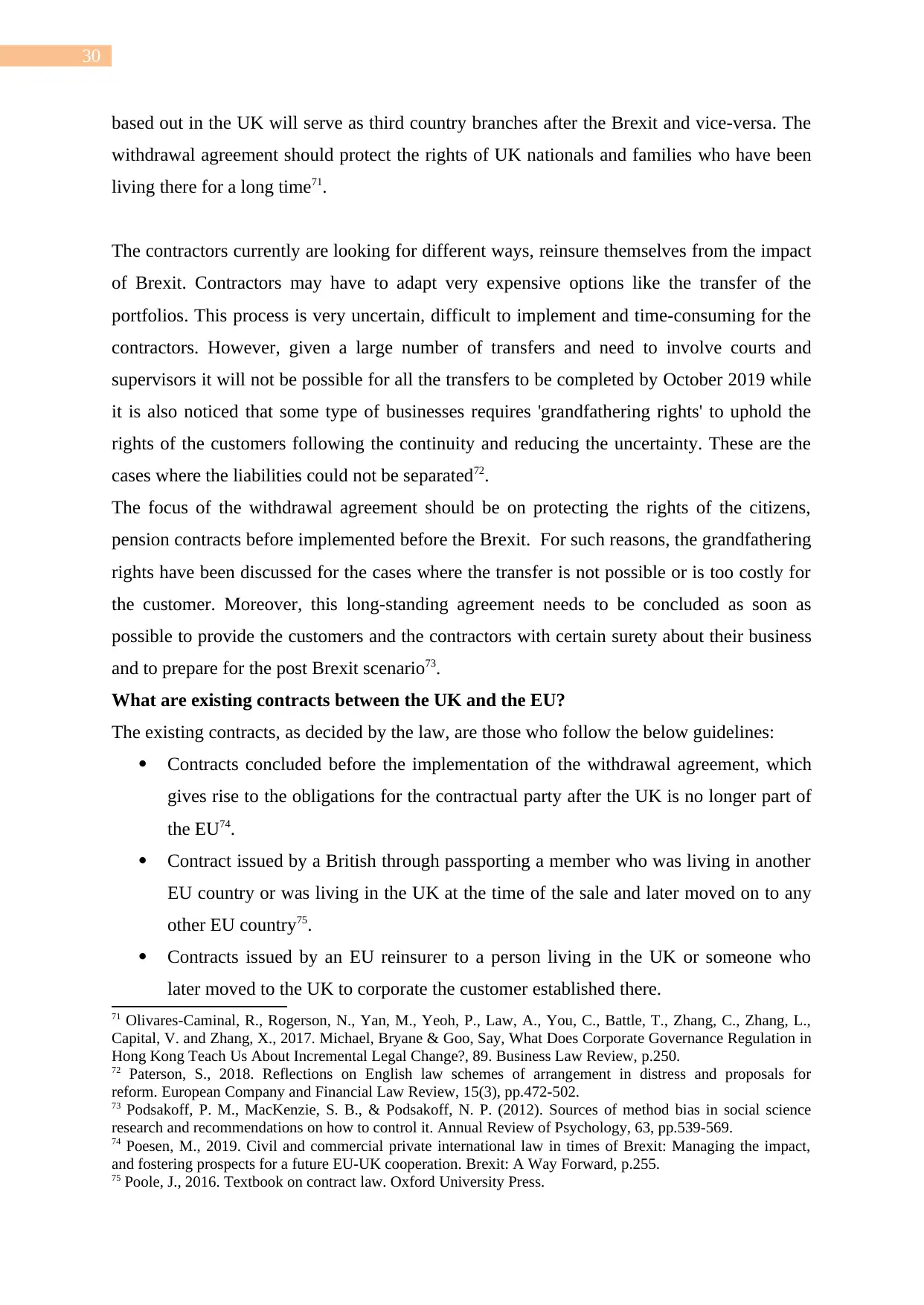
based out in the UK will serve as third country branches after the Brexit and vice-versa. The
withdrawal agreement should protect the rights of UK nationals and families who have been
living there for a long time71.
The contractors currently are looking for different ways, reinsure themselves from the impact
of Brexit. Contractors may have to adapt very expensive options like the transfer of the
portfolios. This process is very uncertain, difficult to implement and time-consuming for the
contractors. However, given a large number of transfers and need to involve courts and
supervisors it will not be possible for all the transfers to be completed by October 2019 while
it is also noticed that some type of businesses requires 'grandfathering rights' to uphold the
rights of the customers following the continuity and reducing the uncertainty. These are the
cases where the liabilities could not be separated72.
The focus of the withdrawal agreement should be on protecting the rights of the citizens,
pension contracts before implemented before the Brexit. For such reasons, the grandfathering
rights have been discussed for the cases where the transfer is not possible or is too costly for
the customer. Moreover, this long-standing agreement needs to be concluded as soon as
possible to provide the customers and the contractors with certain surety about their business
and to prepare for the post Brexit scenario73.
What are existing contracts between the UK and the EU?
The existing contracts, as decided by the law, are those who follow the below guidelines:
Contracts concluded before the implementation of the withdrawal agreement, which
gives rise to the obligations for the contractual party after the UK is no longer part of
the EU74.
Contract issued by a British through passporting a member who was living in another
EU country or was living in the UK at the time of the sale and later moved on to any
other EU country75.
Contracts issued by an EU reinsurer to a person living in the UK or someone who
later moved to the UK to corporate the customer established there.
71 Olivares-Caminal, R., Rogerson, N., Yan, M., Yeoh, P., Law, A., You, C., Battle, T., Zhang, C., Zhang, L.,
Capital, V. and Zhang, X., 2017. Michael, Bryane & Goo, Say, What Does Corporate Governance Regulation in
Hong Kong Teach Us About Incremental Legal Change?, 89. Business Law Review, p.250.
72 Paterson, S., 2018. Reflections on English law schemes of arrangement in distress and proposals for
reform. European Company and Financial Law Review, 15(3), pp.472-502.
73 Podsakoff, P. M., MacKenzie, S. B., & Podsakoff, N. P. (2012). Sources of method bias in social science
research and recommendations on how to control it. Annual Review of Psychology, 63, pp.539-569.
74 Poesen, M., 2019. Civil and commercial private international law in times of Brexit: Managing the impact,
and fostering prospects for a future EU-UK cooperation. Brexit: A Way Forward, p.255.
75 Poole, J., 2016. Textbook on contract law. Oxford University Press.
⊘ This is a preview!⊘
Do you want full access?
Subscribe today to unlock all pages.

Trusted by 1+ million students worldwide
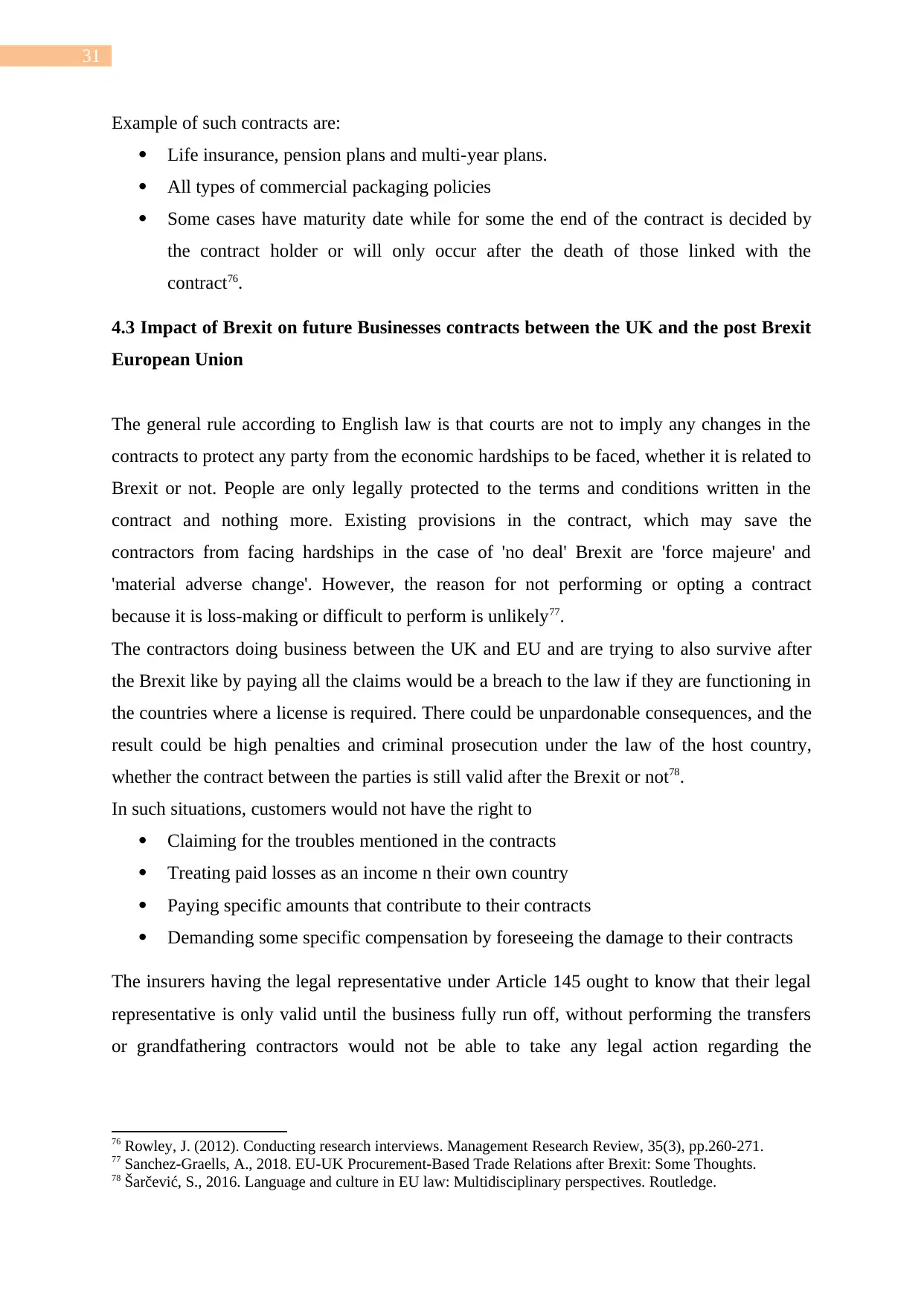
Example of such contracts are:
Life insurance, pension plans and multi-year plans.
All types of commercial packaging policies
Some cases have maturity date while for some the end of the contract is decided by
the contract holder or will only occur after the death of those linked with the
contract76.
4.3 Impact of Brexit on future Businesses contracts between the UK and the post Brexit
European Union
The general rule according to English law is that courts are not to imply any changes in the
contracts to protect any party from the economic hardships to be faced, whether it is related to
Brexit or not. People are only legally protected to the terms and conditions written in the
contract and nothing more. Existing provisions in the contract, which may save the
contractors from facing hardships in the case of 'no deal' Brexit are 'force majeure' and
'material adverse change'. However, the reason for not performing or opting a contract
because it is loss-making or difficult to perform is unlikely77.
The contractors doing business between the UK and EU and are trying to also survive after
the Brexit like by paying all the claims would be a breach to the law if they are functioning in
the countries where a license is required. There could be unpardonable consequences, and the
result could be high penalties and criminal prosecution under the law of the host country,
whether the contract between the parties is still valid after the Brexit or not78.
In such situations, customers would not have the right to
Claiming for the troubles mentioned in the contracts
Treating paid losses as an income n their own country
Paying specific amounts that contribute to their contracts
Demanding some specific compensation by foreseeing the damage to their contracts
The insurers having the legal representative under Article 145 ought to know that their legal
representative is only valid until the business fully run off, without performing the transfers
or grandfathering contractors would not be able to take any legal action regarding the
76 Rowley, J. (2012). Conducting research interviews. Management Research Review, 35(3), pp.260-271.
77 Sanchez-Graells, A., 2018. EU-UK Procurement-Based Trade Relations after Brexit: Some Thoughts.
78 Šarčević, S., 2016. Language and culture in EU law: Multidisciplinary perspectives. Routledge.
Paraphrase This Document
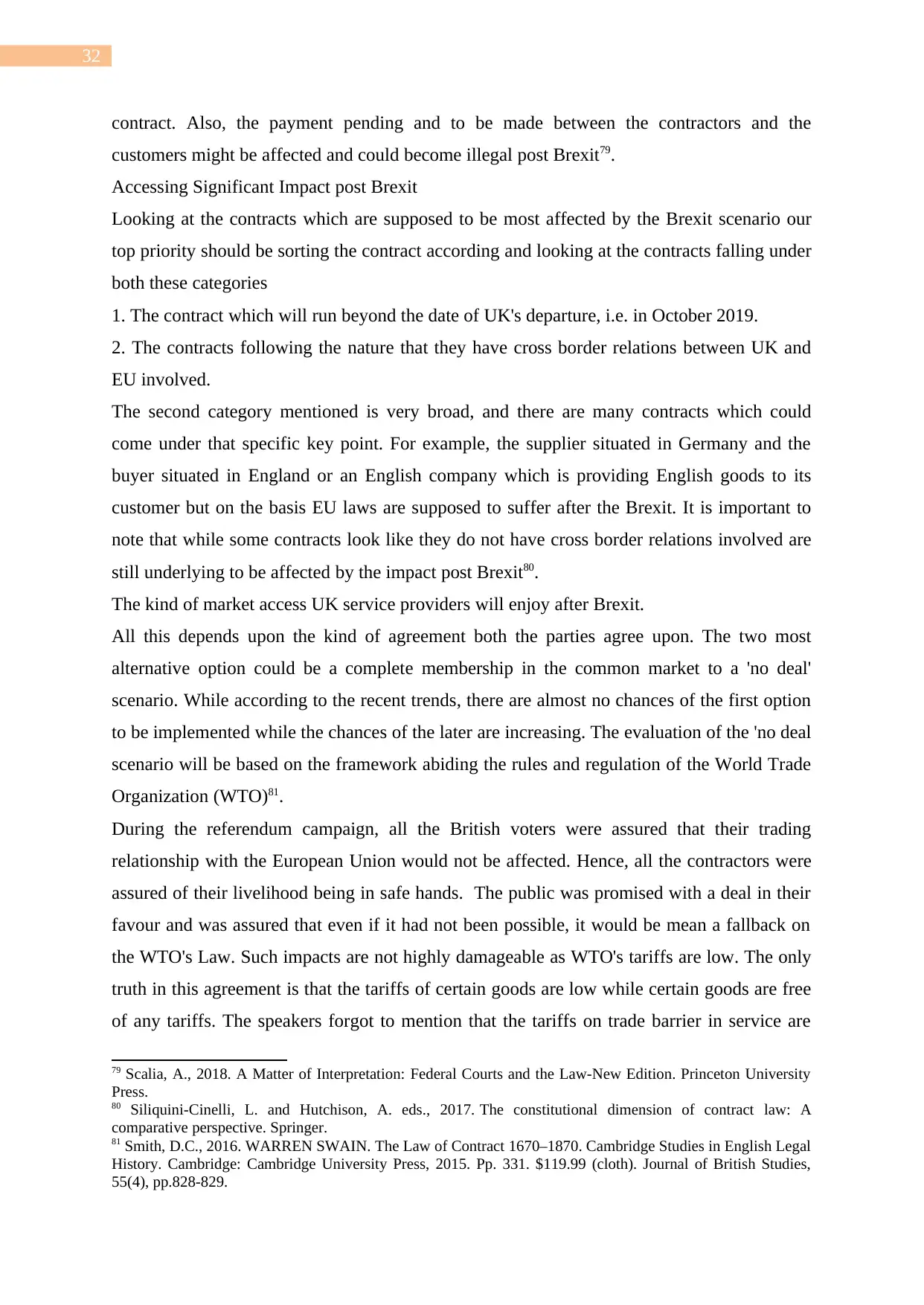
contract. Also, the payment pending and to be made between the contractors and the
customers might be affected and could become illegal post Brexit79.
Accessing Significant Impact post Brexit
Looking at the contracts which are supposed to be most affected by the Brexit scenario our
top priority should be sorting the contract according and looking at the contracts falling under
both these categories
1. The contract which will run beyond the date of UK's departure, i.e. in October 2019.
2. The contracts following the nature that they have cross border relations between UK and
EU involved.
The second category mentioned is very broad, and there are many contracts which could
come under that specific key point. For example, the supplier situated in Germany and the
buyer situated in England or an English company which is providing English goods to its
customer but on the basis EU laws are supposed to suffer after the Brexit. It is important to
note that while some contracts look like they do not have cross border relations involved are
still underlying to be affected by the impact post Brexit80.
The kind of market access UK service providers will enjoy after Brexit.
All this depends upon the kind of agreement both the parties agree upon. The two most
alternative option could be a complete membership in the common market to a 'no deal'
scenario. While according to the recent trends, there are almost no chances of the first option
to be implemented while the chances of the later are increasing. The evaluation of the 'no deal
scenario will be based on the framework abiding the rules and regulation of the World Trade
Organization (WTO)81.
During the referendum campaign, all the British voters were assured that their trading
relationship with the European Union would not be affected. Hence, all the contractors were
assured of their livelihood being in safe hands. The public was promised with a deal in their
favour and was assured that even if it had not been possible, it would be mean a fallback on
the WTO's Law. Such impacts are not highly damageable as WTO's tariffs are low. The only
truth in this agreement is that the tariffs of certain goods are low while certain goods are free
of any tariffs. The speakers forgot to mention that the tariffs on trade barrier in service are
79 Scalia, A., 2018. A Matter of Interpretation: Federal Courts and the Law-New Edition. Princeton University
Press.
80 Siliquini-Cinelli, L. and Hutchison, A. eds., 2017. The constitutional dimension of contract law: A
comparative perspective. Springer.
81 Smith, D.C., 2016. WARREN SWAIN. The Law of Contract 1670–1870. Cambridge Studies in English Legal
History. Cambridge: Cambridge University Press, 2015. Pp. 331. $119.99 (cloth). Journal of British Studies,
55(4), pp.828-829.
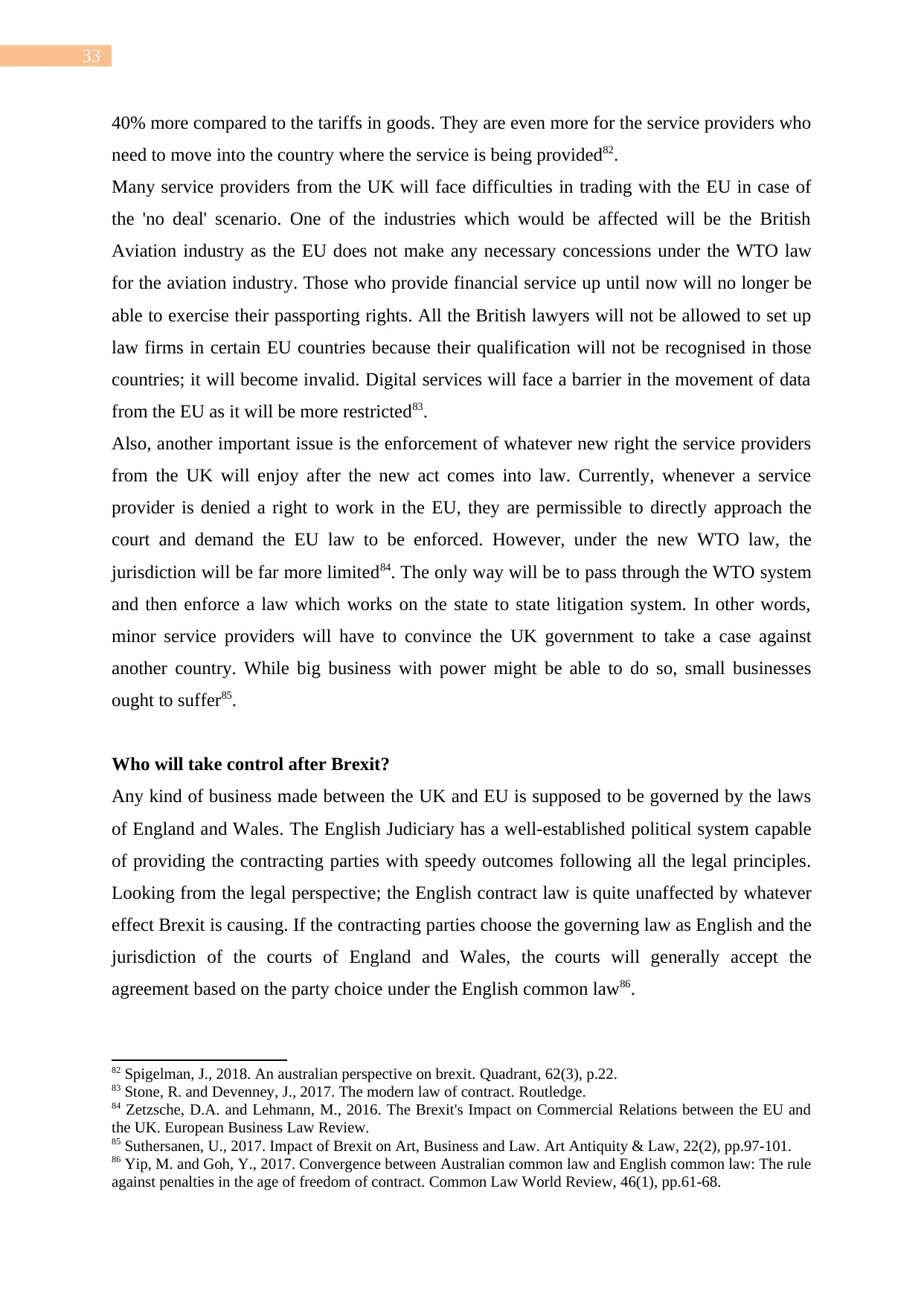
40% more compared to the tariffs in goods. They are even more for the service providers who
need to move into the country where the service is being provided82.
Many service providers from the UK will face difficulties in trading with the EU in case of
the 'no deal' scenario. One of the industries which would be affected will be the British
Aviation industry as the EU does not make any necessary concessions under the WTO law
for the aviation industry. Those who provide financial service up until now will no longer be
able to exercise their passporting rights. All the British lawyers will not be allowed to set up
law firms in certain EU countries because their qualification will not be recognised in those
countries; it will become invalid. Digital services will face a barrier in the movement of data
from the EU as it will be more restricted83.
Also, another important issue is the enforcement of whatever new right the service providers
from the UK will enjoy after the new act comes into law. Currently, whenever a service
provider is denied a right to work in the EU, they are permissible to directly approach the
court and demand the EU law to be enforced. However, under the new WTO law, the
jurisdiction will be far more limited84. The only way will be to pass through the WTO system
and then enforce a law which works on the state to state litigation system. In other words,
minor service providers will have to convince the UK government to take a case against
another country. While big business with power might be able to do so, small businesses
ought to suffer85.
Who will take control after Brexit?
Any kind of business made between the UK and EU is supposed to be governed by the laws
of England and Wales. The English Judiciary has a well-established political system capable
of providing the contracting parties with speedy outcomes following all the legal principles.
Looking from the legal perspective; the English contract law is quite unaffected by whatever
effect Brexit is causing. If the contracting parties choose the governing law as English and the
jurisdiction of the courts of England and Wales, the courts will generally accept the
agreement based on the party choice under the English common law86.
82 Spigelman, J., 2018. An australian perspective on brexit. Quadrant, 62(3), p.22.
83 Stone, R. and Devenney, J., 2017. The modern law of contract. Routledge.
84 Zetzsche, D.A. and Lehmann, M., 2016. The Brexit's Impact on Commercial Relations between the EU and
the UK. European Business Law Review.
85 Suthersanen, U., 2017. Impact of Brexit on Art, Business and Law. Art Antiquity & Law, 22(2), pp.97-101.
86 Yip, M. and Goh, Y., 2017. Convergence between Australian common law and English common law: The rule
against penalties in the age of freedom of contract. Common Law World Review, 46(1), pp.61-68.
⊘ This is a preview!⊘
Do you want full access?
Subscribe today to unlock all pages.

Trusted by 1+ million students worldwide
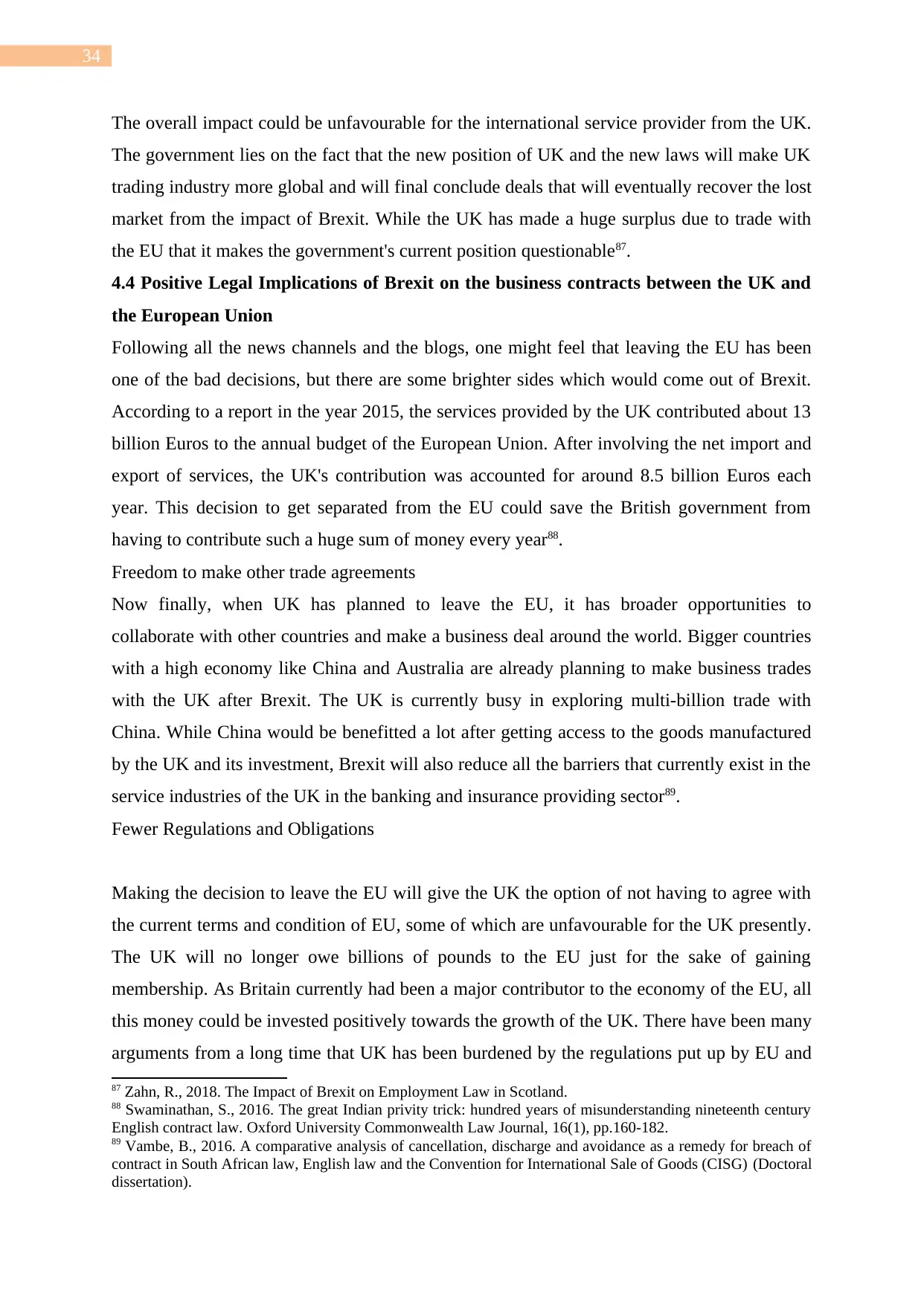
The overall impact could be unfavourable for the international service provider from the UK.
The government lies on the fact that the new position of UK and the new laws will make UK
trading industry more global and will final conclude deals that will eventually recover the lost
market from the impact of Brexit. While the UK has made a huge surplus due to trade with
the EU that it makes the government's current position questionable87.
4.4 Positive Legal Implications of Brexit on the business contracts between the UK and
the European Union
Following all the news channels and the blogs, one might feel that leaving the EU has been
one of the bad decisions, but there are some brighter sides which would come out of Brexit.
According to a report in the year 2015, the services provided by the UK contributed about 13
billion Euros to the annual budget of the European Union. After involving the net import and
export of services, the UK's contribution was accounted for around 8.5 billion Euros each
year. This decision to get separated from the EU could save the British government from
having to contribute such a huge sum of money every year88.
Freedom to make other trade agreements
Now finally, when UK has planned to leave the EU, it has broader opportunities to
collaborate with other countries and make a business deal around the world. Bigger countries
with a high economy like China and Australia are already planning to make business trades
with the UK after Brexit. The UK is currently busy in exploring multi-billion trade with
China. While China would be benefitted a lot after getting access to the goods manufactured
by the UK and its investment, Brexit will also reduce all the barriers that currently exist in the
service industries of the UK in the banking and insurance providing sector89.
Fewer Regulations and Obligations
Making the decision to leave the EU will give the UK the option of not having to agree with
the current terms and condition of EU, some of which are unfavourable for the UK presently.
The UK will no longer owe billions of pounds to the EU just for the sake of gaining
membership. As Britain currently had been a major contributor to the economy of the EU, all
this money could be invested positively towards the growth of the UK. There have been many
arguments from a long time that UK has been burdened by the regulations put up by EU and
87 Zahn, R., 2018. The Impact of Brexit on Employment Law in Scotland.
88 Swaminathan, S., 2016. The great Indian privity trick: hundred years of misunderstanding nineteenth century
English contract law. Oxford University Commonwealth Law Journal, 16(1), pp.160-182.
89 Vambe, B., 2016. A comparative analysis of cancellation, discharge and avoidance as a remedy for breach of
contract in South African law, English law and the Convention for International Sale of Goods (CISG) (Doctoral
dissertation).
Paraphrase This Document
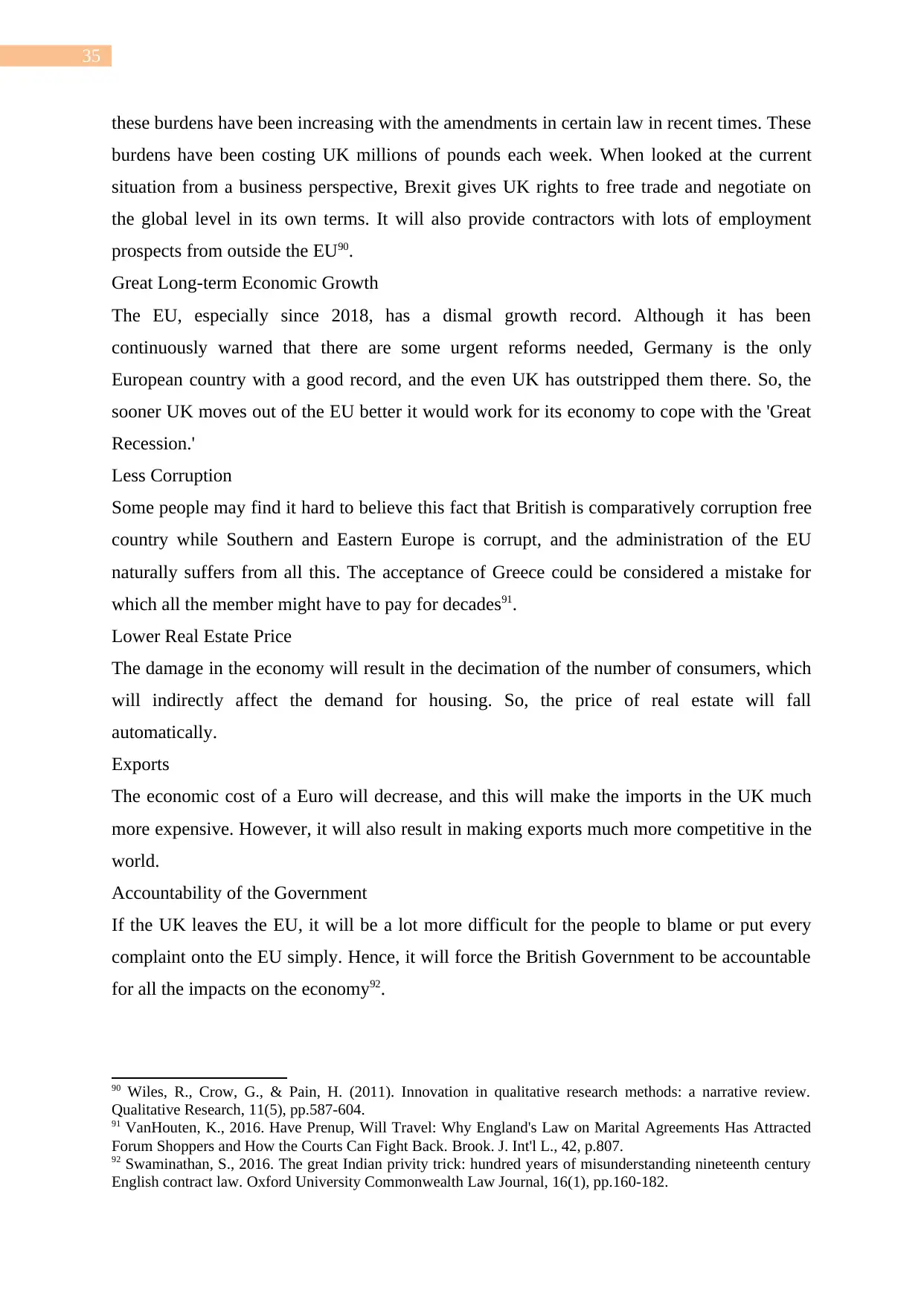
these burdens have been increasing with the amendments in certain law in recent times. These
burdens have been costing UK millions of pounds each week. When looked at the current
situation from a business perspective, Brexit gives UK rights to free trade and negotiate on
the global level in its own terms. It will also provide contractors with lots of employment
prospects from outside the EU90.
Great Long-term Economic Growth
The EU, especially since 2018, has a dismal growth record. Although it has been
continuously warned that there are some urgent reforms needed, Germany is the only
European country with a good record, and the even UK has outstripped them there. So, the
sooner UK moves out of the EU better it would work for its economy to cope with the 'Great
Recession.'
Less Corruption
Some people may find it hard to believe this fact that British is comparatively corruption free
country while Southern and Eastern Europe is corrupt, and the administration of the EU
naturally suffers from all this. The acceptance of Greece could be considered a mistake for
which all the member might have to pay for decades91.
Lower Real Estate Price
The damage in the economy will result in the decimation of the number of consumers, which
will indirectly affect the demand for housing. So, the price of real estate will fall
automatically.
Exports
The economic cost of a Euro will decrease, and this will make the imports in the UK much
more expensive. However, it will also result in making exports much more competitive in the
world.
Accountability of the Government
If the UK leaves the EU, it will be a lot more difficult for the people to blame or put every
complaint onto the EU simply. Hence, it will force the British Government to be accountable
for all the impacts on the economy92.
90 Wiles, R., Crow, G., & Pain, H. (2011). Innovation in qualitative research methods: a narrative review.
Qualitative Research, 11(5), pp.587-604.
91 VanHouten, K., 2016. Have Prenup, Will Travel: Why England's Law on Marital Agreements Has Attracted
Forum Shoppers and How the Courts Can Fight Back. Brook. J. Int'l L., 42, p.807.
92 Swaminathan, S., 2016. The great Indian privity trick: hundred years of misunderstanding nineteenth century
English contract law. Oxford University Commonwealth Law Journal, 16(1), pp.160-182.
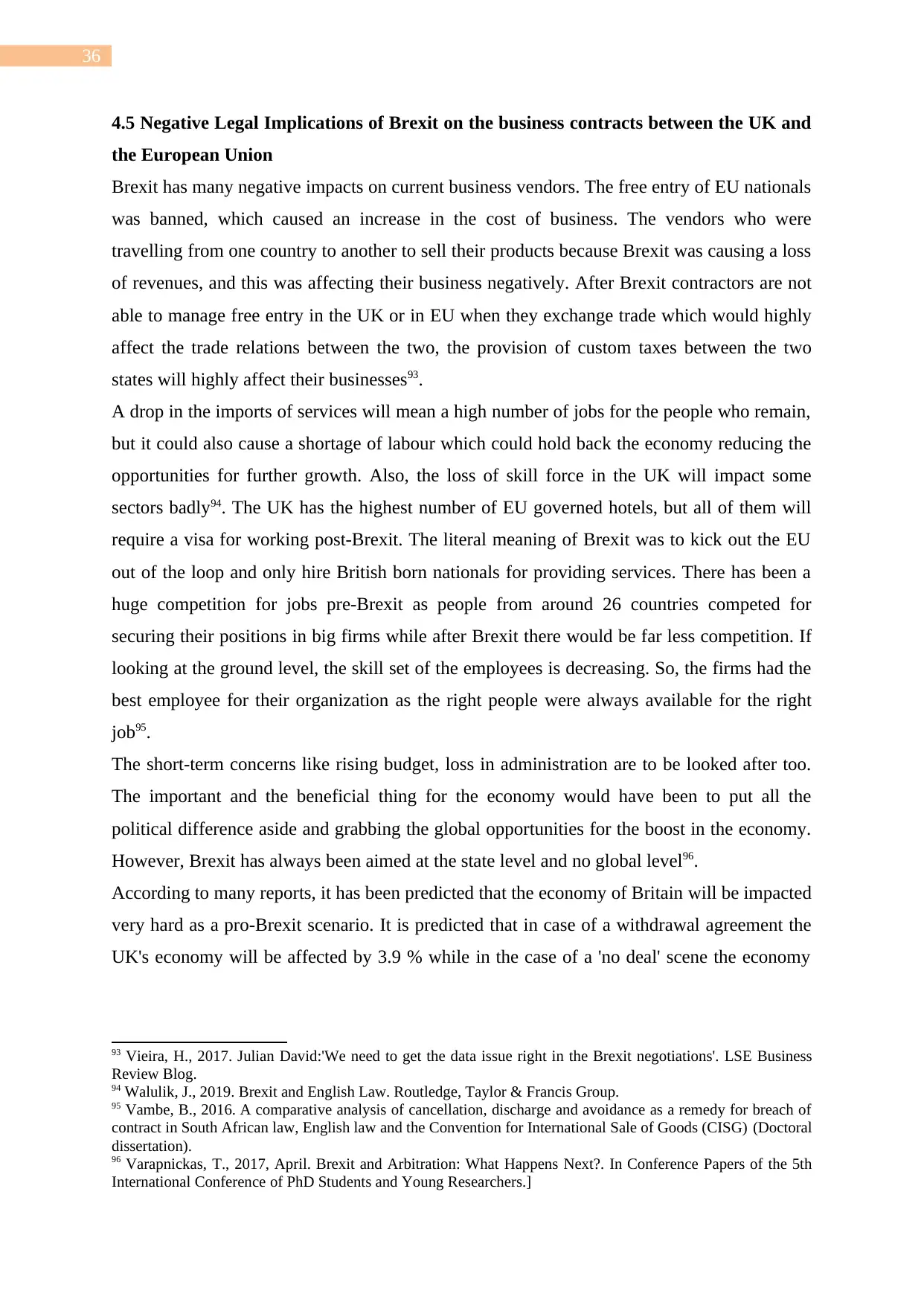
4.5 Negative Legal Implications of Brexit on the business contracts between the UK and
the European Union
Brexit has many negative impacts on current business vendors. The free entry of EU nationals
was banned, which caused an increase in the cost of business. The vendors who were
travelling from one country to another to sell their products because Brexit was causing a loss
of revenues, and this was affecting their business negatively. After Brexit contractors are not
able to manage free entry in the UK or in EU when they exchange trade which would highly
affect the trade relations between the two, the provision of custom taxes between the two
states will highly affect their businesses93.
A drop in the imports of services will mean a high number of jobs for the people who remain,
but it could also cause a shortage of labour which could hold back the economy reducing the
opportunities for further growth. Also, the loss of skill force in the UK will impact some
sectors badly94. The UK has the highest number of EU governed hotels, but all of them will
require a visa for working post-Brexit. The literal meaning of Brexit was to kick out the EU
out of the loop and only hire British born nationals for providing services. There has been a
huge competition for jobs pre-Brexit as people from around 26 countries competed for
securing their positions in big firms while after Brexit there would be far less competition. If
looking at the ground level, the skill set of the employees is decreasing. So, the firms had the
best employee for their organization as the right people were always available for the right
job95.
The short-term concerns like rising budget, loss in administration are to be looked after too.
The important and the beneficial thing for the economy would have been to put all the
political difference aside and grabbing the global opportunities for the boost in the economy.
However, Brexit has always been aimed at the state level and no global level96.
According to many reports, it has been predicted that the economy of Britain will be impacted
very hard as a pro-Brexit scenario. It is predicted that in case of a withdrawal agreement the
UK's economy will be affected by 3.9 % while in the case of a 'no deal' scene the economy
93 Vieira, H., 2017. Julian David:'We need to get the data issue right in the Brexit negotiations'. LSE Business
Review Blog.
94 Walulik, J., 2019. Brexit and English Law. Routledge, Taylor & Francis Group.
95 Vambe, B., 2016. A comparative analysis of cancellation, discharge and avoidance as a remedy for breach of
contract in South African law, English law and the Convention for International Sale of Goods (CISG) (Doctoral
dissertation).
96 Varapnickas, T., 2017, April. Brexit and Arbitration: What Happens Next?. In Conference Papers of the 5th
International Conference of PhD Students and Young Researchers.]
⊘ This is a preview!⊘
Do you want full access?
Subscribe today to unlock all pages.

Trusted by 1+ million students worldwide
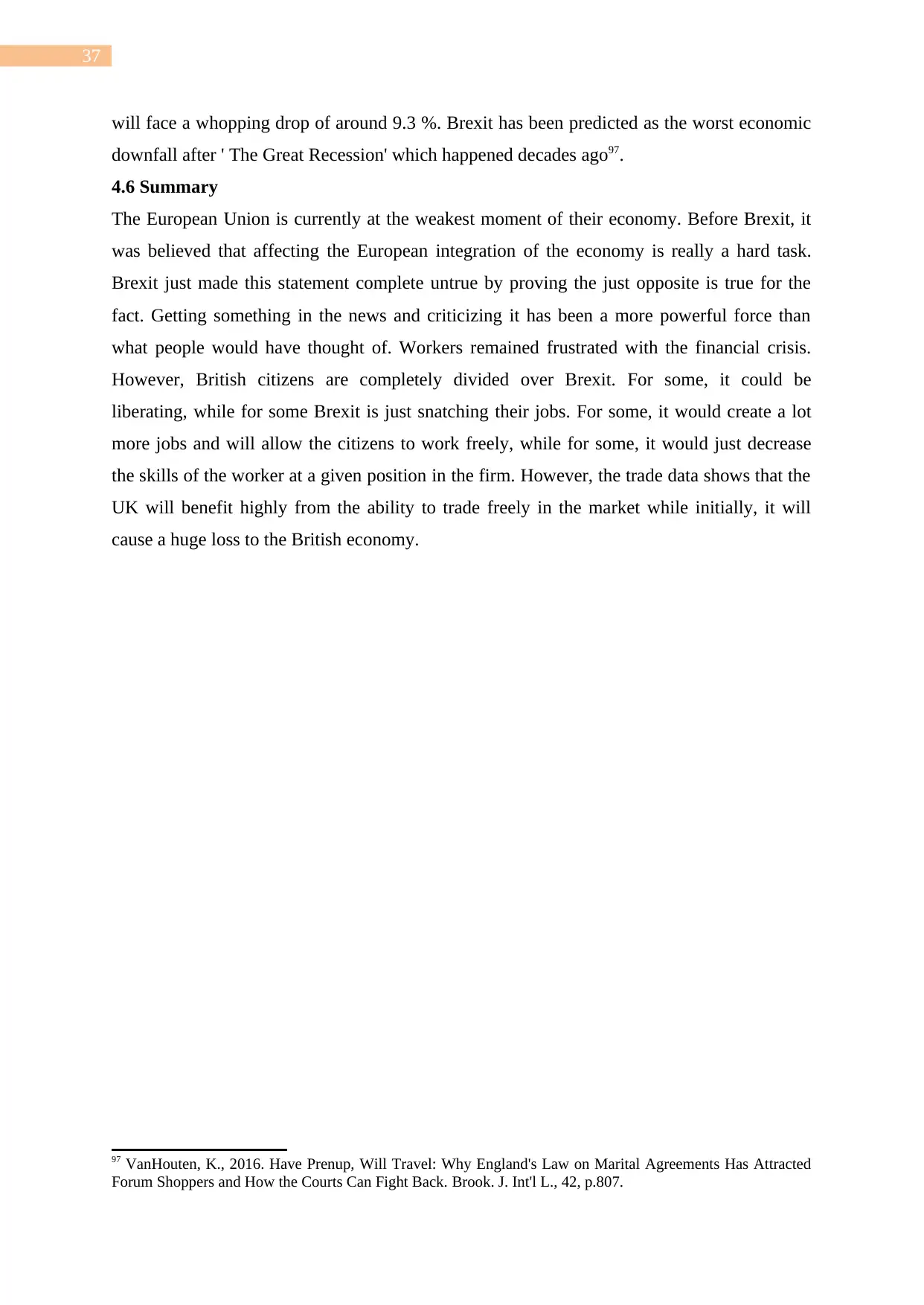
will face a whopping drop of around 9.3 %. Brexit has been predicted as the worst economic
downfall after ' The Great Recession' which happened decades ago97.
4.6 Summary
The European Union is currently at the weakest moment of their economy. Before Brexit, it
was believed that affecting the European integration of the economy is really a hard task.
Brexit just made this statement complete untrue by proving the just opposite is true for the
fact. Getting something in the news and criticizing it has been a more powerful force than
what people would have thought of. Workers remained frustrated with the financial crisis.
However, British citizens are completely divided over Brexit. For some, it could be
liberating, while for some Brexit is just snatching their jobs. For some, it would create a lot
more jobs and will allow the citizens to work freely, while for some, it would just decrease
the skills of the worker at a given position in the firm. However, the trade data shows that the
UK will benefit highly from the ability to trade freely in the market while initially, it will
cause a huge loss to the British economy.
97 VanHouten, K., 2016. Have Prenup, Will Travel: Why England's Law on Marital Agreements Has Attracted
Forum Shoppers and How the Courts Can Fight Back. Brook. J. Int'l L., 42, p.807.
Paraphrase This Document
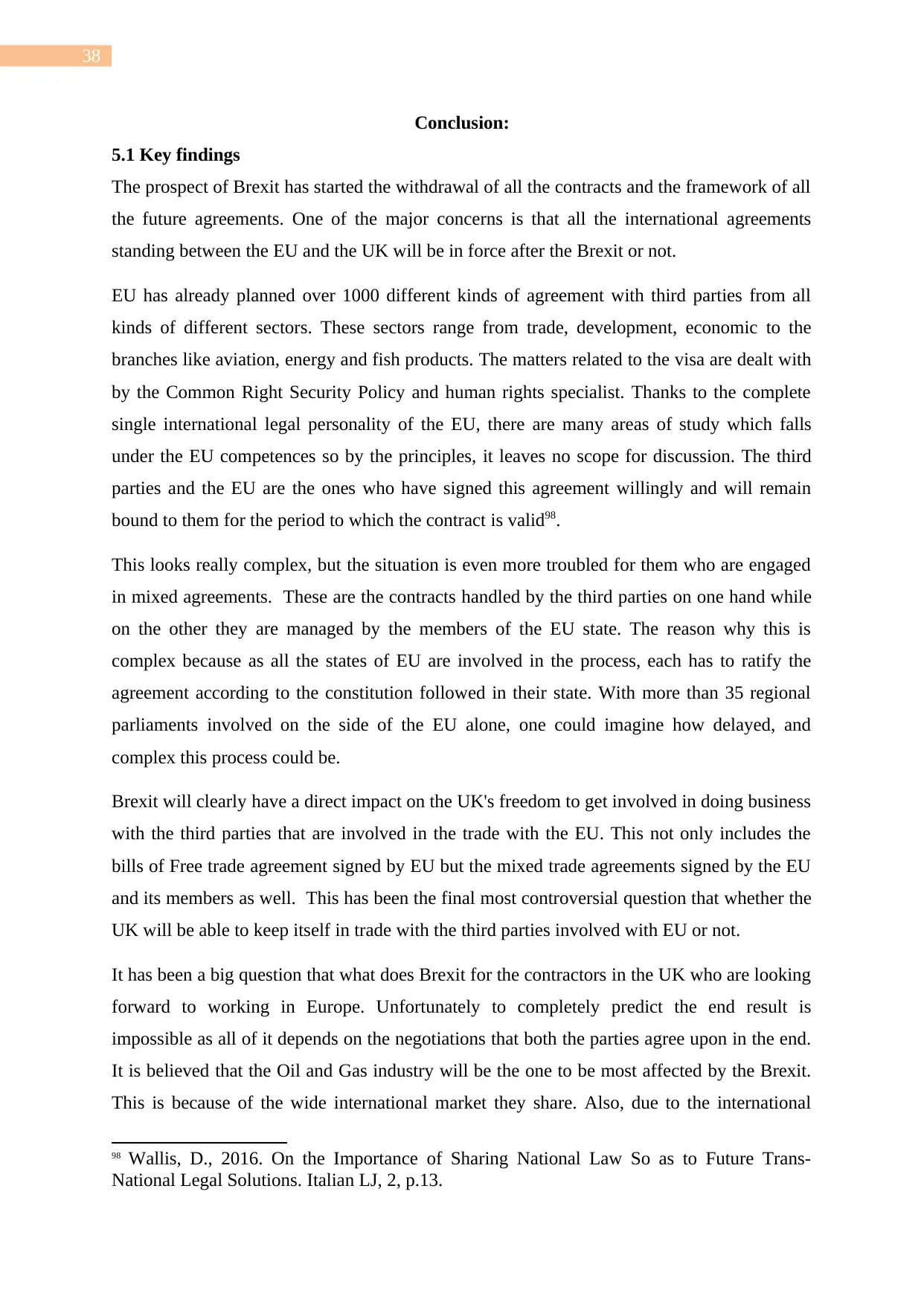
Conclusion:
5.1 Key findings
The prospect of Brexit has started the withdrawal of all the contracts and the framework of all
the future agreements. One of the major concerns is that all the international agreements
standing between the EU and the UK will be in force after the Brexit or not.
EU has already planned over 1000 different kinds of agreement with third parties from all
kinds of different sectors. These sectors range from trade, development, economic to the
branches like aviation, energy and fish products. The matters related to the visa are dealt with
by the Common Right Security Policy and human rights specialist. Thanks to the complete
single international legal personality of the EU, there are many areas of study which falls
under the EU competences so by the principles, it leaves no scope for discussion. The third
parties and the EU are the ones who have signed this agreement willingly and will remain
bound to them for the period to which the contract is valid98.
This looks really complex, but the situation is even more troubled for them who are engaged
in mixed agreements. These are the contracts handled by the third parties on one hand while
on the other they are managed by the members of the EU state. The reason why this is
complex because as all the states of EU are involved in the process, each has to ratify the
agreement according to the constitution followed in their state. With more than 35 regional
parliaments involved on the side of the EU alone, one could imagine how delayed, and
complex this process could be.
Brexit will clearly have a direct impact on the UK's freedom to get involved in doing business
with the third parties that are involved in the trade with the EU. This not only includes the
bills of Free trade agreement signed by EU but the mixed trade agreements signed by the EU
and its members as well. This has been the final most controversial question that whether the
UK will be able to keep itself in trade with the third parties involved with EU or not.
It has been a big question that what does Brexit for the contractors in the UK who are looking
forward to working in Europe. Unfortunately to completely predict the end result is
impossible as all of it depends on the negotiations that both the parties agree upon in the end.
It is believed that the Oil and Gas industry will be the one to be most affected by the Brexit.
This is because of the wide international market they share. Also, due to the international
98 Wallis, D., 2016. On the Importance of Sharing National Law So as to Future Trans-
National Legal Solutions. Italian LJ, 2, p.13.
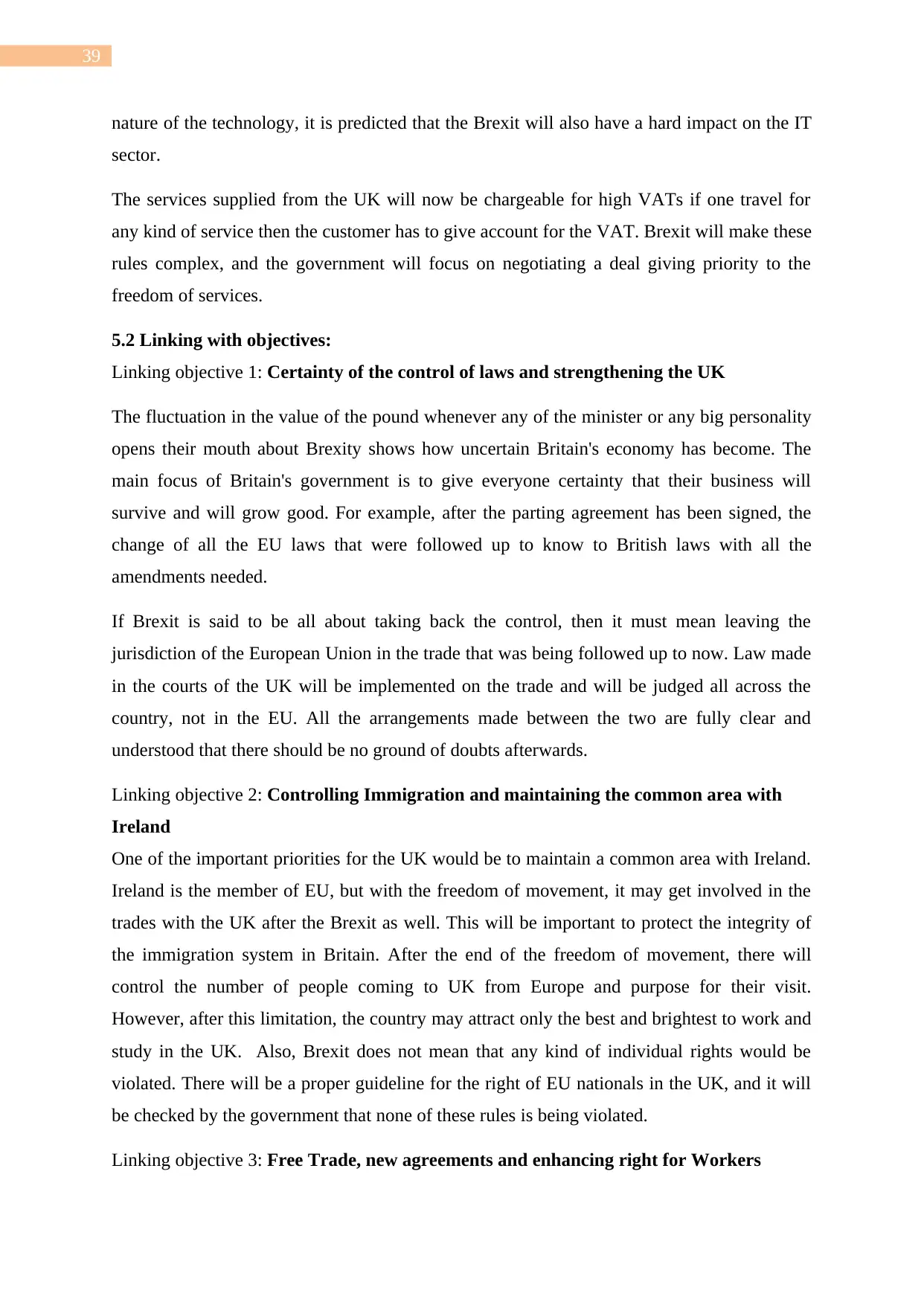
nature of the technology, it is predicted that the Brexit will also have a hard impact on the IT
sector.
The services supplied from the UK will now be chargeable for high VATs if one travel for
any kind of service then the customer has to give account for the VAT. Brexit will make these
rules complex, and the government will focus on negotiating a deal giving priority to the
freedom of services.
5.2 Linking with objectives:
Linking objective 1: Certainty of the control of laws and strengthening the UK
The fluctuation in the value of the pound whenever any of the minister or any big personality
opens their mouth about Brexity shows how uncertain Britain's economy has become. The
main focus of Britain's government is to give everyone certainty that their business will
survive and will grow good. For example, after the parting agreement has been signed, the
change of all the EU laws that were followed up to know to British laws with all the
amendments needed.
If Brexit is said to be all about taking back the control, then it must mean leaving the
jurisdiction of the European Union in the trade that was being followed up to now. Law made
in the courts of the UK will be implemented on the trade and will be judged all across the
country, not in the EU. All the arrangements made between the two are fully clear and
understood that there should be no ground of doubts afterwards.
Linking objective 2: Controlling Immigration and maintaining the common area with
Ireland
One of the important priorities for the UK would be to maintain a common area with Ireland.
Ireland is the member of EU, but with the freedom of movement, it may get involved in the
trades with the UK after the Brexit as well. This will be important to protect the integrity of
the immigration system in Britain. After the end of the freedom of movement, there will
control the number of people coming to UK from Europe and purpose for their visit.
However, after this limitation, the country may attract only the best and brightest to work and
study in the UK. Also, Brexit does not mean that any kind of individual rights would be
violated. There will be a proper guideline for the right of EU nationals in the UK, and it will
be checked by the government that none of these rules is being violated.
Linking objective 3: Free Trade, new agreements and enhancing right for Workers
⊘ This is a preview!⊘
Do you want full access?
Subscribe today to unlock all pages.

Trusted by 1+ million students worldwide
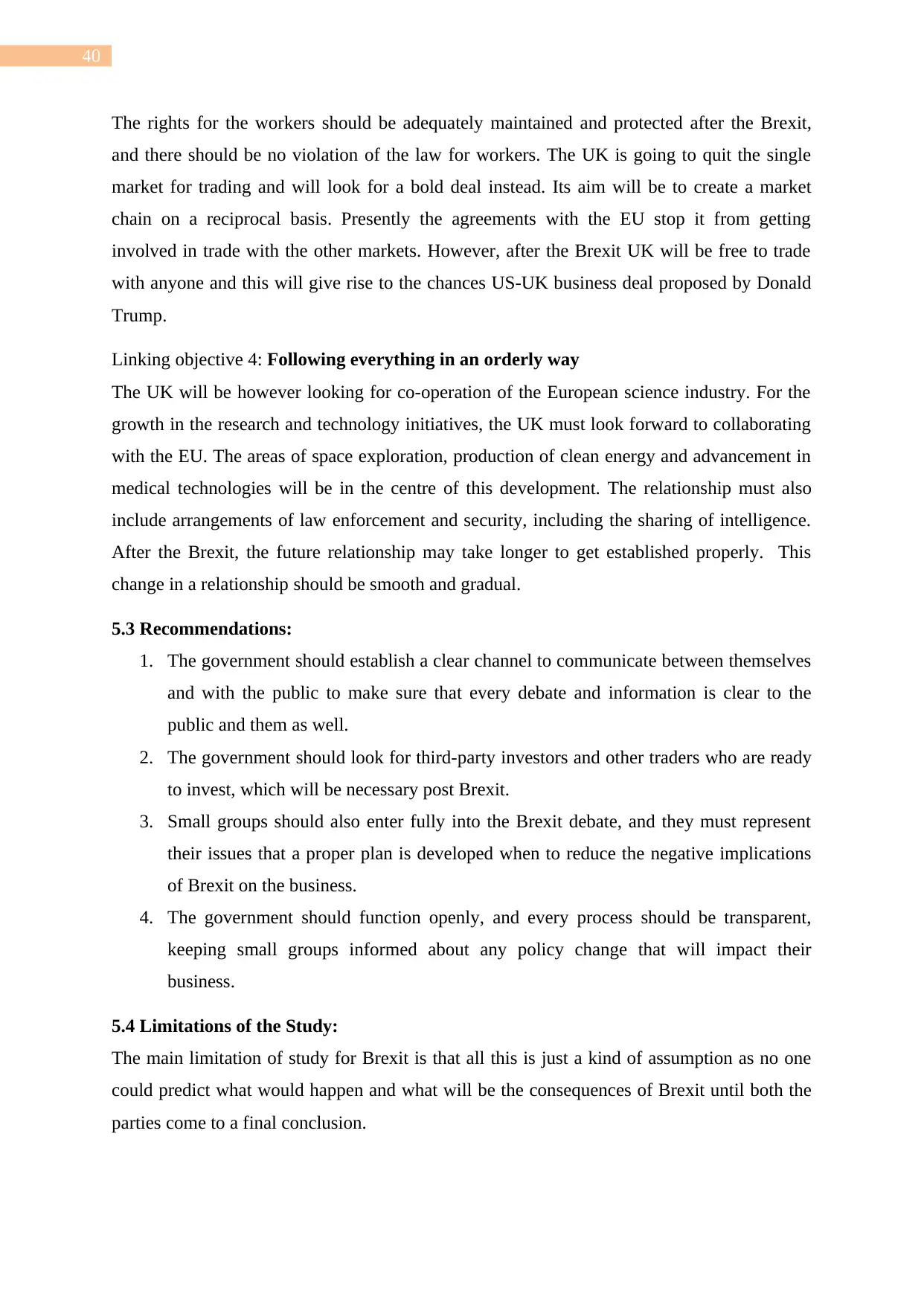
The rights for the workers should be adequately maintained and protected after the Brexit,
and there should be no violation of the law for workers. The UK is going to quit the single
market for trading and will look for a bold deal instead. Its aim will be to create a market
chain on a reciprocal basis. Presently the agreements with the EU stop it from getting
involved in trade with the other markets. However, after the Brexit UK will be free to trade
with anyone and this will give rise to the chances US-UK business deal proposed by Donald
Trump.
Linking objective 4: Following everything in an orderly way
The UK will be however looking for co-operation of the European science industry. For the
growth in the research and technology initiatives, the UK must look forward to collaborating
with the EU. The areas of space exploration, production of clean energy and advancement in
medical technologies will be in the centre of this development. The relationship must also
include arrangements of law enforcement and security, including the sharing of intelligence.
After the Brexit, the future relationship may take longer to get established properly. This
change in a relationship should be smooth and gradual.
5.3 Recommendations:
1. The government should establish a clear channel to communicate between themselves
and with the public to make sure that every debate and information is clear to the
public and them as well.
2. The government should look for third-party investors and other traders who are ready
to invest, which will be necessary post Brexit.
3. Small groups should also enter fully into the Brexit debate, and they must represent
their issues that a proper plan is developed when to reduce the negative implications
of Brexit on the business.
4. The government should function openly, and every process should be transparent,
keeping small groups informed about any policy change that will impact their
business.
5.4 Limitations of the Study:
The main limitation of study for Brexit is that all this is just a kind of assumption as no one
could predict what would happen and what will be the consequences of Brexit until both the
parties come to a final conclusion.
Paraphrase This Document

5.5 Future Scope:
This is where Brexit gets interesting for all the contractors who have invested a lot in the
market. With the current prediction, Brexit will cause a huge loss to the economy, but it could
be beneficial for trading in the long term. The only thing to suffer is this transitional period. It
will be a rough ride during the phase of tension. However, after seeing all the implication,
one must bear the consequences and should hope for the best.
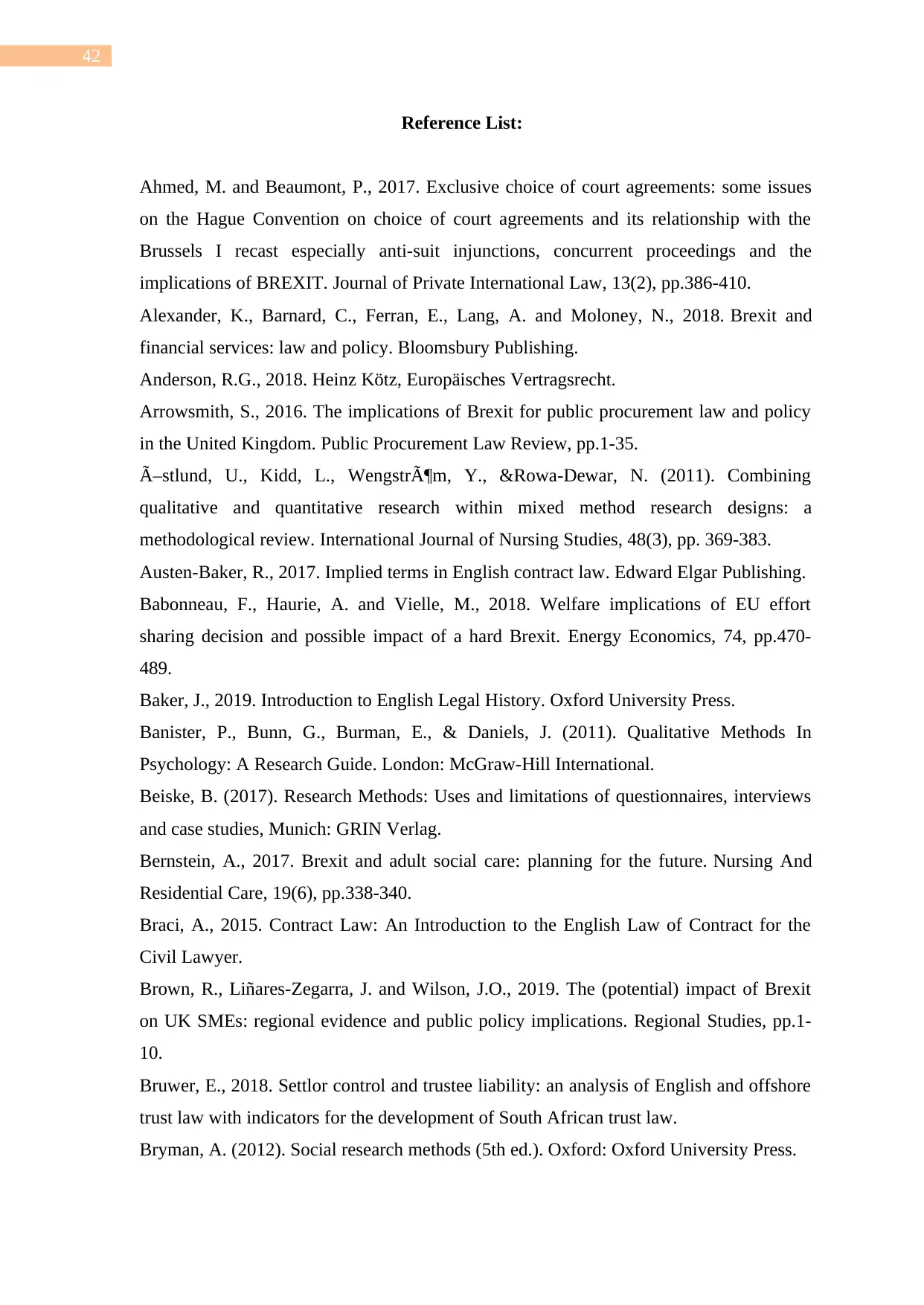
Reference List:
Ahmed, M. and Beaumont, P., 2017. Exclusive choice of court agreements: some issues
on the Hague Convention on choice of court agreements and its relationship with the
Brussels I recast especially anti-suit injunctions, concurrent proceedings and the
implications of BREXIT. Journal of Private International Law, 13(2), pp.386-410.
Alexander, K., Barnard, C., Ferran, E., Lang, A. and Moloney, N., 2018. Brexit and
financial services: law and policy. Bloomsbury Publishing.
Anderson, R.G., 2018. Heinz Kötz, Europäisches Vertragsrecht.
Arrowsmith, S., 2016. The implications of Brexit for public procurement law and policy
in the United Kingdom. Public Procurement Law Review, pp.1-35.
Östlund, U., Kidd, L., Wengström, Y., &Rowa-Dewar, N. (2011). Combining
qualitative and quantitative research within mixed method research designs: a
methodological review. International Journal of Nursing Studies, 48(3), pp. 369-383.
Austen-Baker, R., 2017. Implied terms in English contract law. Edward Elgar Publishing.
Babonneau, F., Haurie, A. and Vielle, M., 2018. Welfare implications of EU effort
sharing decision and possible impact of a hard Brexit. Energy Economics, 74, pp.470-
489.
Baker, J., 2019. Introduction to English Legal History. Oxford University Press.
Banister, P., Bunn, G., Burman, E., & Daniels, J. (2011). Qualitative Methods In
Psychology: A Research Guide. London: McGraw-Hill International.
Beiske, B. (2017). Research Methods: Uses and limitations of questionnaires, interviews
and case studies, Munich: GRIN Verlag.
Bernstein, A., 2017. Brexit and adult social care: planning for the future. Nursing And
Residential Care, 19(6), pp.338-340.
Braci, A., 2015. Contract Law: An Introduction to the English Law of Contract for the
Civil Lawyer.
Brown, R., Liñares-Zegarra, J. and Wilson, J.O., 2019. The (potential) impact of Brexit
on UK SMEs: regional evidence and public policy implications. Regional Studies, pp.1-
10.
Bruwer, E., 2018. Settlor control and trustee liability: an analysis of English and offshore
trust law with indicators for the development of South African trust law.
Bryman, A. (2012). Social research methods (5th ed.). Oxford: Oxford University Press.
⊘ This is a preview!⊘
Do you want full access?
Subscribe today to unlock all pages.

Trusted by 1+ million students worldwide
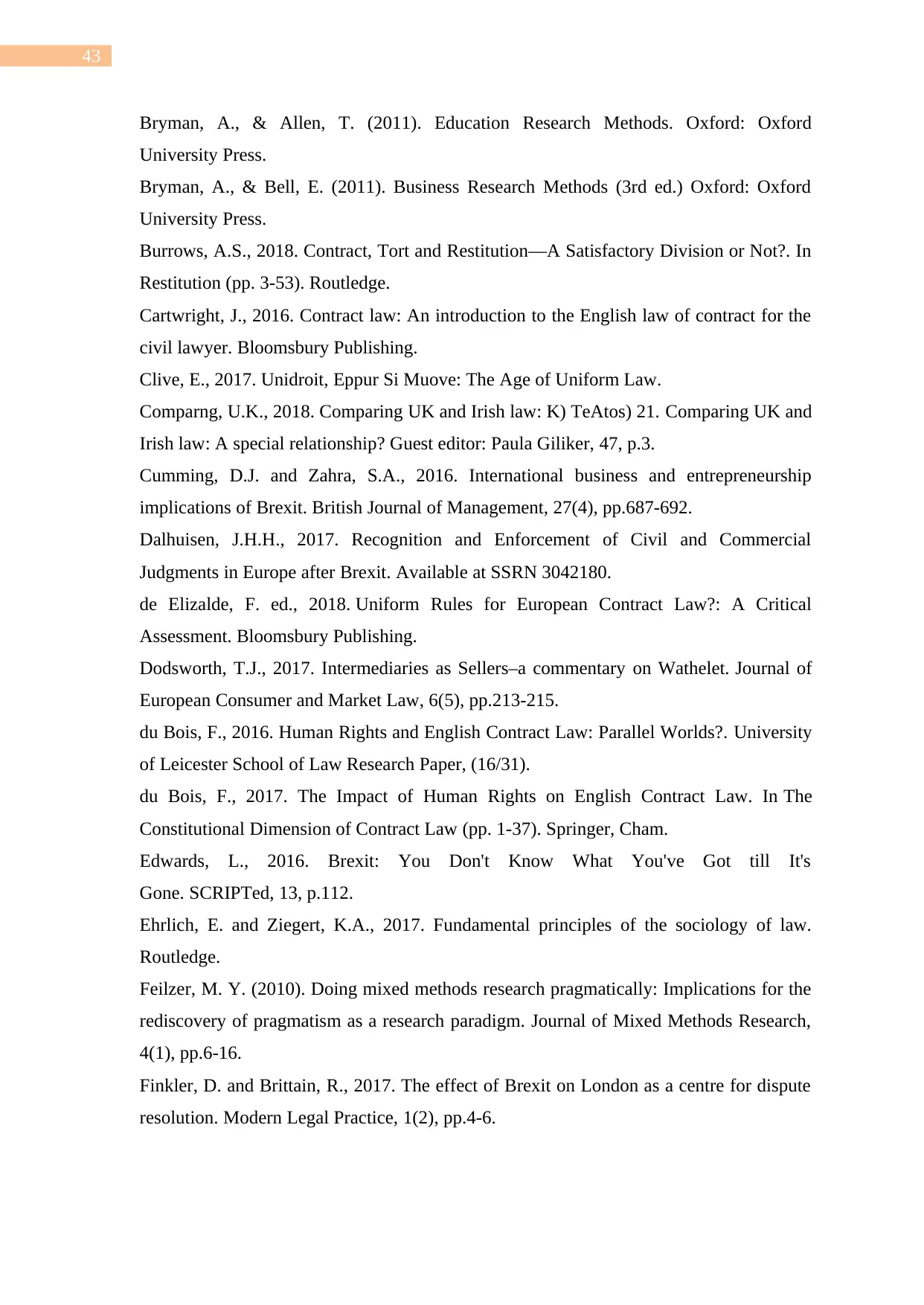
Bryman, A., & Allen, T. (2011). Education Research Methods. Oxford: Oxford
University Press.
Bryman, A., & Bell, E. (2011). Business Research Methods (3rd ed.) Oxford: Oxford
University Press.
Burrows, A.S., 2018. Contract, Tort and Restitution—A Satisfactory Division or Not?. In
Restitution (pp. 3-53). Routledge.
Cartwright, J., 2016. Contract law: An introduction to the English law of contract for the
civil lawyer. Bloomsbury Publishing.
Clive, E., 2017. Unidroit, Eppur Si Muove: The Age of Uniform Law.
Comparng, U.K., 2018. Comparing UK and Irish law: K) TeAtos) 21. Comparing UK and
Irish law: A special relationship? Guest editor: Paula Giliker, 47, p.3.
Cumming, D.J. and Zahra, S.A., 2016. International business and entrepreneurship
implications of Brexit. British Journal of Management, 27(4), pp.687-692.
Dalhuisen, J.H.H., 2017. Recognition and Enforcement of Civil and Commercial
Judgments in Europe after Brexit. Available at SSRN 3042180.
de Elizalde, F. ed., 2018. Uniform Rules for European Contract Law?: A Critical
Assessment. Bloomsbury Publishing.
Dodsworth, T.J., 2017. Intermediaries as Sellers–a commentary on Wathelet. Journal of
European Consumer and Market Law, 6(5), pp.213-215.
du Bois, F., 2016. Human Rights and English Contract Law: Parallel Worlds?. University
of Leicester School of Law Research Paper, (16/31).
du Bois, F., 2017. The Impact of Human Rights on English Contract Law. In The
Constitutional Dimension of Contract Law (pp. 1-37). Springer, Cham.
Edwards, L., 2016. Brexit: You Don't Know What You've Got till It's
Gone. SCRIPTed, 13, p.112.
Ehrlich, E. and Ziegert, K.A., 2017. Fundamental principles of the sociology of law.
Routledge.
Feilzer, M. Y. (2010). Doing mixed methods research pragmatically: Implications for the
rediscovery of pragmatism as a research paradigm. Journal of Mixed Methods Research,
4(1), pp.6-16.
Finkler, D. and Brittain, R., 2017. The effect of Brexit on London as a centre for dispute
resolution. Modern Legal Practice, 1(2), pp.4-6.
Paraphrase This Document
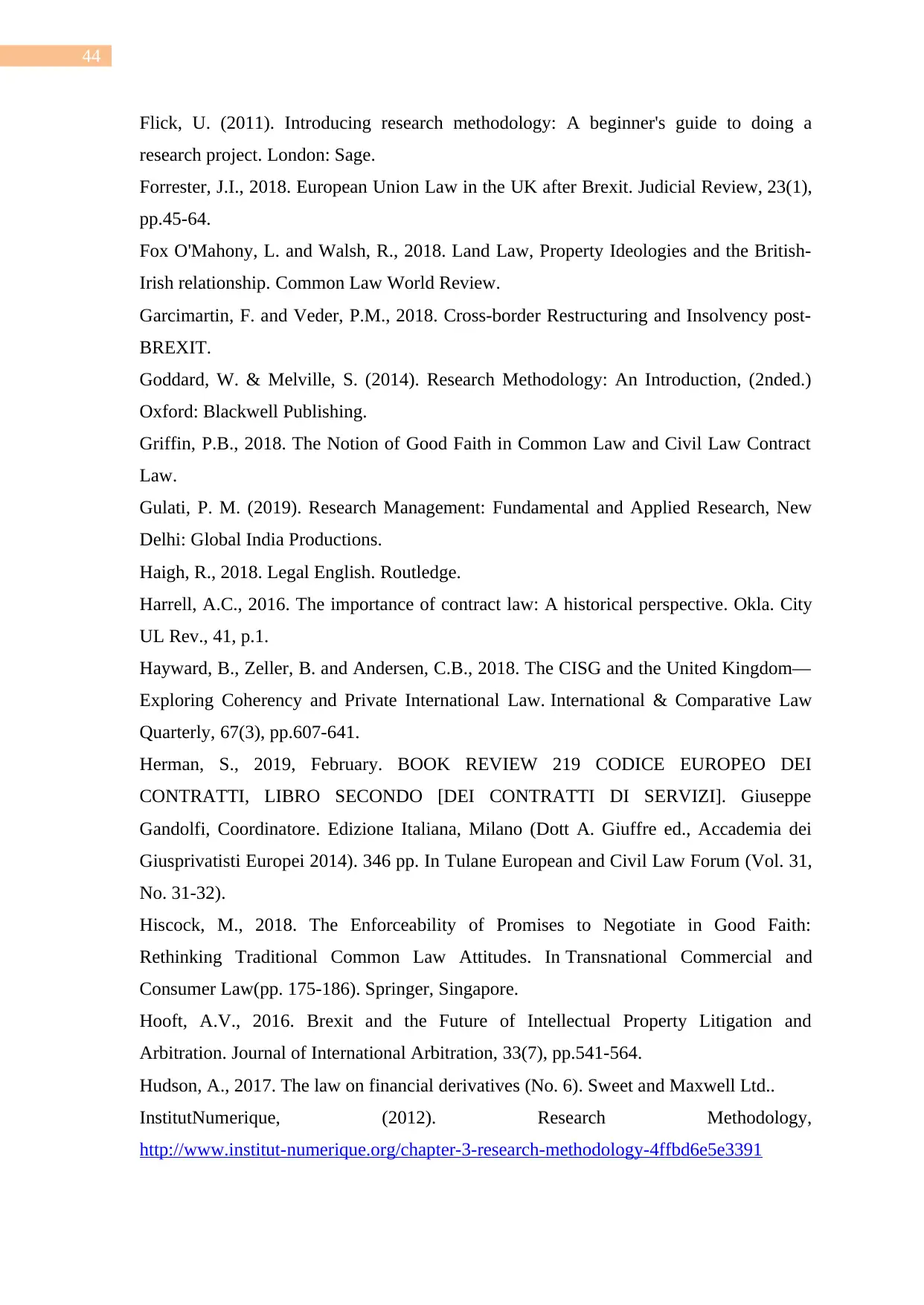
Flick, U. (2011). Introducing research methodology: A beginner's guide to doing a
research project. London: Sage.
Forrester, J.I., 2018. European Union Law in the UK after Brexit. Judicial Review, 23(1),
pp.45-64.
Fox O'Mahony, L. and Walsh, R., 2018. Land Law, Property Ideologies and the British-
Irish relationship. Common Law World Review.
Garcimartin, F. and Veder, P.M., 2018. Cross-border Restructuring and Insolvency post-
BREXIT.
Goddard, W. & Melville, S. (2014). Research Methodology: An Introduction, (2nded.)
Oxford: Blackwell Publishing.
Griffin, P.B., 2018. The Notion of Good Faith in Common Law and Civil Law Contract
Law.
Gulati, P. M. (2019). Research Management: Fundamental and Applied Research, New
Delhi: Global India Productions.
Haigh, R., 2018. Legal English. Routledge.
Harrell, A.C., 2016. The importance of contract law: A historical perspective. Okla. City
UL Rev., 41, p.1.
Hayward, B., Zeller, B. and Andersen, C.B., 2018. The CISG and the United Kingdom—
Exploring Coherency and Private International Law. International & Comparative Law
Quarterly, 67(3), pp.607-641.
Herman, S., 2019, February. BOOK REVIEW 219 CODICE EUROPEO DEI
CONTRATTI, LIBRO SECONDO [DEI CONTRATTI DI SERVIZI]. Giuseppe
Gandolfi, Coordinatore. Edizione Italiana, Milano (Dott A. Giuffre ed., Accademia dei
Giusprivatisti Europei 2014). 346 pp. In Tulane European and Civil Law Forum (Vol. 31,
No. 31-32).
Hiscock, M., 2018. The Enforceability of Promises to Negotiate in Good Faith:
Rethinking Traditional Common Law Attitudes. In Transnational Commercial and
Consumer Law(pp. 175-186). Springer, Singapore.
Hooft, A.V., 2016. Brexit and the Future of Intellectual Property Litigation and
Arbitration. Journal of International Arbitration, 33(7), pp.541-564.
Hudson, A., 2017. The law on financial derivatives (No. 6). Sweet and Maxwell Ltd..
InstitutNumerique, (2012). Research Methodology,
http://www.institut-numerique.org/chapter-3-research-methodology-4ffbd6e5e3391
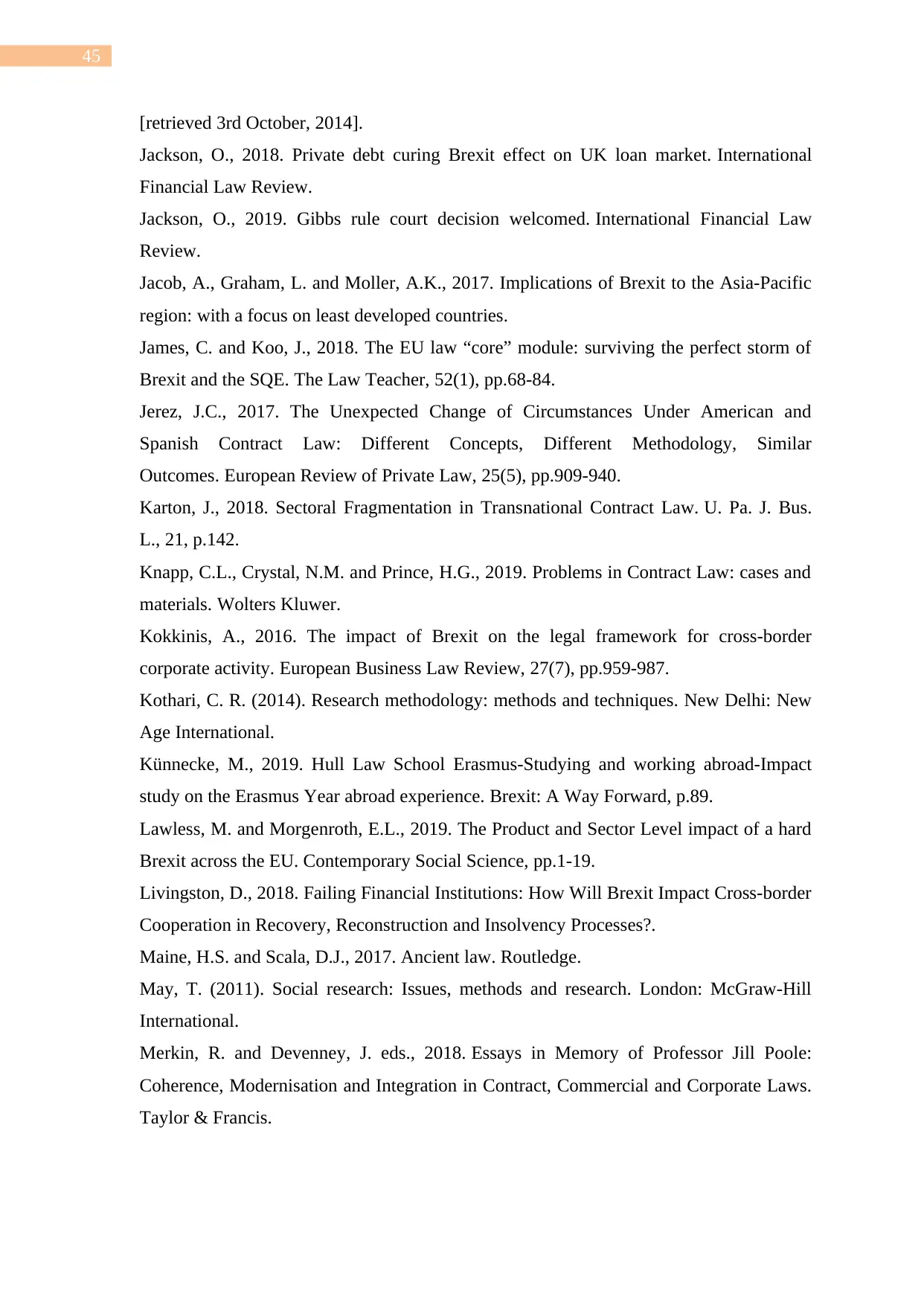
[retrieved 3rd October, 2014].
Jackson, O., 2018. Private debt curing Brexit effect on UK loan market. International
Financial Law Review.
Jackson, O., 2019. Gibbs rule court decision welcomed. International Financial Law
Review.
Jacob, A., Graham, L. and Moller, A.K., 2017. Implications of Brexit to the Asia-Pacific
region: with a focus on least developed countries.
James, C. and Koo, J., 2018. The EU law “core” module: surviving the perfect storm of
Brexit and the SQE. The Law Teacher, 52(1), pp.68-84.
Jerez, J.C., 2017. The Unexpected Change of Circumstances Under American and
Spanish Contract Law: Different Concepts, Different Methodology, Similar
Outcomes. European Review of Private Law, 25(5), pp.909-940.
Karton, J., 2018. Sectoral Fragmentation in Transnational Contract Law. U. Pa. J. Bus.
L., 21, p.142.
Knapp, C.L., Crystal, N.M. and Prince, H.G., 2019. Problems in Contract Law: cases and
materials. Wolters Kluwer.
Kokkinis, A., 2016. The impact of Brexit on the legal framework for cross-border
corporate activity. European Business Law Review, 27(7), pp.959-987.
Kothari, C. R. (2014). Research methodology: methods and techniques. New Delhi: New
Age International.
Künnecke, M., 2019. Hull Law School Erasmus-Studying and working abroad-Impact
study on the Erasmus Year abroad experience. Brexit: A Way Forward, p.89.
Lawless, M. and Morgenroth, E.L., 2019. The Product and Sector Level impact of a hard
Brexit across the EU. Contemporary Social Science, pp.1-19.
Livingston, D., 2018. Failing Financial Institutions: How Will Brexit Impact Cross-border
Cooperation in Recovery, Reconstruction and Insolvency Processes?.
Maine, H.S. and Scala, D.J., 2017. Ancient law. Routledge.
May, T. (2011). Social research: Issues, methods and research. London: McGraw-Hill
International.
Merkin, R. and Devenney, J. eds., 2018. Essays in Memory of Professor Jill Poole:
Coherence, Modernisation and Integration in Contract, Commercial and Corporate Laws.
Taylor & Francis.
⊘ This is a preview!⊘
Do you want full access?
Subscribe today to unlock all pages.

Trusted by 1+ million students worldwide
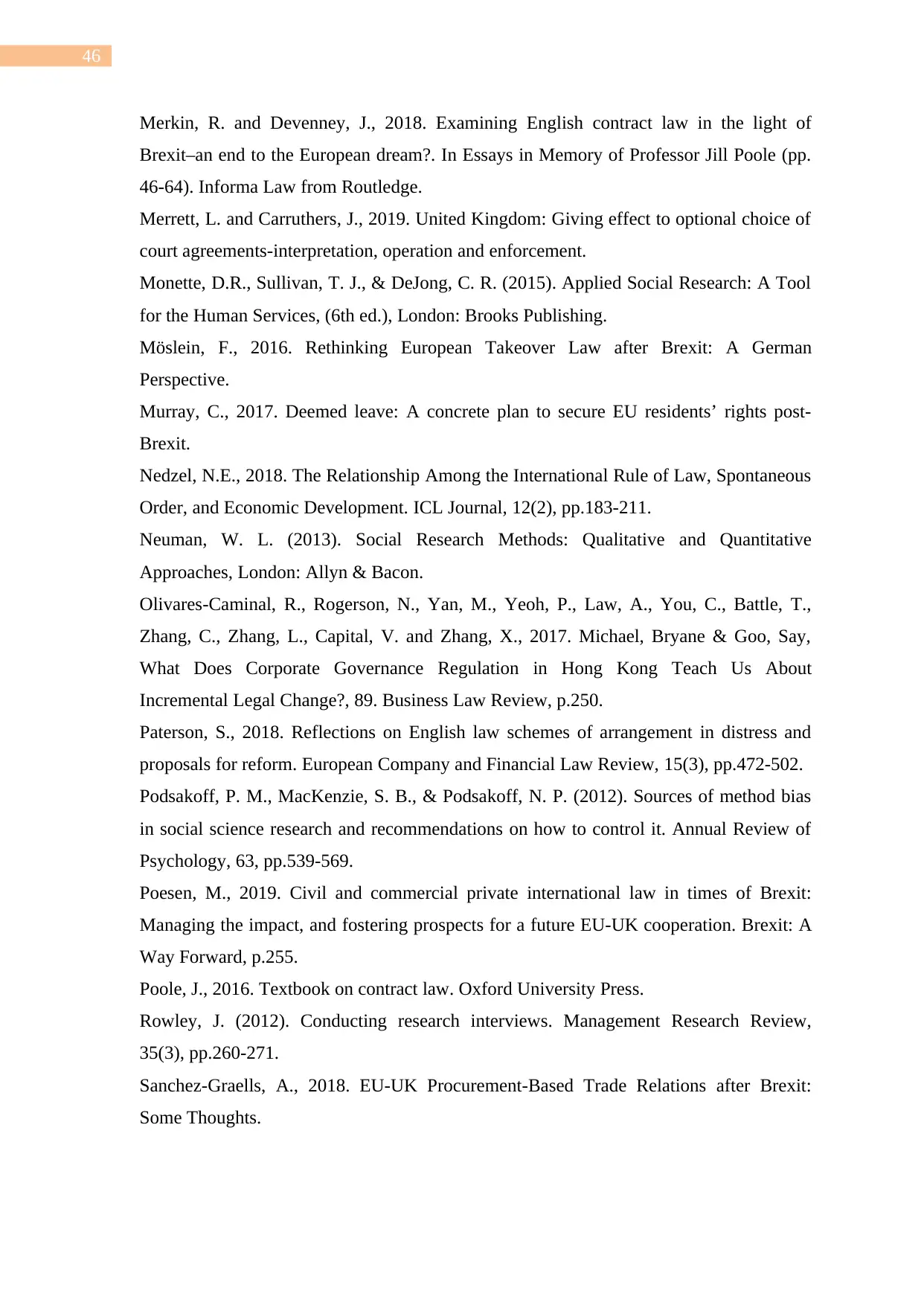
Merkin, R. and Devenney, J., 2018. Examining English contract law in the light of
Brexit–an end to the European dream?. In Essays in Memory of Professor Jill Poole (pp.
46-64). Informa Law from Routledge.
Merrett, L. and Carruthers, J., 2019. United Kingdom: Giving effect to optional choice of
court agreements-interpretation, operation and enforcement.
Monette, D.R., Sullivan, T. J., & DeJong, C. R. (2015). Applied Social Research: A Tool
for the Human Services, (6th ed.), London: Brooks Publishing.
Möslein, F., 2016. Rethinking European Takeover Law after Brexit: A German
Perspective.
Murray, C., 2017. Deemed leave: A concrete plan to secure EU residents’ rights post-
Brexit.
Nedzel, N.E., 2018. The Relationship Among the International Rule of Law, Spontaneous
Order, and Economic Development. ICL Journal, 12(2), pp.183-211.
Neuman, W. L. (2013). Social Research Methods: Qualitative and Quantitative
Approaches, London: Allyn & Bacon.
Olivares-Caminal, R., Rogerson, N., Yan, M., Yeoh, P., Law, A., You, C., Battle, T.,
Zhang, C., Zhang, L., Capital, V. and Zhang, X., 2017. Michael, Bryane & Goo, Say,
What Does Corporate Governance Regulation in Hong Kong Teach Us About
Incremental Legal Change?, 89. Business Law Review, p.250.
Paterson, S., 2018. Reflections on English law schemes of arrangement in distress and
proposals for reform. European Company and Financial Law Review, 15(3), pp.472-502.
Podsakoff, P. M., MacKenzie, S. B., & Podsakoff, N. P. (2012). Sources of method bias
in social science research and recommendations on how to control it. Annual Review of
Psychology, 63, pp.539-569.
Poesen, M., 2019. Civil and commercial private international law in times of Brexit:
Managing the impact, and fostering prospects for a future EU-UK cooperation. Brexit: A
Way Forward, p.255.
Poole, J., 2016. Textbook on contract law. Oxford University Press.
Rowley, J. (2012). Conducting research interviews. Management Research Review,
35(3), pp.260-271.
Sanchez-Graells, A., 2018. EU-UK Procurement-Based Trade Relations after Brexit:
Some Thoughts.
Paraphrase This Document
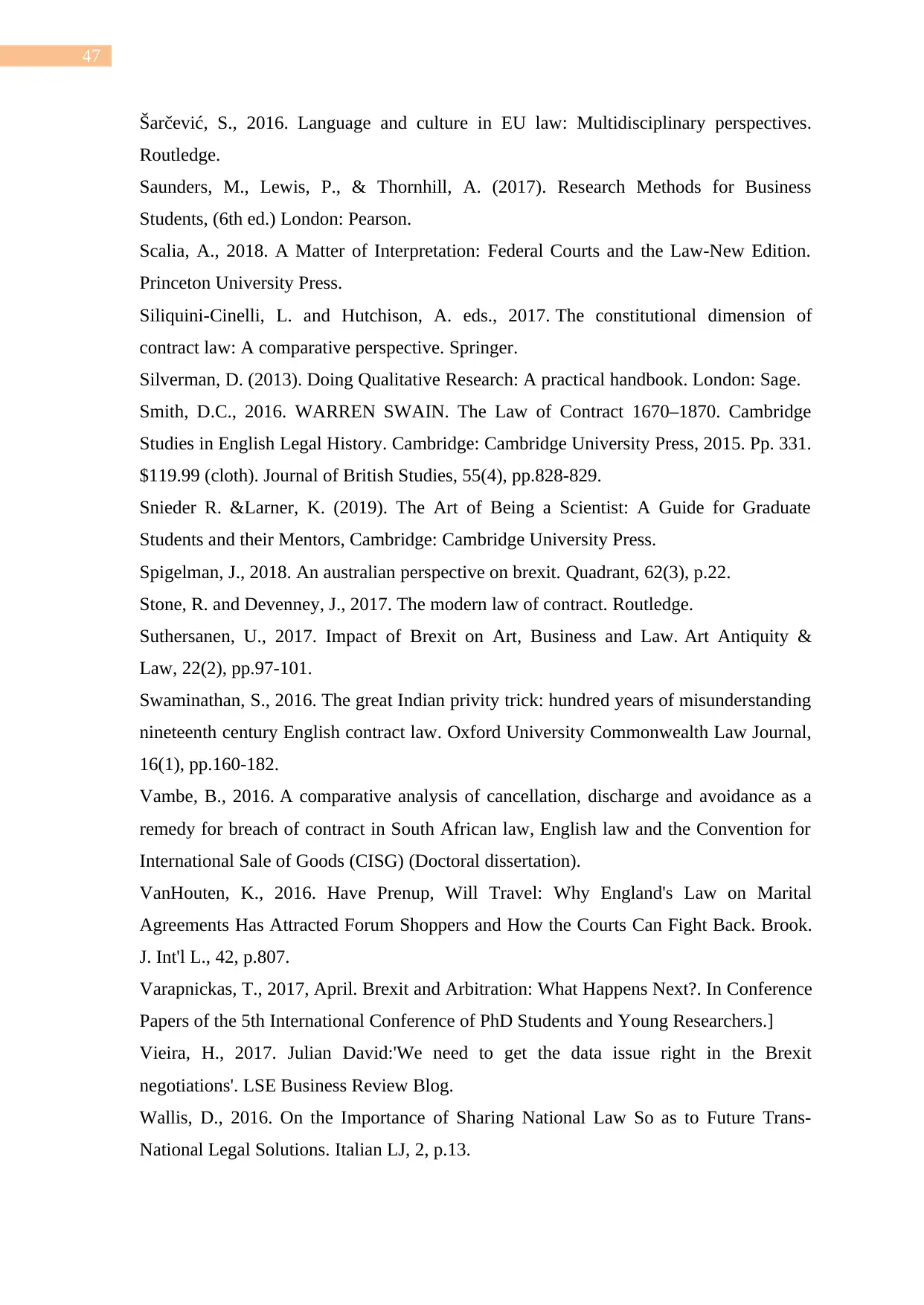
Šarčević, S., 2016. Language and culture in EU law: Multidisciplinary perspectives.
Routledge.
Saunders, M., Lewis, P., & Thornhill, A. (2017). Research Methods for Business
Students, (6th ed.) London: Pearson.
Scalia, A., 2018. A Matter of Interpretation: Federal Courts and the Law-New Edition.
Princeton University Press.
Siliquini-Cinelli, L. and Hutchison, A. eds., 2017. The constitutional dimension of
contract law: A comparative perspective. Springer.
Silverman, D. (2013). Doing Qualitative Research: A practical handbook. London: Sage.
Smith, D.C., 2016. WARREN SWAIN. The Law of Contract 1670–1870. Cambridge
Studies in English Legal History. Cambridge: Cambridge University Press, 2015. Pp. 331.
$119.99 (cloth). Journal of British Studies, 55(4), pp.828-829.
Snieder R. &Larner, K. (2019). The Art of Being a Scientist: A Guide for Graduate
Students and their Mentors, Cambridge: Cambridge University Press.
Spigelman, J., 2018. An australian perspective on brexit. Quadrant, 62(3), p.22.
Stone, R. and Devenney, J., 2017. The modern law of contract. Routledge.
Suthersanen, U., 2017. Impact of Brexit on Art, Business and Law. Art Antiquity &
Law, 22(2), pp.97-101.
Swaminathan, S., 2016. The great Indian privity trick: hundred years of misunderstanding
nineteenth century English contract law. Oxford University Commonwealth Law Journal,
16(1), pp.160-182.
Vambe, B., 2016. A comparative analysis of cancellation, discharge and avoidance as a
remedy for breach of contract in South African law, English law and the Convention for
International Sale of Goods (CISG) (Doctoral dissertation).
VanHouten, K., 2016. Have Prenup, Will Travel: Why England's Law on Marital
Agreements Has Attracted Forum Shoppers and How the Courts Can Fight Back. Brook.
J. Int'l L., 42, p.807.
Varapnickas, T., 2017, April. Brexit and Arbitration: What Happens Next?. In Conference
Papers of the 5th International Conference of PhD Students and Young Researchers.]
Vieira, H., 2017. Julian David:'We need to get the data issue right in the Brexit
negotiations'. LSE Business Review Blog.
Wallis, D., 2016. On the Importance of Sharing National Law So as to Future Trans-
National Legal Solutions. Italian LJ, 2, p.13.

Walulik, J., 2019. Brexit and English Law. Routledge, Taylor & Francis Group.
Wiles, R., Crow, G., & Pain, H. (2011). Innovation in qualitative research methods: a
narrative review. Qualitative Research, 11(5), pp.587-604.
Yip, M. and Goh, Y., 2017. Convergence between Australian common law and English
common law: The rule against penalties in the age of freedom of contract. Common Law
World Review, 46(1), pp.61-68.
Zahn, R., 2018. The Impact of Brexit on Employment Law in Scotland.
Zetzsche, D.A. and Lehmann, M., 2016. The Brexit's Impact on Commercial Relations
between the EU and the UK. European Business Law Review.
⊘ This is a preview!⊘
Do you want full access?
Subscribe today to unlock all pages.

Trusted by 1+ million students worldwide
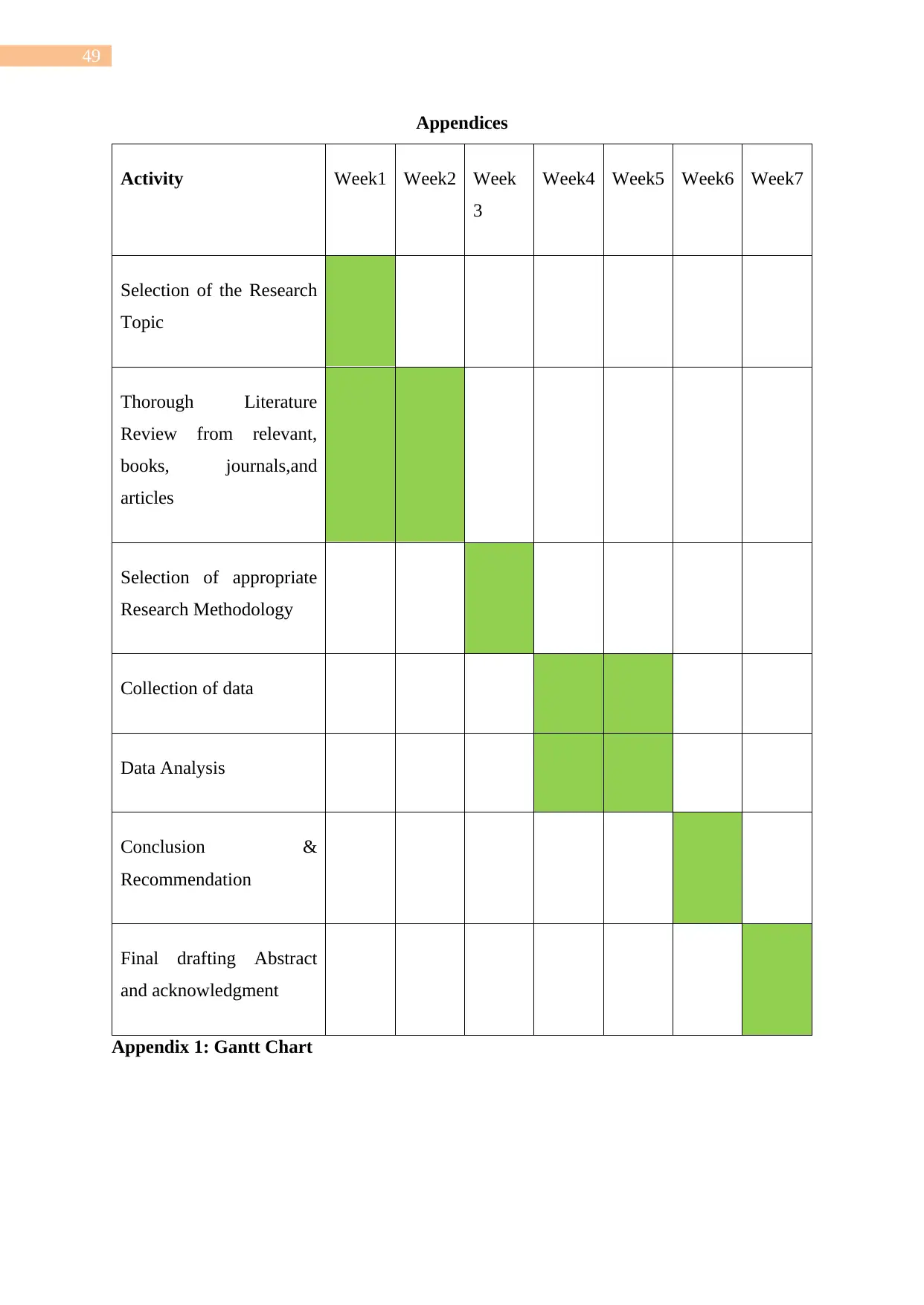
Appendices
Activity Week1 Week2 Week
3
Week4 Week5 Week6 Week7
Selection of the Research
Topic
Thorough Literature
Review from relevant,
books, journals,and
articles
Selection of appropriate
Research Methodology
Collection of data
Data Analysis
Conclusion &
Recommendation
Final drafting Abstract
and acknowledgment
Appendix 1: Gantt Chart
Paraphrase This Document

Appendix 5: Ethics Form
WILL YOUR RESEARCH: YES NO
1Involve gathering or preparing non-living biological samples not held already
in
2Involve scarce, vulnerable or protected species, habitats or sites?
3Involve invertebrates (other than cephalopods or decapod crustaceans)?
4Manipulate the environment, including introducing new species or destructive
collecting/harvesting?
5Include work on live decapod crustaceans, cephalopods or vertebrates? (If YES
please answer the following questions 6-12. If NO go to Question 13).
6Include observation of any free-living or captive animals?
7Risk causing pain, suffering, psychological or physical harm to an animal?
8Involve removal of biological material directly from a live animal?
9Involve manipulating an animal’s environment for the explicit purpose of
your study?
1
0
Involve a) the breeding of animals and/or b) animalsthat are either pregnant or
raising young?
1
1
Involve manipulation of an animal’s diet or drinking water?
1Involve human participants?
1
3
Create a risk that individuals and/or organisations could be identified in the
outputs?
1
4
Involve participants whose responses could be influenced by your relationship with
them or by any perceived, or real, conflicts of interest?1
5
Involve the co-operation of a ‘gatekeeper’ to gain access to participants (for
example, a pet owner or zoo, a company manager or a head teacher)?
1Offer financial or other forms of incentives to participants?
1
7
Involve the possibility that any incidental health issues relating to participants be
identified?1Involve the discussion of topics that participants may find distressing?
1Take place outside of the country where you work and/or are enrolled to study?
2
0
Cause a negative impact on the environment (over and above that of normal daily
activity)?2
1
Involve genetic modification of animal or human tissue, or use of genetically

modified organisms at Class One activities?1.
22 Involve genetic modification of animal or human tissue, or use of
genetically modified organisms above Class One activities?2.23 Collect, use or store any human tissue or DNA (including but not limited to,
serum, plasma, organs, saliva, urine, hairs and nails)?324 Involve medical research with humans, including clinical trials or medical devices?
25 Involve the administration of drugs, placebos or other substances (e.g. food,
26 Cause (or have the potential to cause) pain, physical or psychological harm or
negative consequences to humans?
27 Involve the collection of data without the consent of participants, or other forms
of deception?28 Involve interventions with people aged 16 years and under?
29 Relate to military sites, personnel, equipment, or the defence industry?
30 Risk damage/disturbance to culturally, spiritually or historically
significant artefacts/places, or human remains?31 Contain research methodologies you, or members of your team, require training to
carry out?32 Involve access to, or use (including internet use) of material covered by the Counter
Terrorism and Security Act (2015), or the Terrorism Act (2006), or which could be
classified as security sensitive?433 Involve you or participants in
a) activities which may be illegal and/or
b) the observation, handling or storage (including export) of information or
material which may be regarded as illegal?34 Require ethical approval from any recognised external agencies? e.g. NHS, Social
Care, Ministry of Justice, Ministry of Defence. Please refer to the Question Specific
Advice for the Stage 1 Research Ethics Application Form (Animals and Habitats)
35 Involve individuals aged 16 years of age and over who lack ‘capacity to consent’
36 Pose any ethical issue not covered elsewhere in this checklist?
1
⊘ This is a preview!⊘
Do you want full access?
Subscribe today to unlock all pages.

Trusted by 1+ million students worldwide
Related Documents
Your All-in-One AI-Powered Toolkit for Academic Success.
+13062052269
info@desklib.com
Available 24*7 on WhatsApp / Email
![[object Object]](/_next/static/media/star-bottom.7253800d.svg)
© 2024 | Zucol Services PVT LTD | All rights reserved.





